Prologue: Legacy and Oath
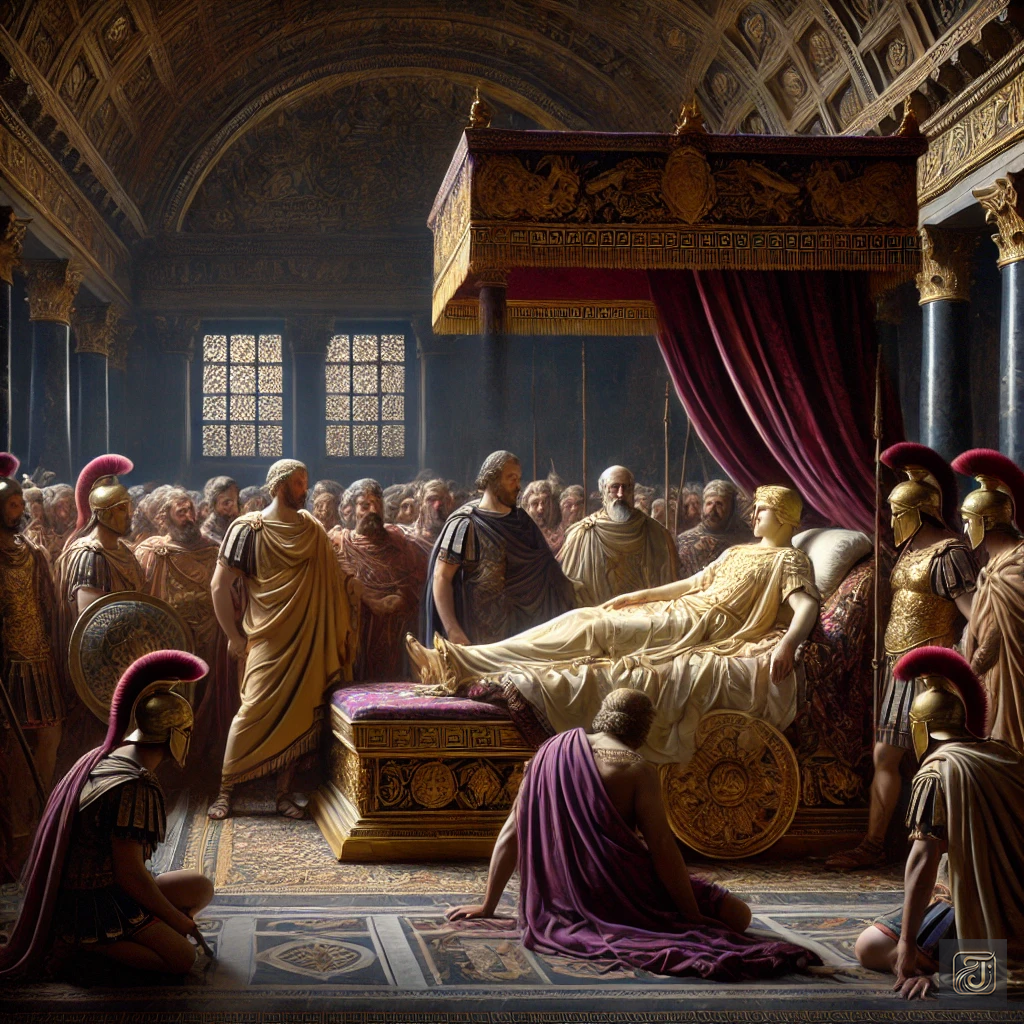
In 323 BCE, the great conqueror Alexander the Great took his final breath.
As he lay on his deathbed, having built a vast empire, he spoke these words:

Alexander the Great:
“Let the strongest claim the throne!!”
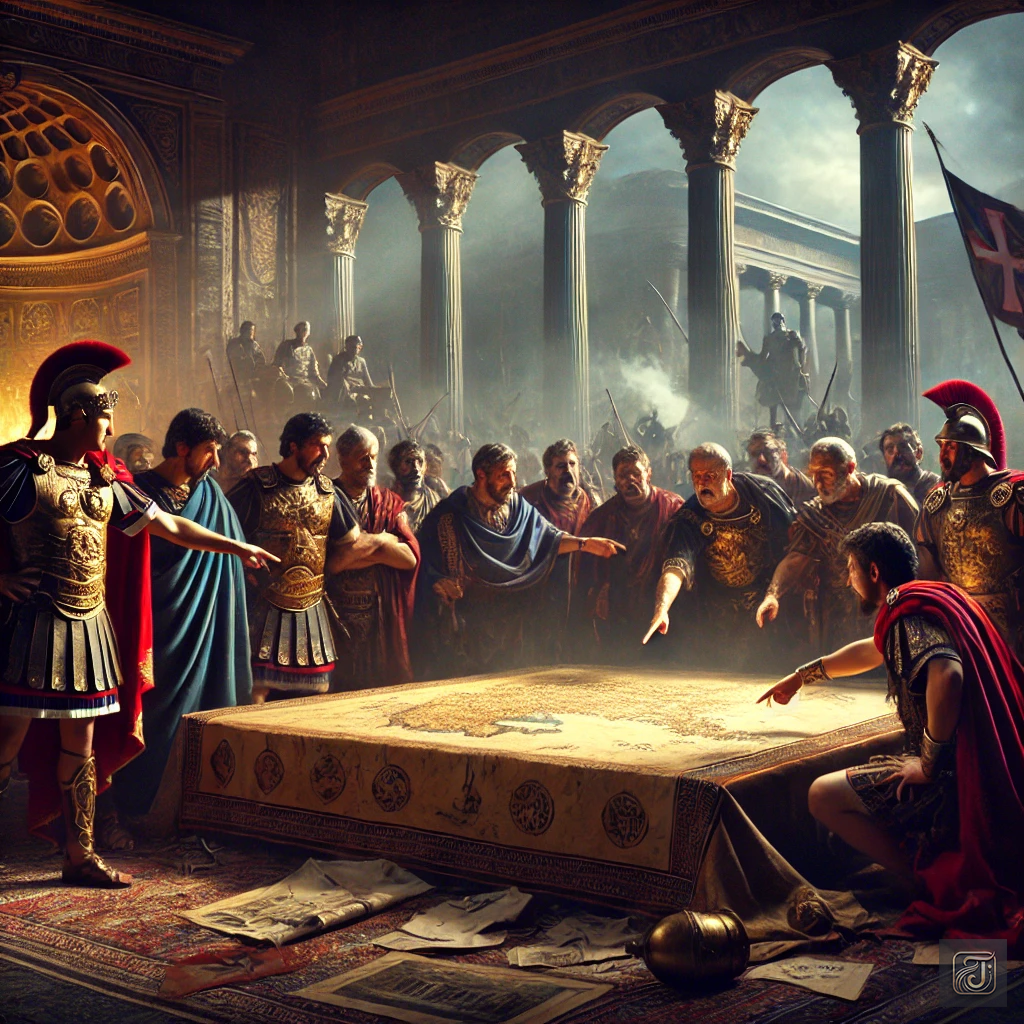
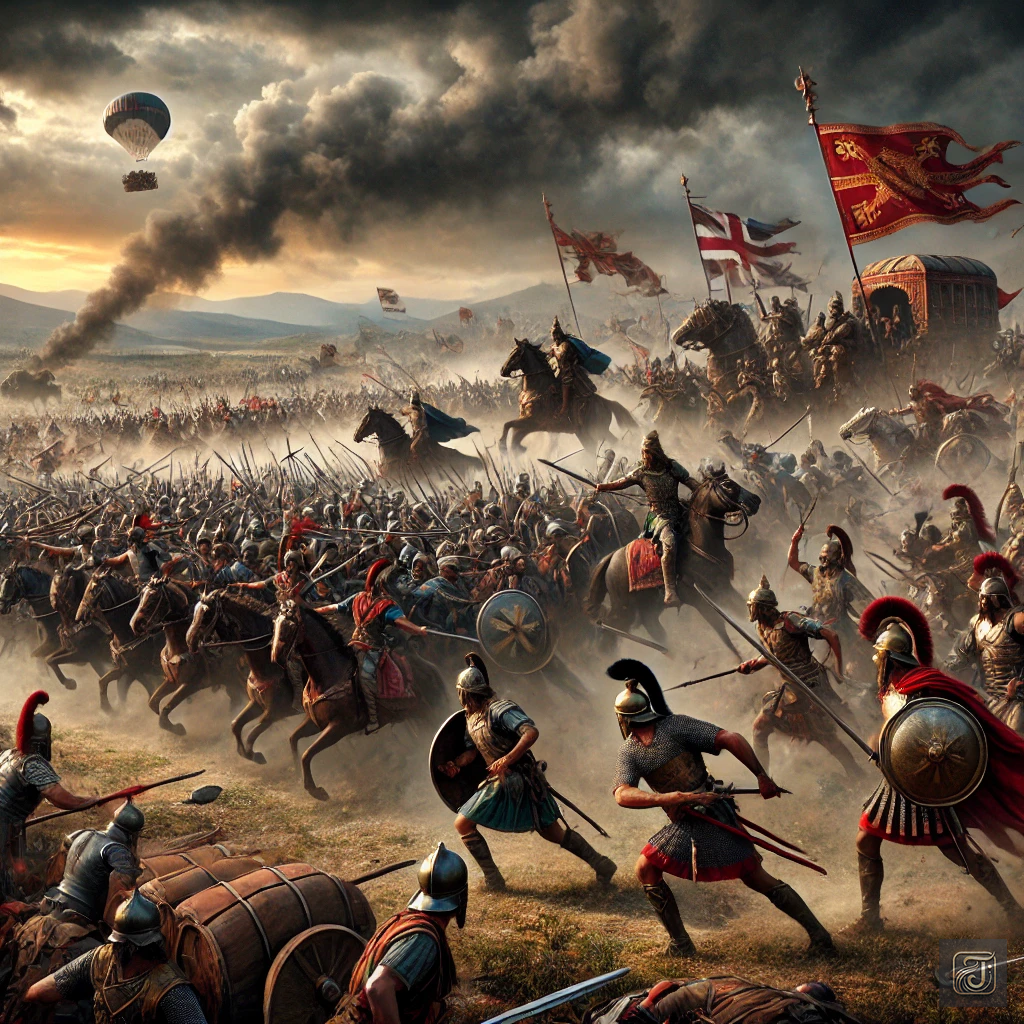
This final testament sparked a civil war among those who deemed themselves the strongest contenders for the throne.
As a result, the vast empire he had built was fractured and divided.
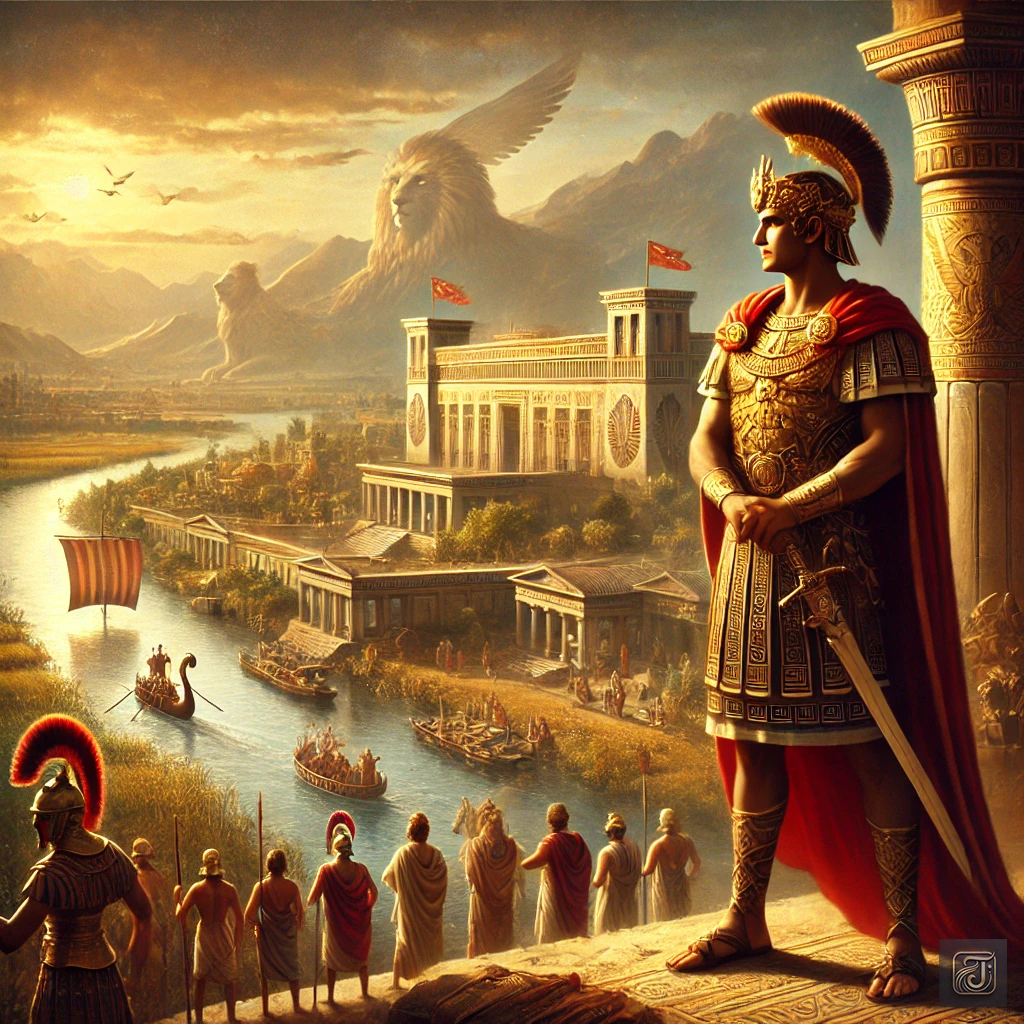
Egypt, once a part of the vast empire, fell into the hands of General Ptolemy, who established his own dynasty.
Harnessing the blessings of the Nile, he built a prosperous kingdom, but its independence would soon be threatened by the looming shadow of Rome.

In 69 BCE, Cleopatra was born into the Ptolemaic dynasty, and from a young age, she resolved to bear the future of Egypt upon her shoulders.

Ptolemy XII:
“As long as the Nile continues to bless this land, Egypt will endure.”
Cleopatra VII:
“But, Father, it is we who must protect it, isn’t it?”
Ptolemy XII:
“Indeed. As royalty, we have a duty to protect it.”
In her eyes, the first traces of a ruler’s resolve had already begun to shine.

Cleopatra VII:
“I will protect this land, no matter how harsh the path may be.”
Her mission would soon be tested by the tides of history and the relentless pressure of Rome.This is the story of Cleopatra, the last queen of Egypt, who fought tirelessly to preserve her homeland.
Historical Background
The Ptolemaic dynasty was a Greek ruling house established in Egypt after the death of Alexander the Great.
It was founded by Ptolemy I, one of Alexander’s trusted generals, who took control of Egypt and declared himself king.
For nearly 300 years, the dynasty flourished by harnessing the wealth of the Nile, fostering a unique blend of Greek and Egyptian cultures. However, in its later years, the kingdom found itself increasingly overshadowed by the rising power of the Roman Empire.
About the Ptolemaic Dynasty
The Ptolemaic dynasty ruled Egypt from 305 BCE to 30 BCE.
As heirs to Alexander’s legacy, they established a kingdom where Greek and Egyptian traditions intertwined, creating a civilization that was both intellectually rich and politically complex.
However, as Rome expanded its influence, the dynasty struggled to maintain its independence, ultimately leading to its downfall.
Chapter 1: The Oath of the Nile

Cleopatra VII:
“Father, I will protect Egypt, no matter what hardships may come.”
Ptolemy XII:
“Cleopatra, remember this,”
“Egypt is a gift from the Nile, but only a ruler with wisdom and strength can truly protect it.”
Young Cleopatra stood by the banks of the Nile, gazing up at her father, Ptolemy XII, as she made her solemn vow.
In her eyes, beyond her years, burned a determination unshaken by time.
Cleopatra nodded silently, her resolve growing stronger with every word.

Young Cleopatra made her vow to her father, Ptolemy XII, by the banks of the Nile, unaware that a quiet observer stood nearby.
Among those present was Calixa, a newly appointed handmaiden-in-training.Born the daughter of a humble fisherman, she had recently been brought into the royal palace—chosen not for her lineage, but for her keen intellect and sharp wit.

whispers:
“Can a girl from such a poor family really survive in the royal court?”
Cold gazes and whispers surrounded her, but Calixa refused to be discouraged.
The first time she was given the chance to serve Cleopatra, she was struck by the young princess’s piercing gaze—one that held the weight of a future queen, even in childhood.

Calixa’s thoughts:
“She is not just a princess…”
“She is the one who will bear the weight of this nation.”
From that moment on, Calixa vowed to serve Cleopatra with unwavering devotion.
Chapter 2: A Marriage of Convenience
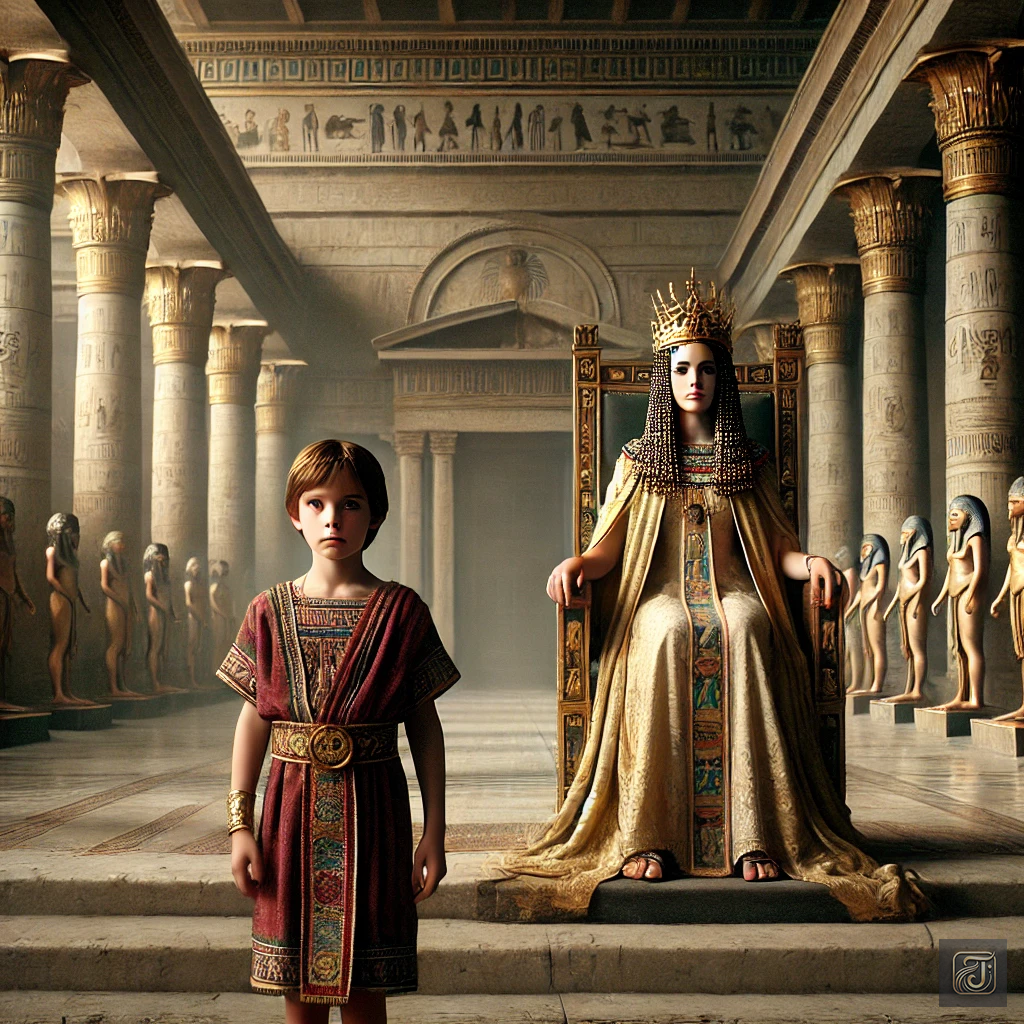
Ten years later, Ptolemy XII passed away.
According to his will, the young Cleopatra was named co-ruler alongside her younger brother, Ptolemy XIII.
At only ten years old, Ptolemy XIII ascended the throne—too young to rule alone, yet holding a title that would shape Egypt’s fate.

A few days later, a ceremonial wedding was held within the palace.
In Egypt, it was common for siblings to marry in order to secure the legitimacy of the dynasty, ensuring the continuation of royal rule.
However, for Cleopatra, it was nothing more than a political formality—a ritual meant to affirm her claim to the throne.
And to her, it was an unbearable humiliation.
On the night of the ceremony, she whispered softly to her handmaiden, Calixa.

Cleopatra VII:
“Of course, I never wanted this marriage.”
“But I have accepted it.”
“For the future of Egypt.”
“This does not define my fate.”
Calixa:
“My Queen, may you never forget those words.”
Calixa surprised yet understanding, nodded and spoke softly.
As Cleopatra gazed out at the Nile, she reaffirmed her own resolve.

Cleopatra VII:
“I will protect this land, no matter the cost.”
Chapter 3: Struggle Within the Palace

However, tensions with her younger brother escalated, plunging the royal court into turmoil.
It all began the day after their father, Ptolemy XII’s funeral, during a council meeting within the palace.
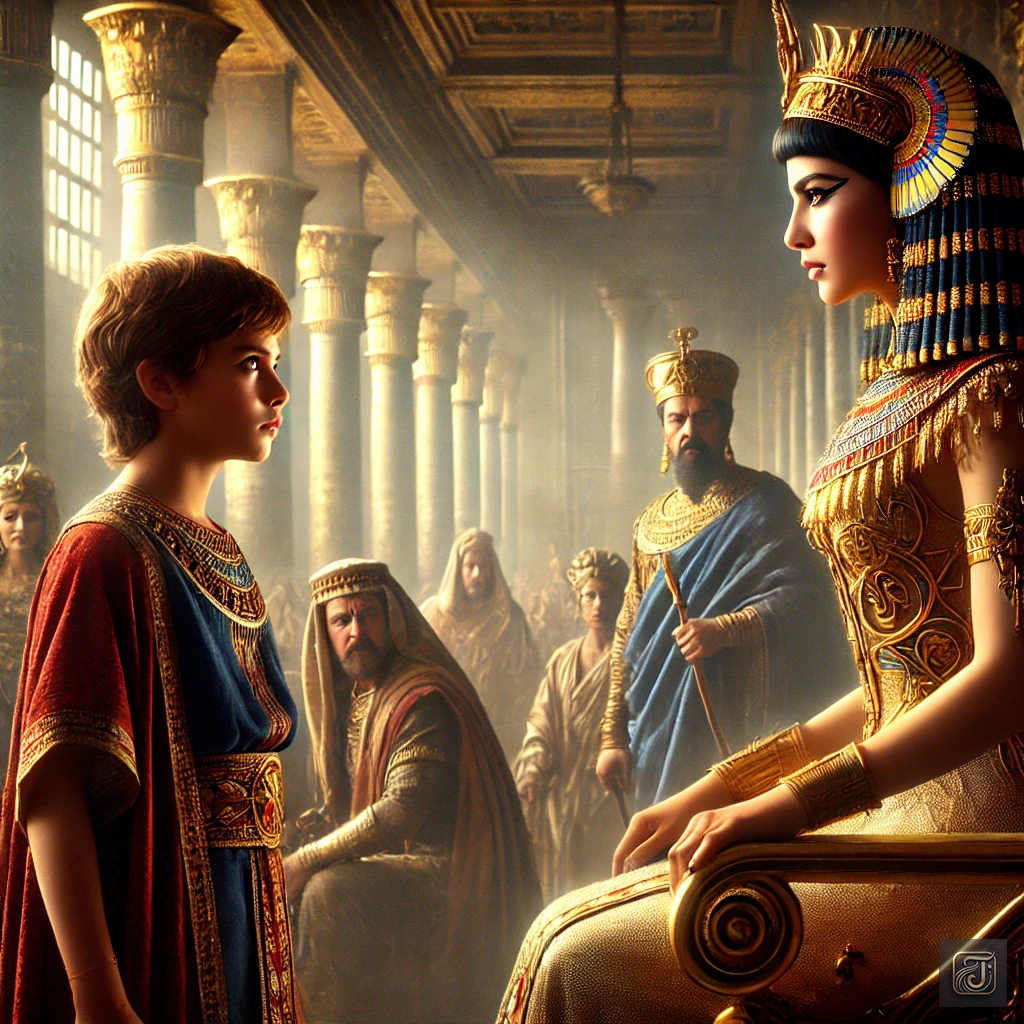
Ptolemy XIII:
“Cleopatra, the division of power has already been decided.”
“Your role is simply to remain as queen.”
Ptolemy XIII spoke coldly, his young voice laced with authority.
Cleopatra held his gaze, unwavering.
Cleopatra VII:
“Are you telling me to remain silent?”
“In a place where the future of this nation is being decided?”
Her voice was calm, yet it carried the weight of unshakable determination.
Ptolemy XIII:
“It is a man’s duty to protect the kingdom.”
“Your role is merely to support me.”
Taking a deep breath, Cleopatra responded with unwavering composure.
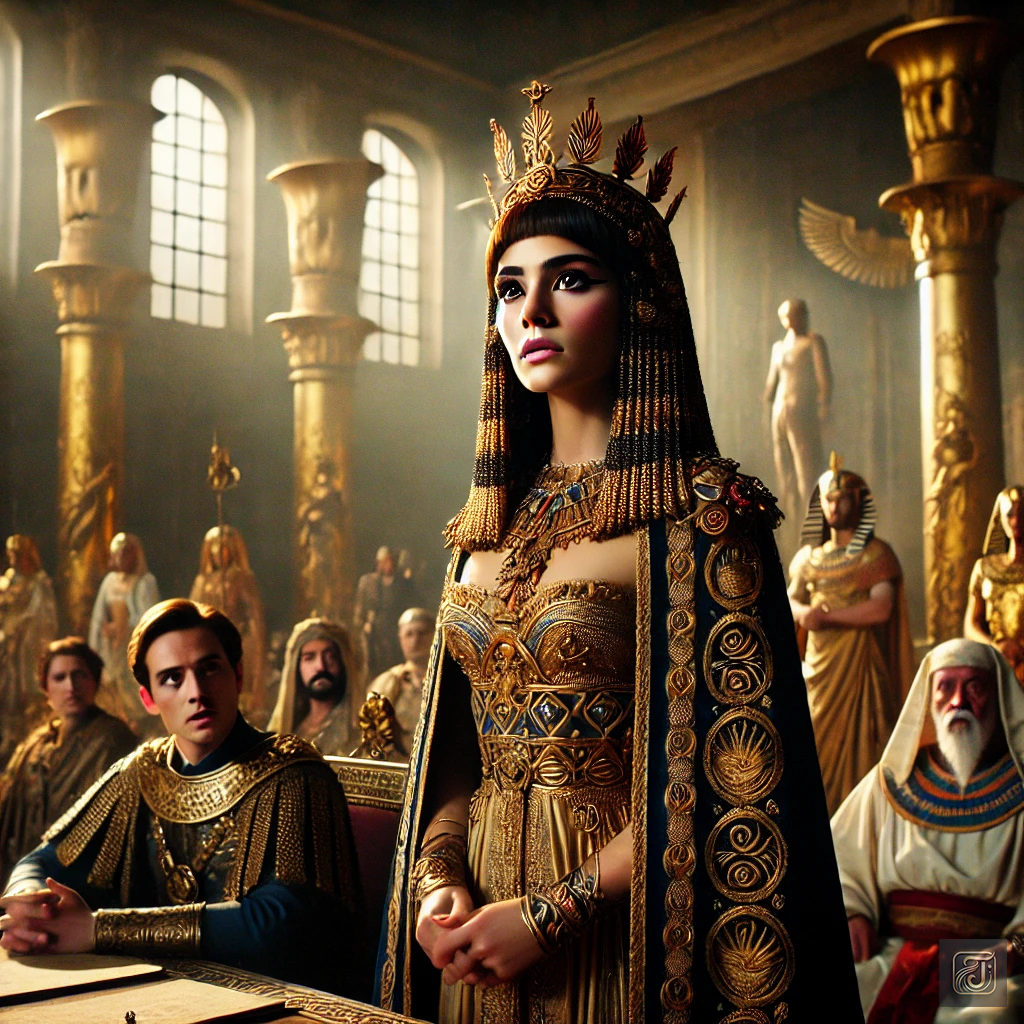
Cleopatra VII:
“Egypt does not survive on the blessings of the Nile alone.”
“It requires wisdom and decisive action.”
“And I am the one who can provide that.”
Chapter 4: The Humiliation of Exile

Ptolemy XIII:
“Cleopatra, ruling this kingdom is my duty.”
“Leave this place and stay out of my way.”
With those cold words from Ptolemy XIII, Cleopatra was cast out of the royal palace.

Cleopatra VII:
“The Nile would never abandon me.”
“I will return—no matter what.”

On the day of her exile, Cleopatra walked through the marble corridors of the palace, each step echoing with the weight of her fury.
Behind her, courtiers loyal to her brother exchanged mocking whispers.
Courtiers loyal:
“Did she truly believe she was the ruler of Egypt?”
“Her days of playing queen end here.”

Calixa:
“Your Majesty, pay them no mind.”
But Cleopatra stopped in her tracks, turning back with a piercing gaze.
Her voice was cold and unwavering as she spoke.

Cleopatra VII:
“Remember this.”
“When I return to this palace, you will bow before me.”
“Never forget these words.”
On the day Cleopatra was cast out of the palace, Calixa silently shed tears.For her, witnessing the humiliation of the queen she had served since childhood was unbearable.

Calixa:
“Your Majesty, how can you endure this without protest?”
Cleopatra VII:
“Calixa, do not worry.”
“This humiliation will be repaid in full.”
“Wait for that day.”
Calixa nodded slightly, watching Cleopatra’s resolute figure as she walked ahead.
As they reached the palace gates, Cleopatra turned back one last time.
The grand palace of Alexandria stood silent as if rejecting her presence—its once welcoming halls now cold and unyielding.

Cleopatra VII:
“I will never forget this humiliation.”
With those words echoing in her heart, she turned away and left Egypt behind.
Chapter 5: The Assembling of Forces

In exile in Syria, Cleopatra began planning to raise an army.
Seated alone in her tent, she recalled the humiliation of her banishment from Alexandria.
Cleopatra VII:
“Calixa, bring me the map.”
Her handmaiden hurriedly spread out the map before her.
Cleopatra traced her finger along the Nile’s course, her mind already set on reclaiming her throne.
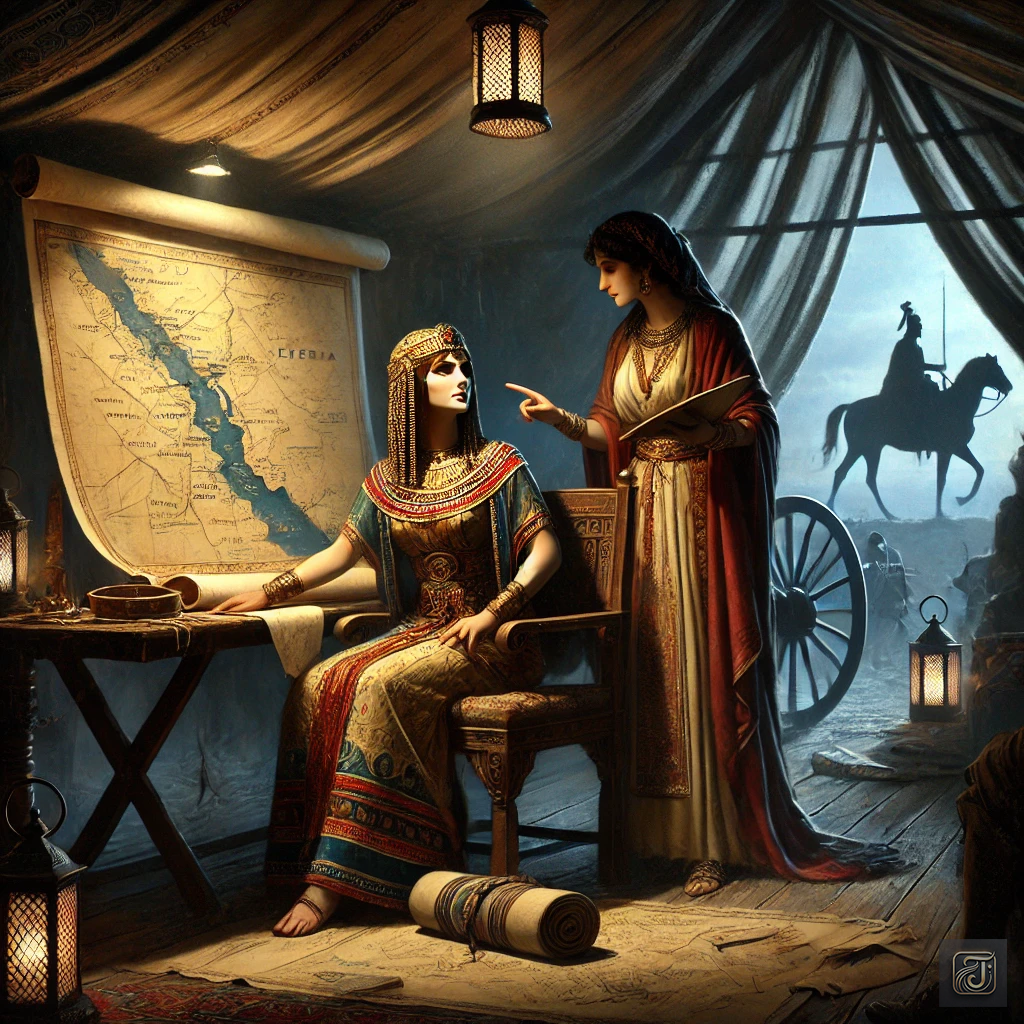
Cleopatra VII:
“Here.”
“This route will lead us back to Alexandria.”

Calixa:
“Your Majesty, isn’t that too dangerous?”
“Ptolemy XIII’s forces may be lying in wait…”
Cleopatra VII:
“I know, But this is the only way to reclaim Egypt.”
Her determined gaze met Calixa’s, silencing any further doubt.
Shortly after, she summoned her military commanders.
Together, they devised their strategy and rallied the soldiers, preparing them for the battle that would decide Egypt’s future.
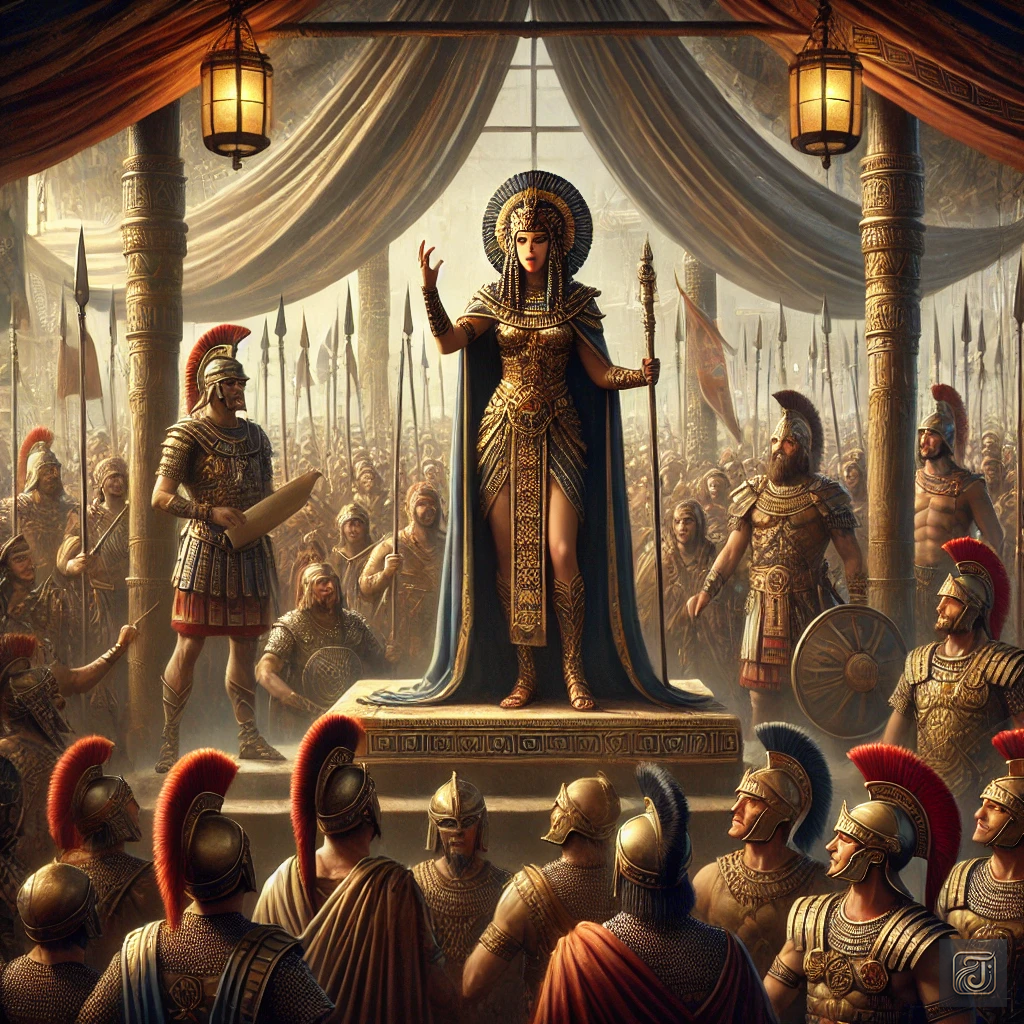
Cleopatra VII:
“We are not merely warriors.”
“We are Egypt itself.”
“By claiming victory, we will restore pride to this land.”
Cleopatra’s words struck deep into the hearts of her soldiers.
With renewed determination, they raised their voices in a resounding cry of allegiance, ready to fight for their queen and their homeland.
Chapter 6: The Strategy Within the Carpet

Cleopatra realized that Julius Caesar, the Roman general who had intervened in Egypt’s turmoil, held the key to reclaiming her throne.

Julius Caesar
A Roman general and a pivotal figure who transformed the Roman Republic, Julius Caesar played a crucial role in shaping the future of Egypt.
At this time, Rome was engulfed in civil war, and his presence had a profound impact on Egypt’s fate.
Cleopatra saw him as the key to reclaiming her throne—and she was willing to take a bold gamble to secure his support.
Determined, she devised a daring plan.
Her loyal handmaiden, Calixa, approached the Roman camp and inquired:
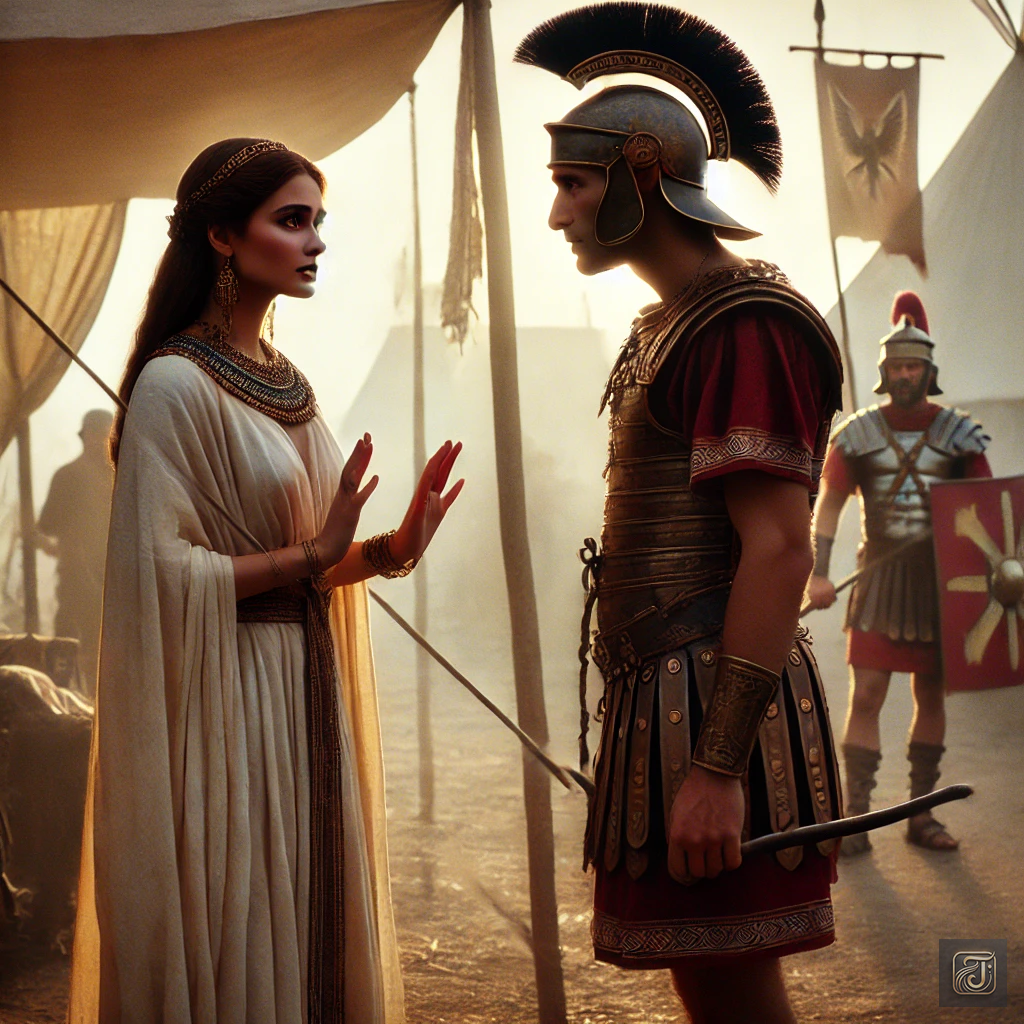
Calixa:
“Inform Caesar.”
“Queen Cleopatra seeks his aid.”
The Roman soldier:
“The general of Rome is a busy man.”
“Just because she is a queen does not mean she will be granted an audience so easily.”
“If she wishes to meet him, she must present a compelling reason.”
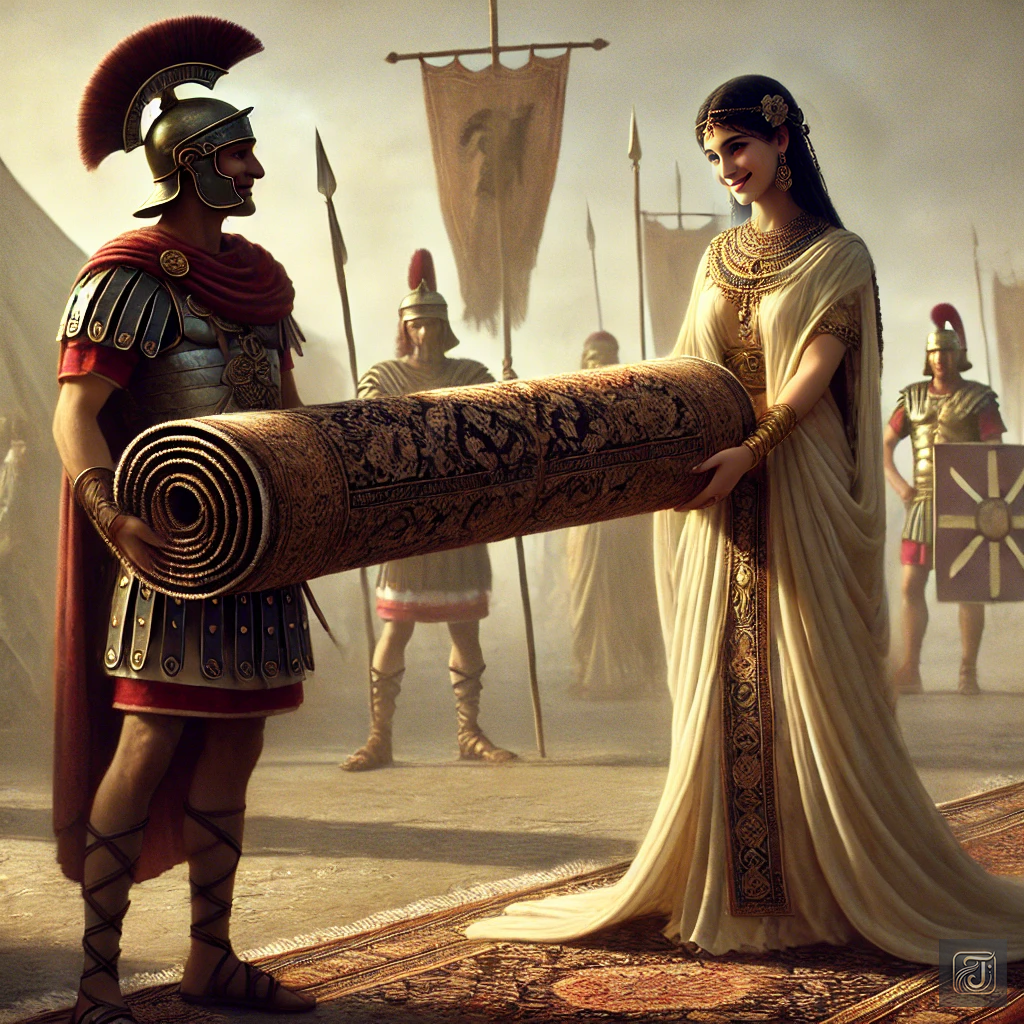
Calixa:
“Then, deliver this to him.”
It was a magnificent carpet, intricately woven and fit for a ruler.
Calixa handed the beautifully crafted gift to the Roman soldier with a quiet smile.
But beneath her composed expression, she concealed a daring secret.
Hidden within the carpet was Cleopatra herself.
The night before, Cleopatra and Calixa had carefully planned this deception—smuggling the queen into Caesar’s presence under the guise of a grand offering.

Calixa:
“When the Roman general sees this, he will undoubtedly take interest.”
Cleopatra VII:
“Calixa, you are bold.”
“But it is your wit that will save us.”

Calixa:
“Your Majesty, the path will not open if we fear danger.”
“Sometimes, boldness beyond tradition and decorum is necessary—for the future that rightfully belongs to you.”
At that moment, Calixa felt a quiet sense of victory take root in her heart.

At night, As the carpet was unrolled in Caesar’s private chambers, Cleopatra emerged from within.
For a moment, Caesar’s eyes widened in astonishment.
Draped in a gown that shimmered like gemstones, she exuded both beauty and undeniable majesty, filling the room with her commanding presence.

Cleopatra VII:
“Great Caesar.”
“I have come here to save Egypt.”
Caesar:
“Hiding inside a carpet—clever as well as bold.”

Cleopatra VII:
“As the Queen of Egypt, I will face any danger necessary to protect my kingdom.”
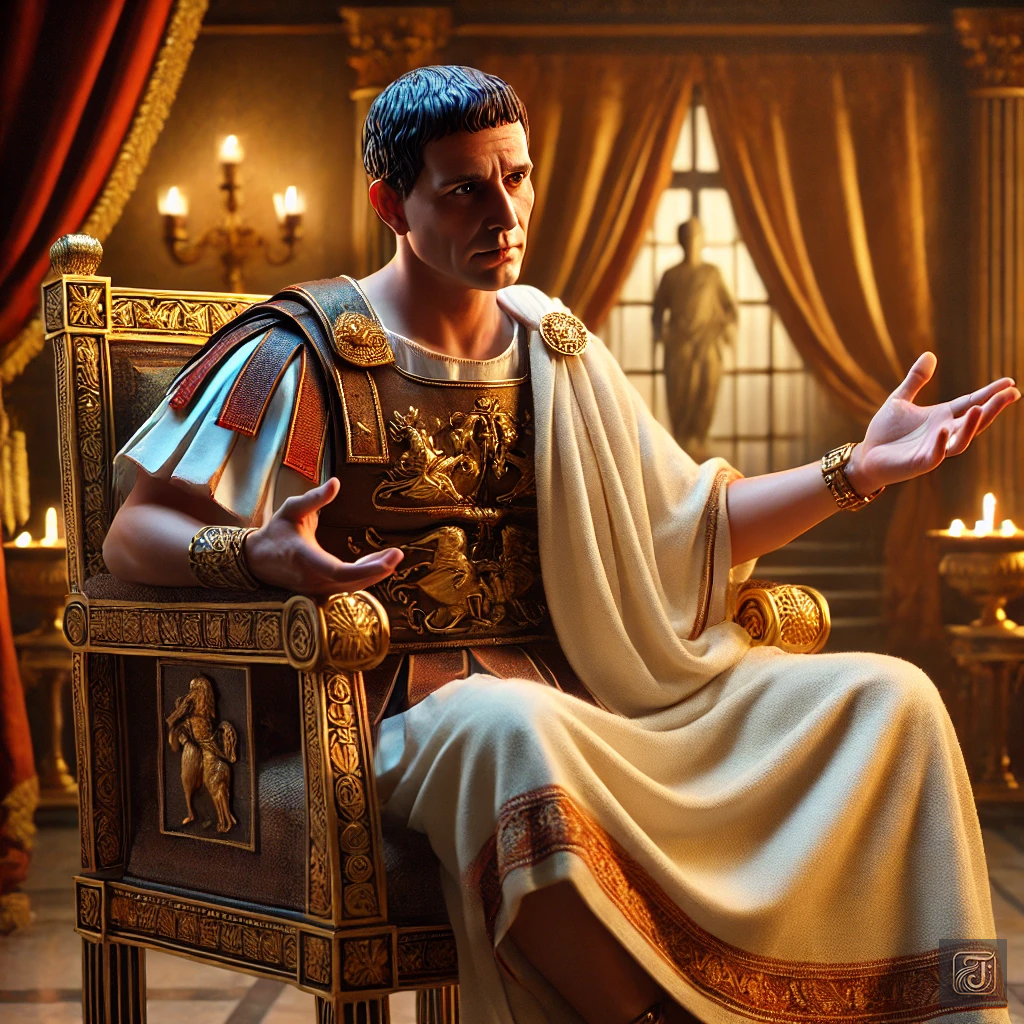
Caesar:
“Then, in honor of your courage and wisdom, I will hear what you have to say.”
“If your resolve is true, I shall be the one to test it.”

Cleopatra VII:
“Great Caesar, I have come here to entrust Egypt’s future to you.”
“Egypt survives by the blessings of the Nile.”
“But civil war and unrest threaten its very existence.”
“I wish to end this chaos and restore Egypt to prosperity once more.”

Caesar:
“So, you seek my help?”
Cleopatra VII:
“Yes. And Egypt’s prosperity will serve Rome’s interests as well.”
Caesar studied her for a moment before giving a small nod.
Cleopatra needed Rome’s support to reclaim Egypt.
Caesar sought Egypt’s vast resources and abundant grain supply.
Their interests aligned perfectly.
Chapter 7: The Reclamation of Egypt

Cleopatra and Caesar strategized together for the reclamation of Egypt.
Cleopatra VII:
“Caesar, to truly rule Egypt, we must gain the trust of the people.”
“Casualties must be kept to a minimum.”
Caesar:
“Then the key is to strike a decisive blow against the enemy.”
Caesar pointed to the map, outlining a strategic attack that would change the course of the war.
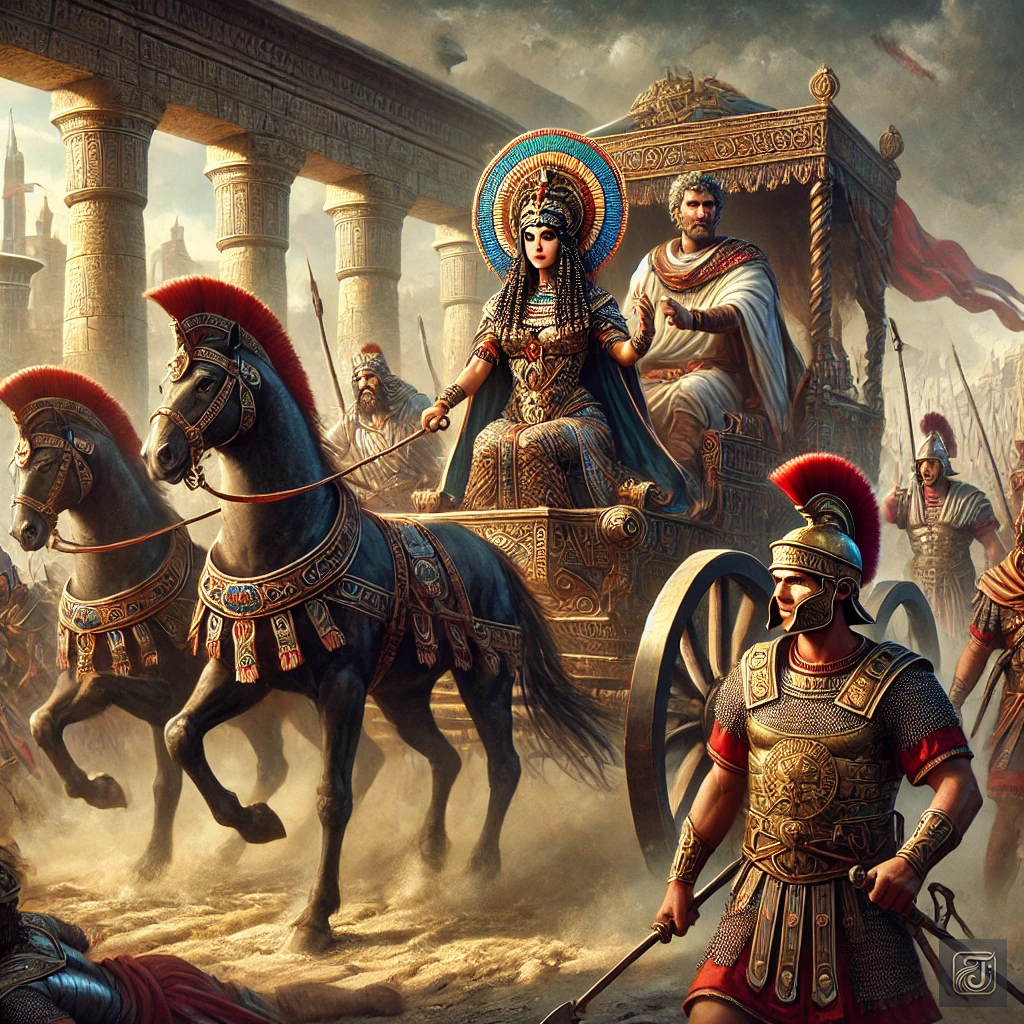
The Alexandrian War (48–47 BCE)
With Caesar’s support, Cleopatra plunged into a civil war against her brother, Ptolemy XIII.As Caesar’s forces advanced into Alexandria, chaos erupted within the royal court.
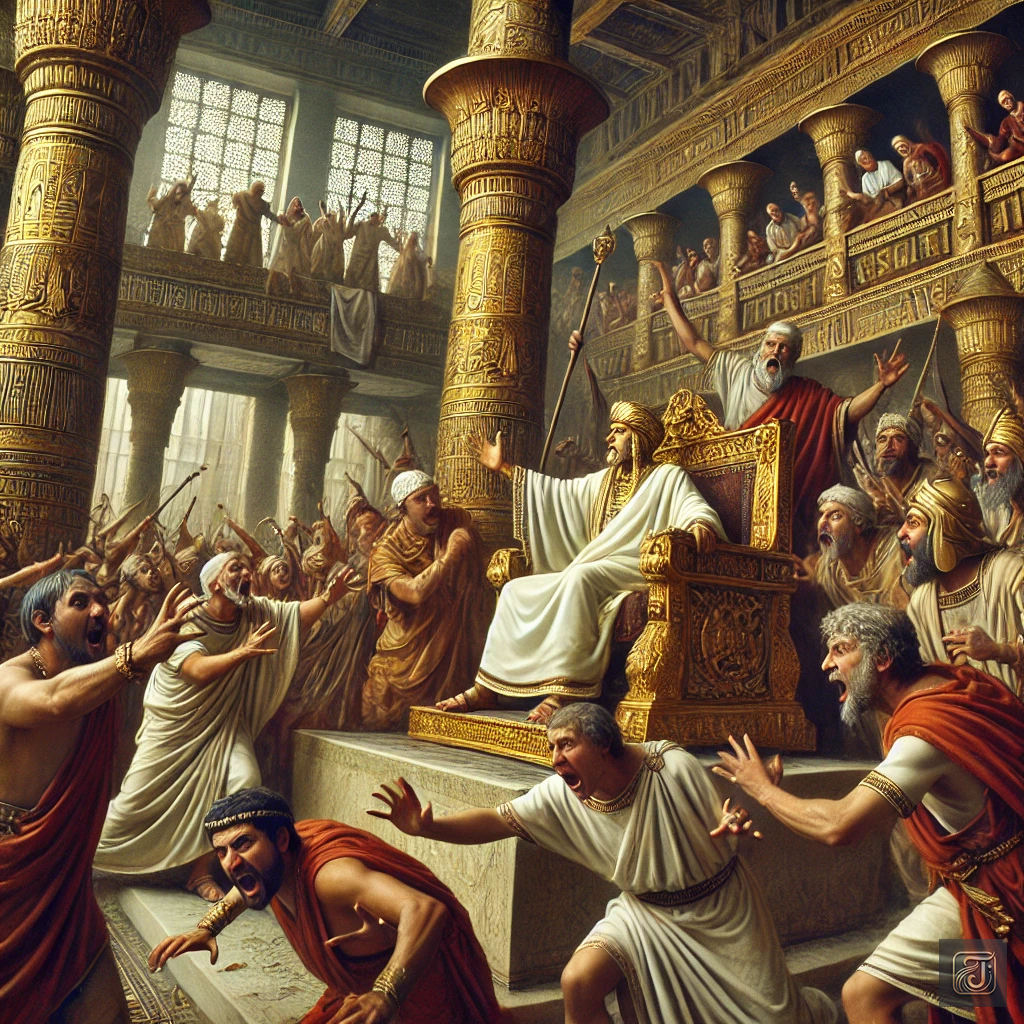
Court official:
“Your Majesty, the Roman forces are closing in.”
“At this rate…!”
The panicked voice of a court official filled the chamber.
Ptolemy XIII struggled to mask his rising fear.
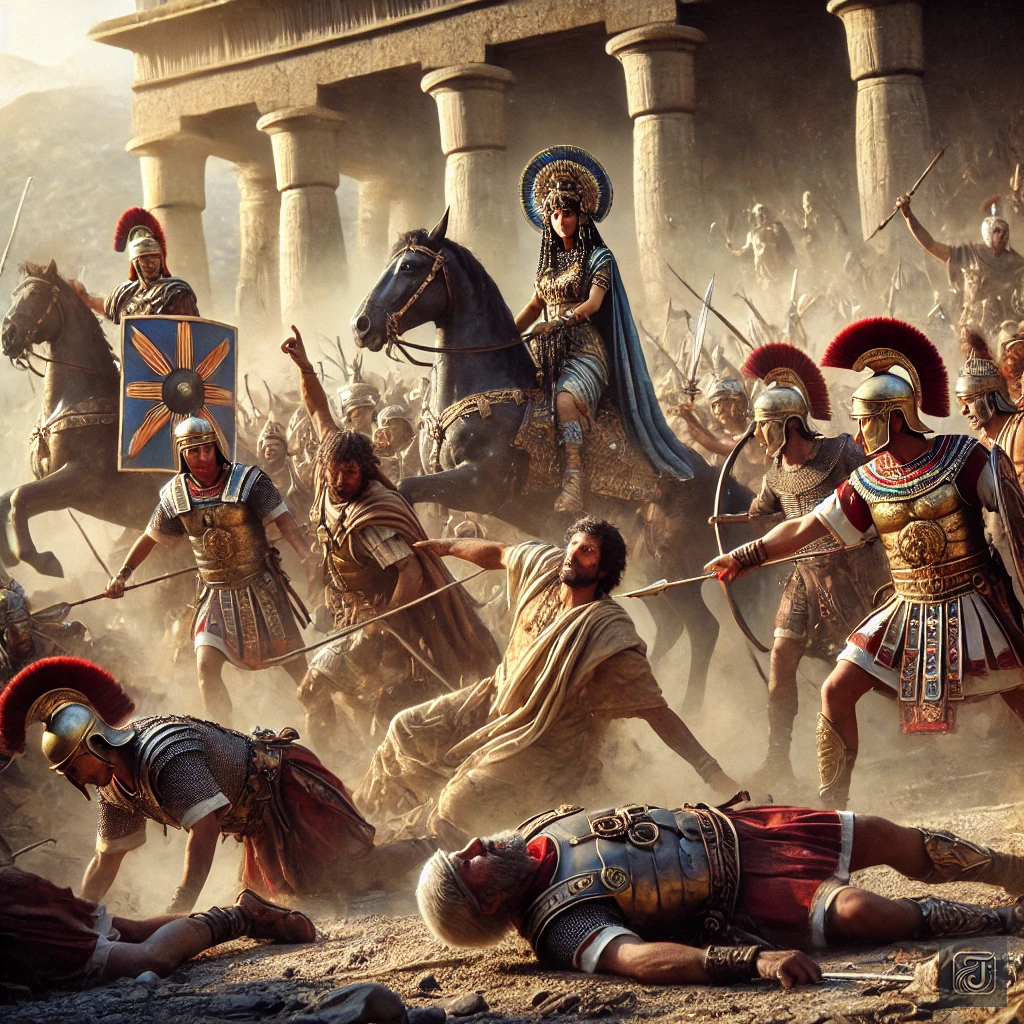
As the battle began, Caesar’s Roman legions and Cleopatra’s loyalists coordinated their attacks, encircling the enemy forces.
Amid the chaos, Ptolemy XIII fell in battle.
With victory secured, Cleopatra returned to the royal palace, reclaiming her rightful place as Egypt’s queen.

As Cleopatra stepped into the palace, the very courtiers who had once cast her out now stood before her, trembling with apprehension.
She slowly surveyed them, her gaze unwavering.
Then, in a calm yet commanding voice, she spoke.

Cleopatra VII:
“I told you once before—’ When I return to this palace, you will bow before me.’”
At her words, the courtiers lowered their heads, silenced by the weight of her authority.
Without sparing them another glance, Cleopatra strode forward, reclaiming her place upon the throne.
Chapter 8: The Queen’s Return

Calixa:
“My Queen, the people are waiting for you.”
Calixa’s steady voice echoed through the grand hall as Cleopatra slowly rose to her feet.
The golden hem of her gown trailed elegantly along the marble floor, catching the light and accentuating her regal presence.
She paused for a moment, taking a deep breath before turning to face Calixa.

Cleopatra VII:
“I have returned for this very moment.”
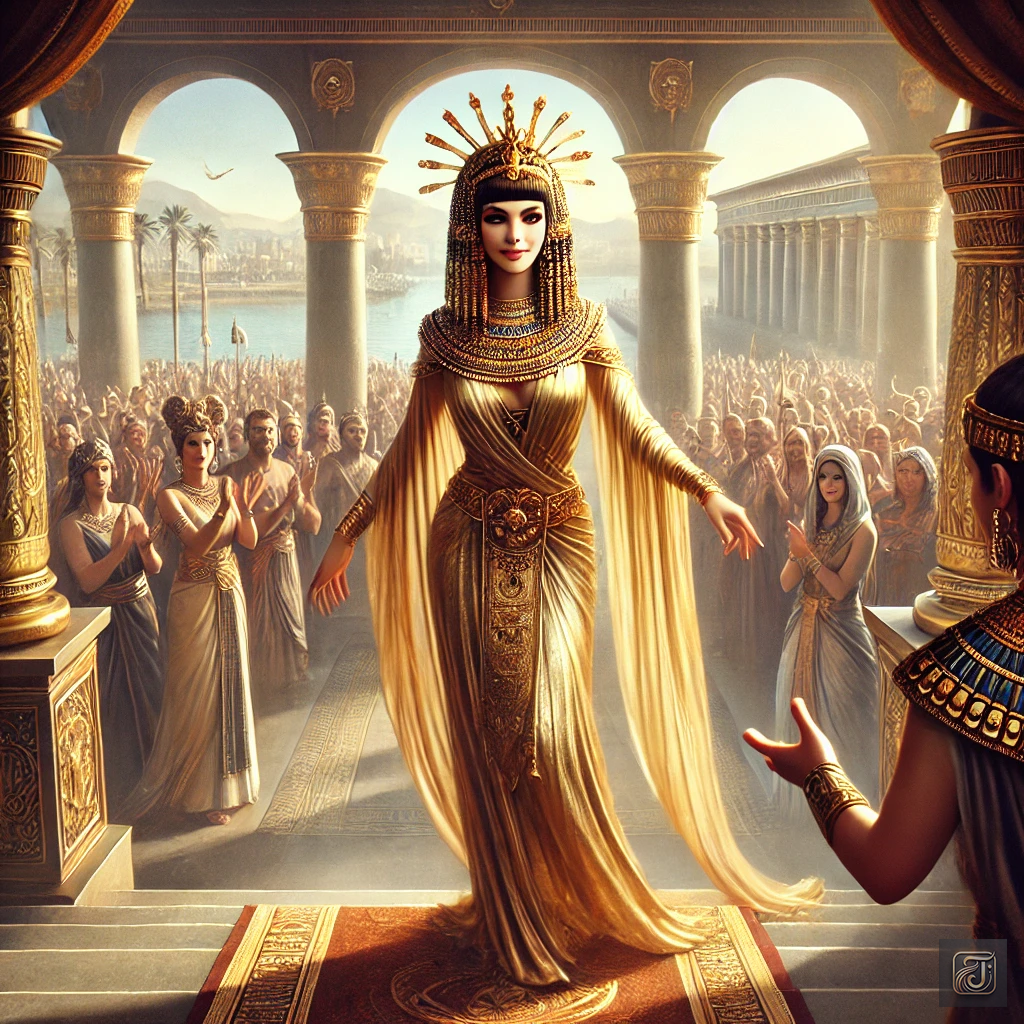
Encouraged by Calixa’s words, Cleopatra stepped onto the palace balcony.
Before her, the people of Egypt erupted in cheers, the Nile glistening behind them as a symbol of the kingdom’s enduring strength.

Crowd:
“Our Queen, Cleopatra!”
The crowd’s cheers echoed through the palace grounds.
Cleopatra raised her hand gracefully, her gaze steady as she addressed her people.

Cleopatra VII:
“I have returned to protect Egypt.”
Together, we will restore this land to its former glory.”
Her voice rang out across Alexandria, carrying with it the strength of her resolve.
A wave of excitement spread through the crowd, their cheers rising in celebration of their queen’s triumphant return.

Cleopatra then formally began a co-rule with her younger brother, Ptolemy XIV, but in reality, all power rested firmly in her hands.
Within the royal court, every word she spoke shaped the kingdom’s decisions.
Courtiers scrambled to secure her favor, knowing that her approval determined their fate.
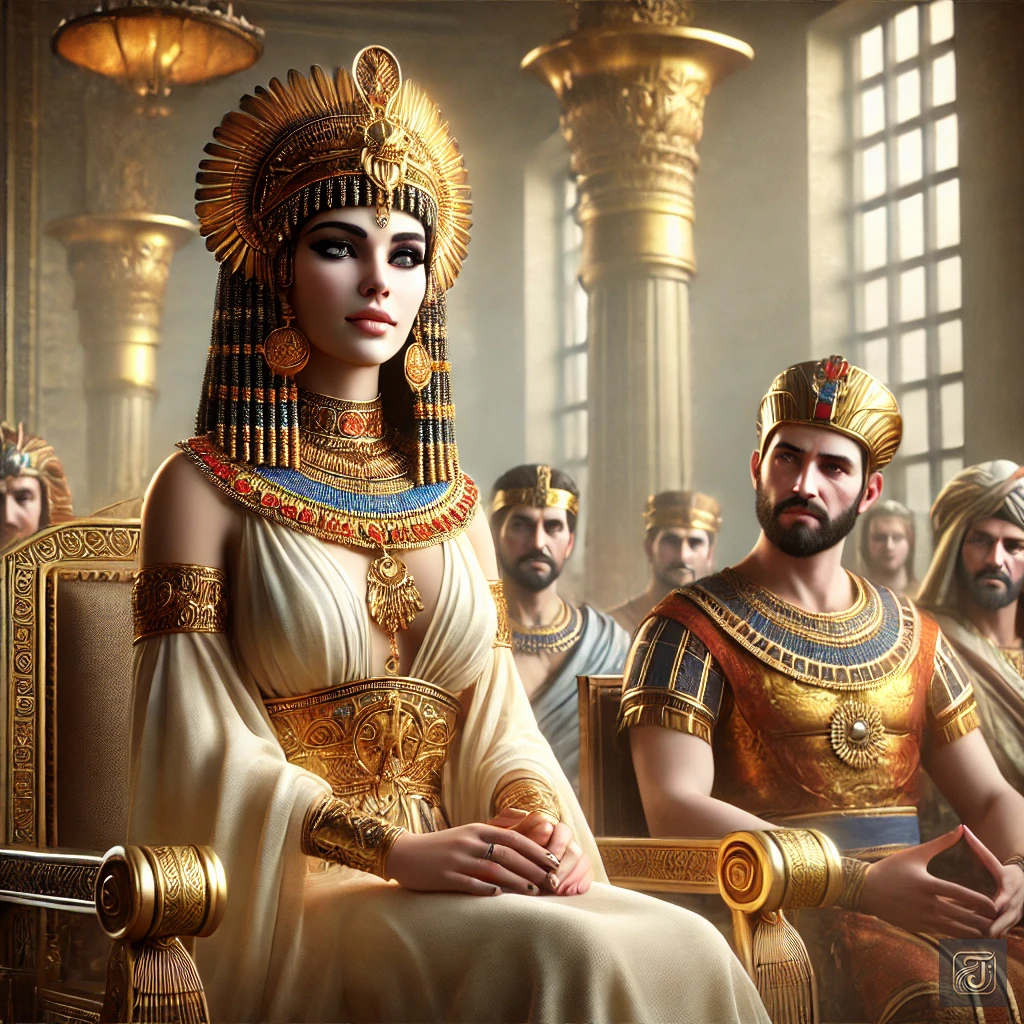
Cleopatra VII:
“Brother, you need only be a king in name.”
Ptolemy XIV:
“Sister, then what is my role…?”
Cleopatra VII:
“The stability of Egypt comes first.”
During a royal council meeting, Cleopatra’s calm yet firm words echoed through the chamber.
Ptolemy XIV hesitated, his expression filled with uncertainty.
But Cleopatra’s voice was resolute, leaving no room for argument.

Cleopatra VII:
“If you follow my command, Egypt will prosper, and your name will be recorded in history.”
With no choice but to accept her words, Ptolemy XIV yielded.
Thus, Cleopatra solidified her rule, becoming the true and undisputed ruler of Egypt.
Chapter 9: A Bridge to Rome

As Cleopatra worked to secure her power, both within the royal court and beyond, the foundation for Egypt’s future grew stronger.
In time, her bond with Caesar deepened, and during a period of relative peace, their son, Caesarion, was born.
Holding her infant in her arms, Cleopatra smiled gently as she gazed upon the flowing waters of the Nile and whispered softly.

Cleopatra VII:
“Caesarion, you will be the bridge between Egypt and Rome.”
Caesar:
“This child has a great future ahead.”
“Both Egypt and Rome will change because of him.”
Later, Cleopatra was invited to Rome, further strengthening her ties with Caesar.
As she stood beside him in the grand halls of the Roman palace, whispers from the senators reached her ears.

whispers:
“An Egyptian woman dares to act so boldly here.”
“Her beauty must be truly captivating to have ensnared Caesar’s heart.”
Hearing their murmurs, Cleopatra smiled knowingly and leaned in to whisper to Caesar.

Cleopatra VII:
“Roman men seem to fear strong women.”
Caesar:
“Your strength is beyond their understanding.”
“But that is precisely what makes you so captivating.”
Chapter 10: Controversy in Rome
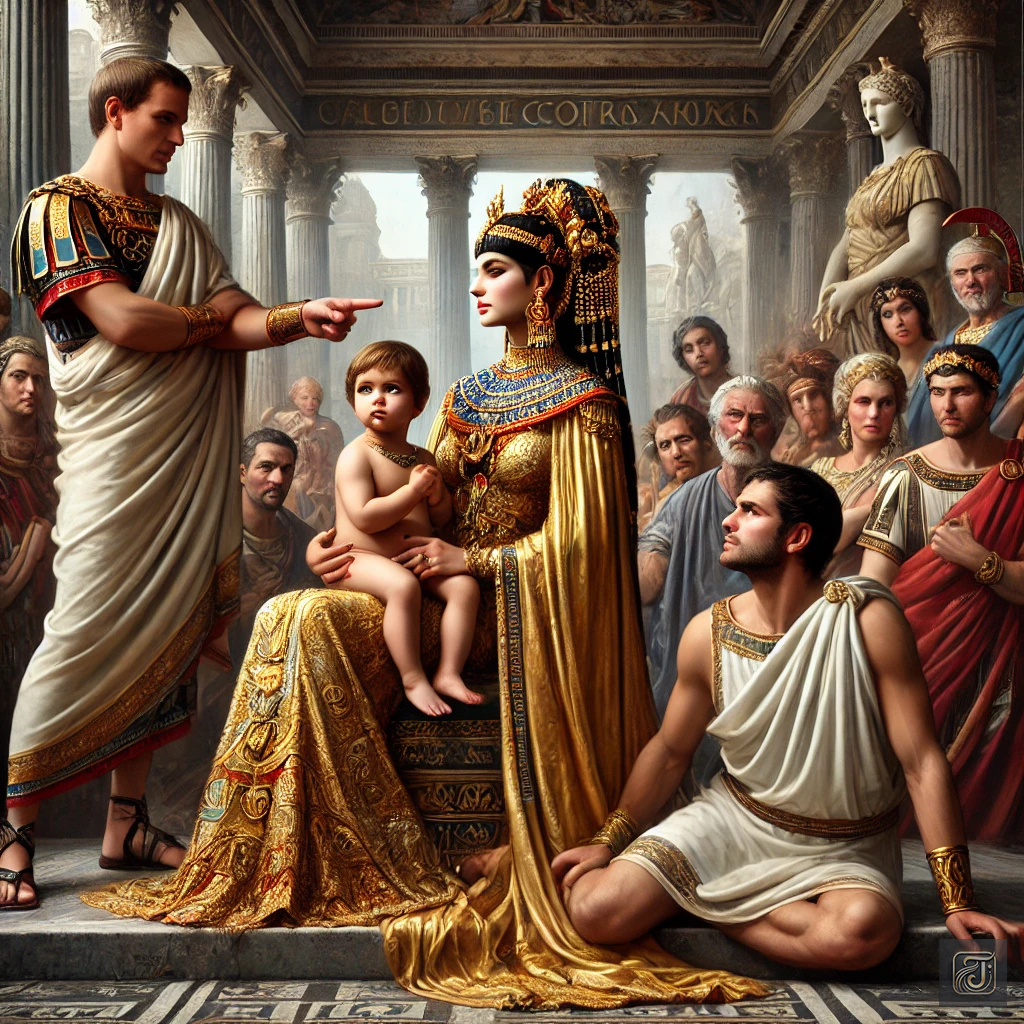
When Cleopatra arrived in Rome at Caesar’s invitation, accompanied by their son Caesarion, her presence stirred great controversy within Roman society.
Caesar admired her intelligence and frequently sought her counsel, incorporating her ideas into his decisions.
However, the conservative factions of Rome viewed her with disdain, condemning her influence over the great general.

Roman senate:
“Has Caesar abandoned Rome for an Egyptian woman?”
Whispers of discontent grew louder within the Senate as Caesar spent more time with Cleopatra.
His increasing embrace of Egyptian luxury and customs only fueled resentment among Rome’s elite, further intensifying the criticism against him.
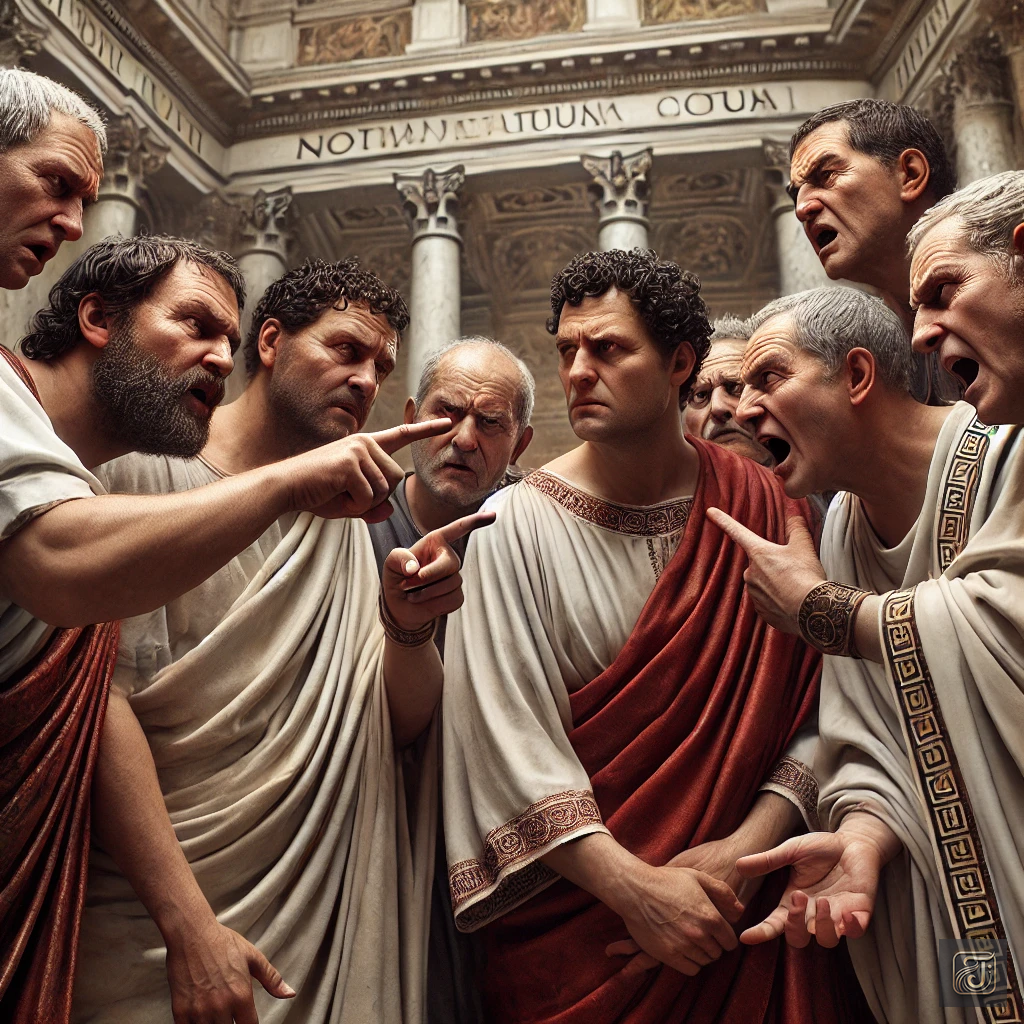
Roman senate:
“Does he expect us to cast aside our togas and don Egyptian robes?”
Murmurs of discontent filled the hall as Caesar hosted a lavish banquet in the Egyptian style.
Seated boldly beside him, Cleopatra exuded regal confidence.
Resting upon an ornately decorated golden throne, she gazed over the Roman nobles, offering them a quiet, knowing smile.

Cleopatra VII:
“I don’t care how the men of Rome see me.”
“I am here as the Queen of Egypt.”
Caesar:
“Your presence is bringing a new wind to Rome.”
“And I need that.”
However, within the Senate, movements to perceive Cleopatra’s influence as a threat were growing stronger.
At a distant table, senators whispered among themselves.
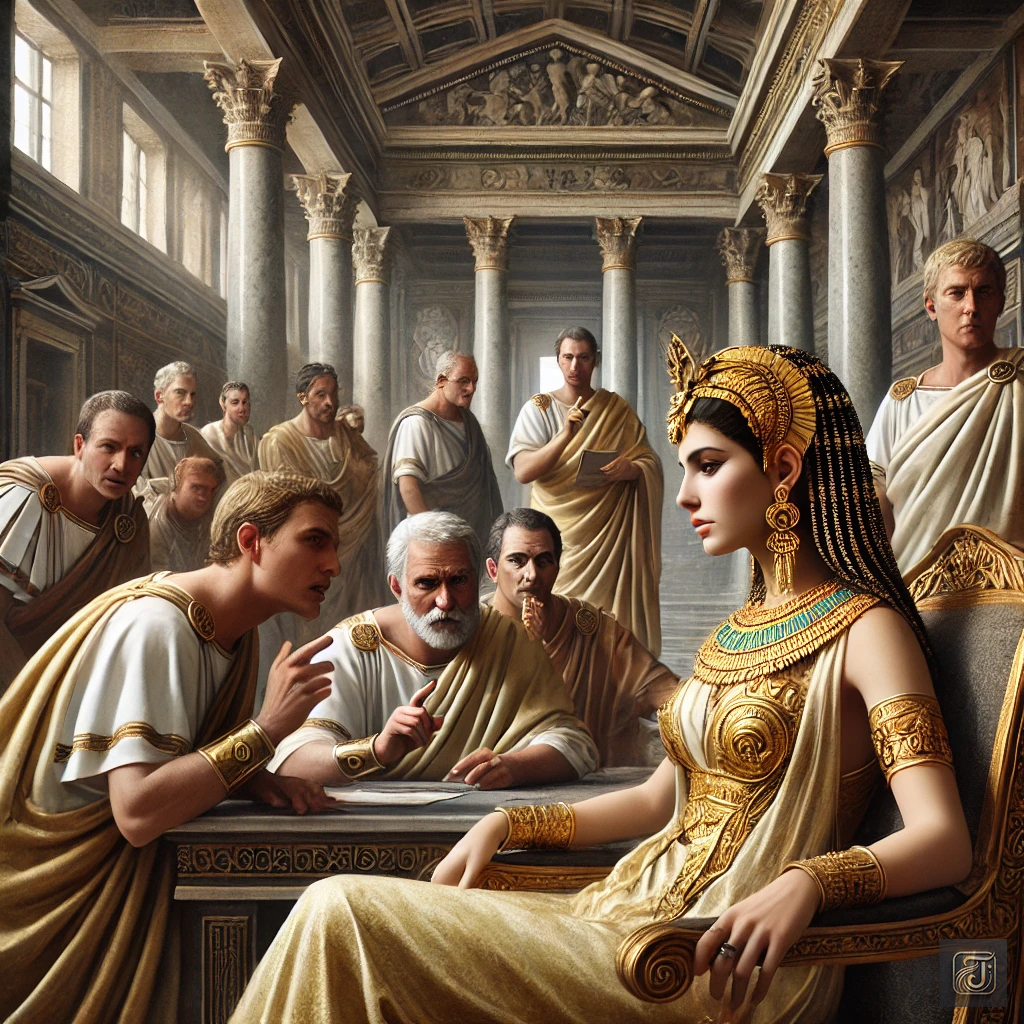
Senators:
“Is that Egyptian woman planning to take over Rome?”
“No, it’s just that Caesar has lost his heart to her.”
Cleopatra VII:
“Envy, jealousy, resentment… The Senate is quite disgraceful, isn’t it?”
Chapter 11: The Death of Caesar and a New Era
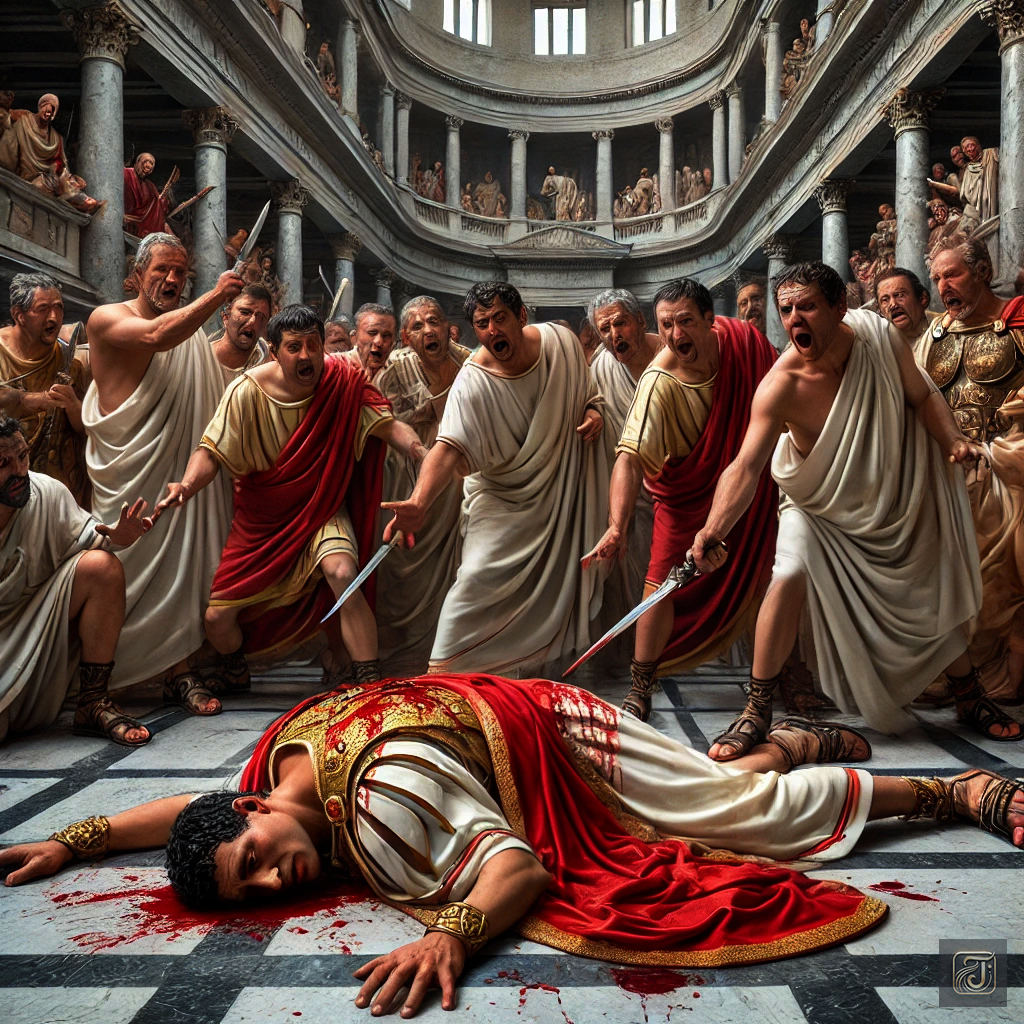
On March 15, 44 BCE, the halls of the Roman Senate echoed with the clash of swords and agonized cries.
At the moment of Caesar’s assassination, the chamber was filled with chaos and betrayal.
Cleopatra received the news in the palace of Rome.
Calpurnia rushed over in a panic and whispered in a hushed voice.

Calixa:
“Your Majesty, it’s terrible… Caesar… he was stabbed in the Senate.”
Cleopatra VII:
“Are you certain?”
Calixa:
“Yes, Your Majesty… Caesar is… gone.”
She felt the air in the room grow suddenly cold.
With trembling hands, she reached for a pillar adorned with carvings of the Nile.
Then, in a quiet voice, she murmured—

Cleopatra VII:
“Caesar… even you could not escape fate.”
Shortly after, she made the swift decision to return to Egypt.
As she held her son, Caesarion, in her arms, she made a silent vow in her heart.

Cleopatra VII:
“Caesar… you are no longer here.”
“But I will protect this child, and I will protect Egypt.”
“I will never let your death be in vain.”
Her voice trembled, but within it lay an unshakable resolve.
With Caesar’s support, Cleopatra had seemed to secure stability.
However, with his assassination, that stability was lost once again—within just four years.
Chapter 12: The Formation of the Second Triumvirate

After Caesar’s death, Rome plunged into chaos, seeking a new order, which led to the formation of the Second Triumvirate.
The key leaders were Caesar’s adopted son, Octavian, Marcus Antonius, and Lepidus.

Octavian:
“Strength alone is not enough to rule Rome”
Antony:
“That’s true, but whether the three of us can truly coexist remains to be seen.”
Meanwhile, back in Egypt, Cleopatra was carefully assessing how this new regime would impact her kingdom.

Cleopatra VII:
“Rome is now on the brink of internal division.”
“This could work to Egypt’s advantage.”
While moving cautiously, she began exploring the possibility of a new alliance.
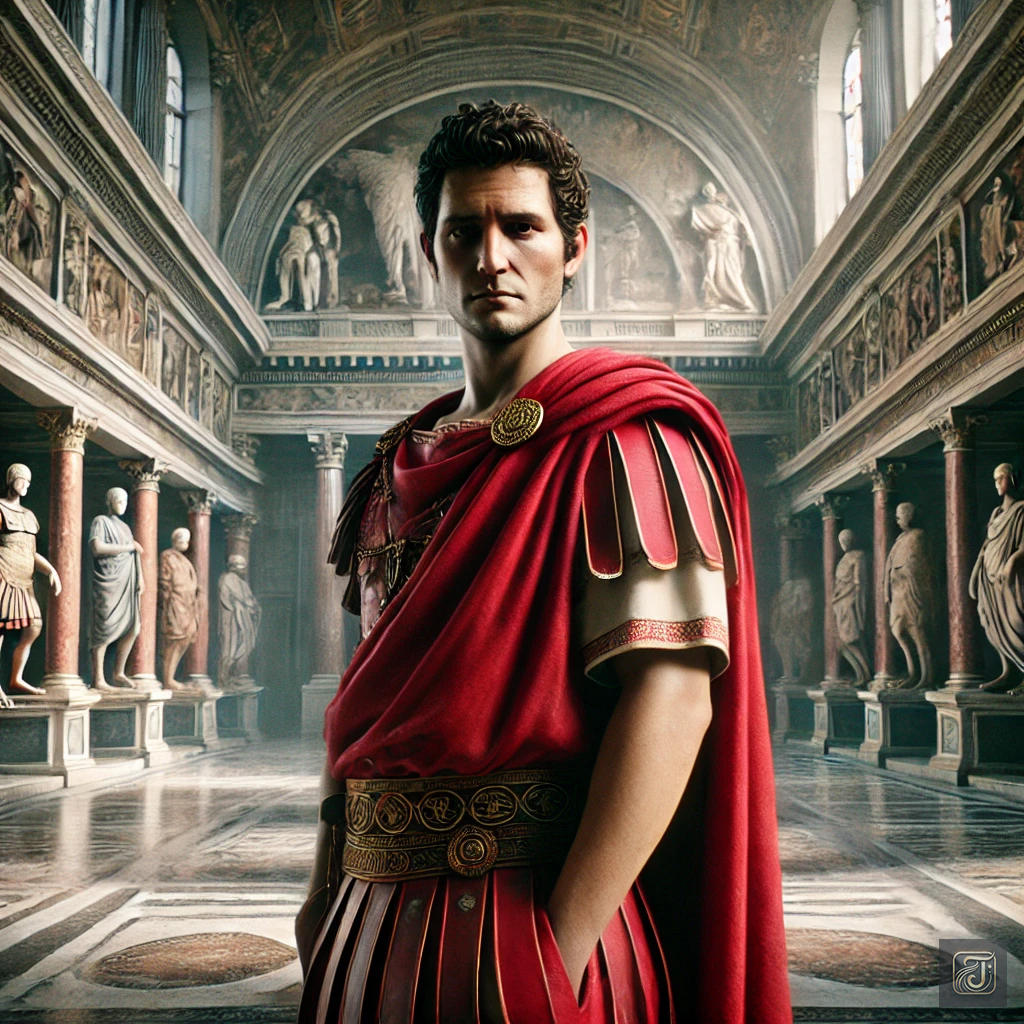
And the man who emerged as her potential ally was the Roman general, Marcus Antonius.
The two would later form a political alliance—and eventually fall deeply in love.
Desperate to protect Egypt’s prosperity, Cleopatra maneuvered carefully, striving to evade Rome’s dominance.
Marcus Antonius
A Roman general and politician, Marcus Antonius was a close ally of Julius Caesar and played a significant role in his campaigns.
After Caesar’s assassination, he formed the Second Triumvirate alongside Octavian and Lepidus.
Chapter 13: The Meeting at Tarsus

In 41 BCE, Queen Cleopatra of Egypt accepted Marcus Antonius’ invitation and decided to journey to Tarsus (modern-day Turkey).
She planned to use this opportunity to assert her dignity and influence over Rome’s rulers.
On the day of her arrival, a magnificent ship approached the port of Tarsus, gliding across the waters as if sailing down the Nile itself.
The vessel’s golden sails gleamed under the sunlight, while silver-plated oars moved in perfect harmony, slicing smoothly through the water.
The deck was adorned with flowers and lavish decorations, creating a scene so breathtaking it seemed to have emerged straight from mythology.
The crowd gathered at the harbor stood in awe, mesmerized by the sheer splendor before them.

Whisper:
“Is this a dream?”
“It doesn’t seem like something made by human hands…”
Whispers spread through the crowd, and no one could take their eyes off the spectacle before them.

At the center of the ship sat Cleopatra on a golden throne.
Draped in radiant Egyptian attire, she gazed around with a serene smile.
In her eyes gleamed both confidence and a carefully calculated strategy.

As the ship docked in front of the palace where Marcus Antonius awaited, he unconsciously held his breath.
The queen’s arrival exuded an aura so commanding it seemed to dominate all of Tarsus.

She appeared like the very incarnation of the goddess Isis, her presence enveloped in the delicate fragrance of roses.
The sheer magnificence of her appearance overwhelmed the crowd gathered at the port.
Antonius, visibly awestruck, stepped forward to greet her.

Antonius:
“Cleopatra, I had heard of your splendor, but seeing you in person leaves me speechless.”
Cleopatra VII:
“General, this is but a glimpse of Egypt’s wealth—and of what our alliance can bring.”
At their meeting, the two engaged in deep discussions, weighing their political interests.
Cleopatra sought an alliance to secure Egypt’s survival and prosperity, while Antonius aimed to solidify his power in Rome.

Cleopatra VII:
“If we unite our strengths, we can shape the future of both Rome and Egypt.”
Antonius:
“Seeing your wisdom and resolve, I know that to be true.”
Chapter 14: A Night of Celebration

One night, Cleopatra and Antonius shared a lavish banquet together.
Dishes served in golden vessels and the finest wines were laid out, showcasing Egypt’s wealth and extravagance in all its glory.

Antonius:
“The wealth of Egypt is truly a gift from the gods.”
Cleopatra VII:
“I can demonstrate an extravagance unlike anything ever seen before.”
Antonius:
“Now that is something I must see.”
“What do you intend to do?”
Still smiling, Cleopatra removed one of her earrings.
There is a large, luminous pearl glistened in her palm.
At that time, pearls were valuable enough to buy a small country.
Cleopatra VII:

“With wealth like this, one could buy an entire kingdom.”
With those words, she gently dropped the pearl into a silver goblet filled with vinegar.

As the pearl fizzed and dissolved before his eyes, Antonius could hardly believe what he was witnessing.
Antonius:
“What in the world are you doing?!”
“Do you realize what you’ve just done?!”
“That one pearl could buy an entire kingdom!”

As Antonius stared at her in shock, Cleopatra lifted the goblet and drank it down in one swift motion.

Antonius cried out in astonishment, but Cleopatra calmly set the goblet down and met his gaze head-on.
In her eyes burned unwavering resolve and the pride of a true queen.

Cleopatra VII:
“As Queen of Egypt, I do not flaunt luxury for its own sake.”
“I did this to show you the strength and pride of this land.”
Her voice carried a commanding dignity, the weight of one who bore the future of Egypt upon her shoulders.
Antonius remained speechless, yet her words and presence struck deep within him.
She was unlike anyone he had ever encountered before.
She was not merely a ruler—she was the very embodiment of Egypt itself.

Antonius:
“When I witness your unshakable pride and unwavering confidence, I cannot help but be moved.”
Antonius answered quietly, his voice carrying both admiration and surrender.
In that moment, he no longer saw himself merely as a Roman general.
He glimpsed a future where he was more—a true ally to Cleopatra, and perhaps, her lifelong companion.
And so, Antonius found himself irresistibly drawn to Cleopatra.
The Meaning and Intent Behind Dissolving the Pearl in Vinegar
A Display of Egypt’s Wealth
Through this act, Cleopatra sought to demonstrate the immense wealth of Egypt to the Roman commanders.
To her, dissolving and consuming a pearl of such value was a symbol of Egypt’s vast economic power—an empire so rich that such extravagance was effortless.
An Assertion of Boldness and Wit
Beyond sheer luxury, Cleopatra’s gesture showcased her audacity and intelligence.
She wanted to prove that she was not just a woman of beauty but a ruler of formidable strength and wit.
Establishing Political Supremacy
By performing this act, Cleopatra impressed upon Antonius the significance of Egypt.
She wanted the Romans to see that she was not merely an ally but a sovereign of unparalleled influence—one who commanded respect, not just for herself, but for her entire kingdom.
Chapter 15: Divorce from Octavia and Marriage to Cleopatra
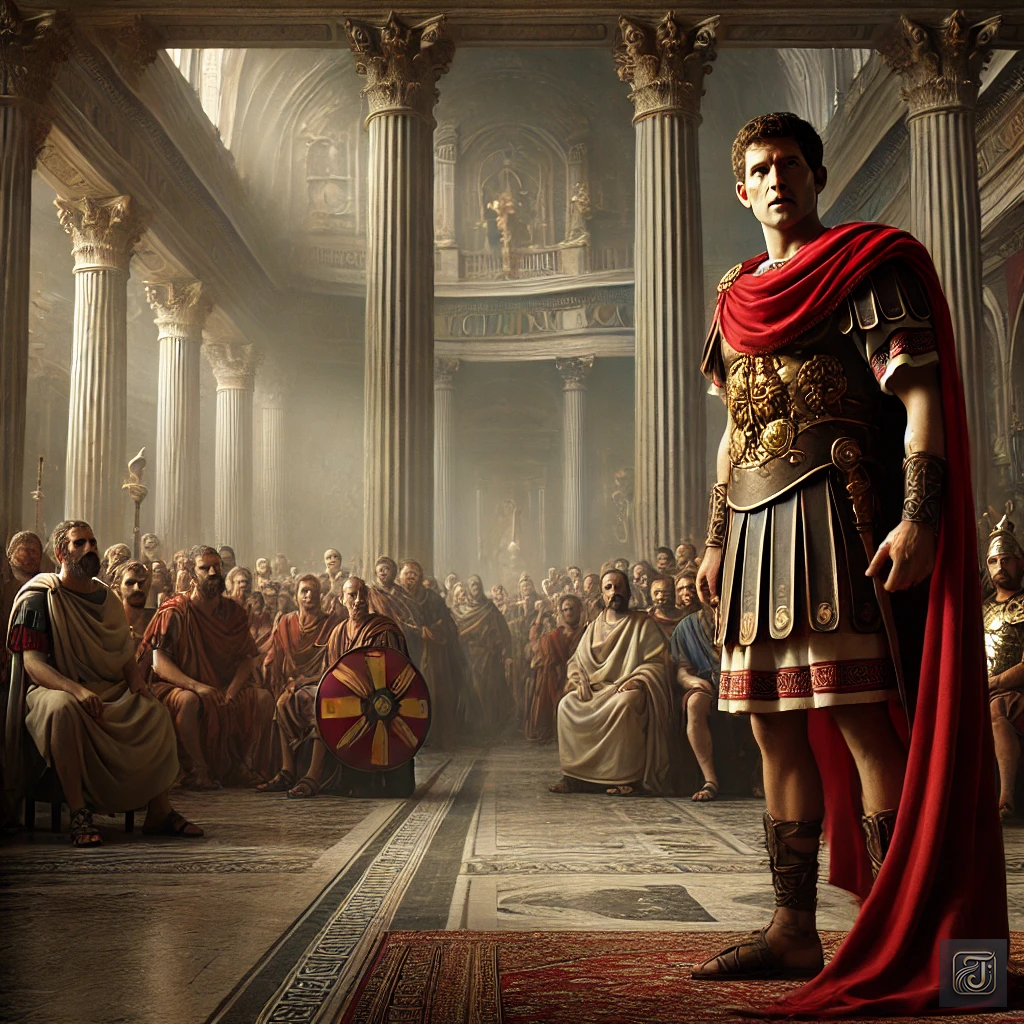
In 35 BCE, Roman general Marcus Antonius finally made a fateful declaration.
Within the solemn halls of Rome’s grand palaces, supporters of Octavian watched with tense anticipation, awaiting his words.
With unwavering confidence, Antonius stood tall and boldly revealed his decision.
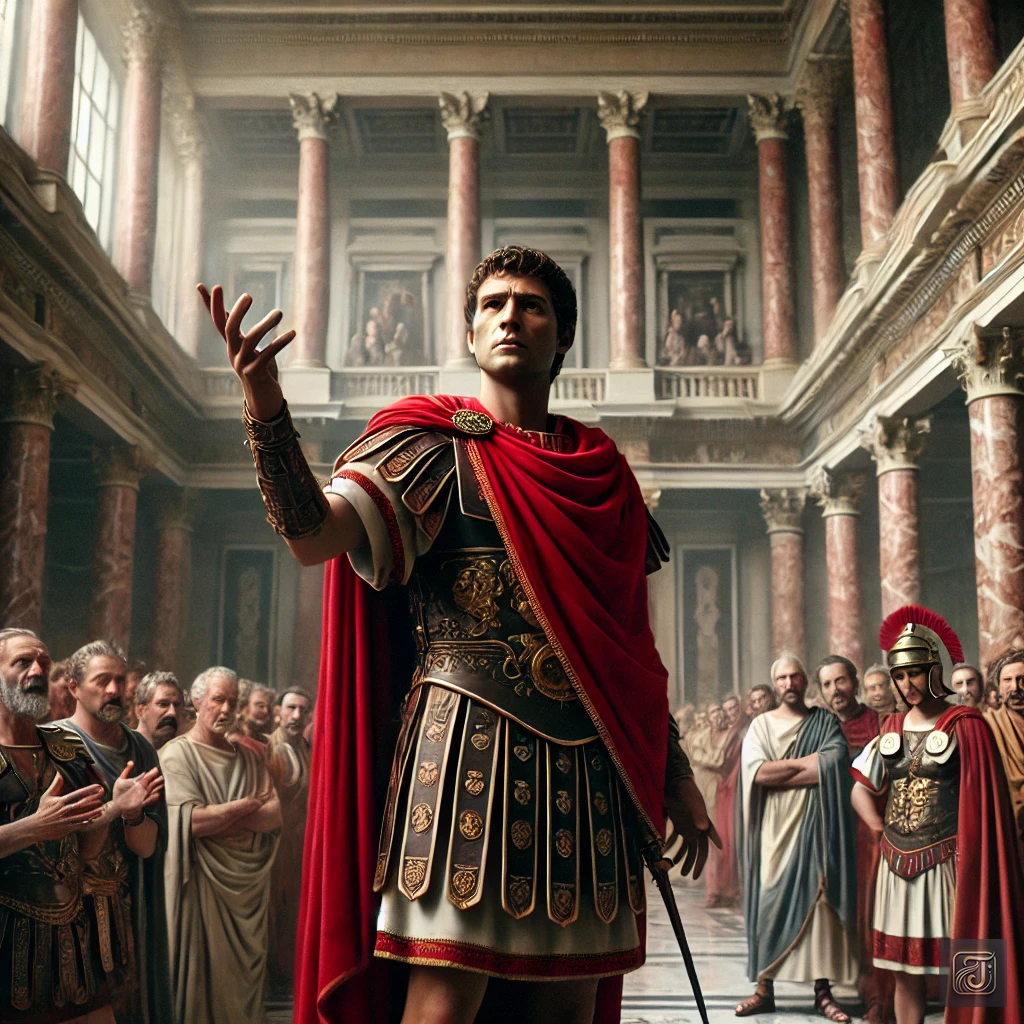
Antonius:
“My heart is no longer bound by political duty to Rome.”
“Therefore, I declare my divorce from Octavia and my marriage to Cleopatra, the Queen of Egypt.”
“Together with her, I shall lead Rome to prosperity!”
With those words, his marriage to Octavia, the sister of Octavian came to an end.
In Antonius’ eyes, there was a light that seemed to gaze far beyond Rome—into something deeper, something untamed.
And at the end of that gaze stood the woman who would forever alter his fate—Cleopatra, Queen of Egypt.

But the fact that Antonius had cast aside Octavia, the sister of Octavian, in favor of Cleopatra sent shockwaves through Roman society.
Most of all, it ignited the furious wrath of Octavian himself.
When news reached Rome that Antonius had declared his divorce from Octavia and married Cleopatra, Octavian was furious.

Octavian:
“Antonius has betrayed my sister and sold his soul to the Queen of Egypt!”
“This is an insult to me!”
“And I will make sure he regrets ever dishonoring me!”
Meanwhile, Antonius departed for Egypt, determined to solidify his bond with Cleopatra.
There, he formally married her—sealing their alliance, not just in politics, but in destiny itself.
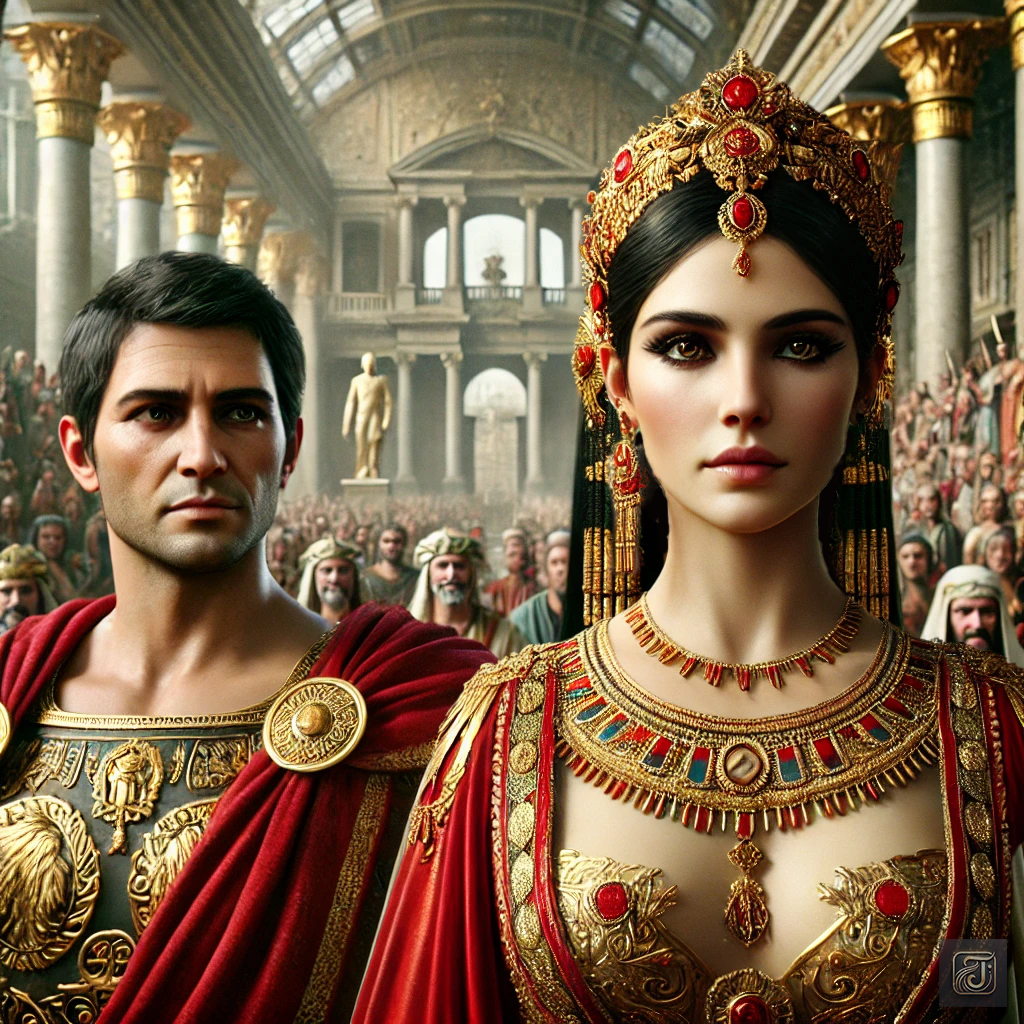
In the grand palace of Alexandria, the ceremony unfolded with breathtaking splendor.
Cleopatra, adorned in garments symbolizing the goddess Isis, emerged before the people alongside Antonius.
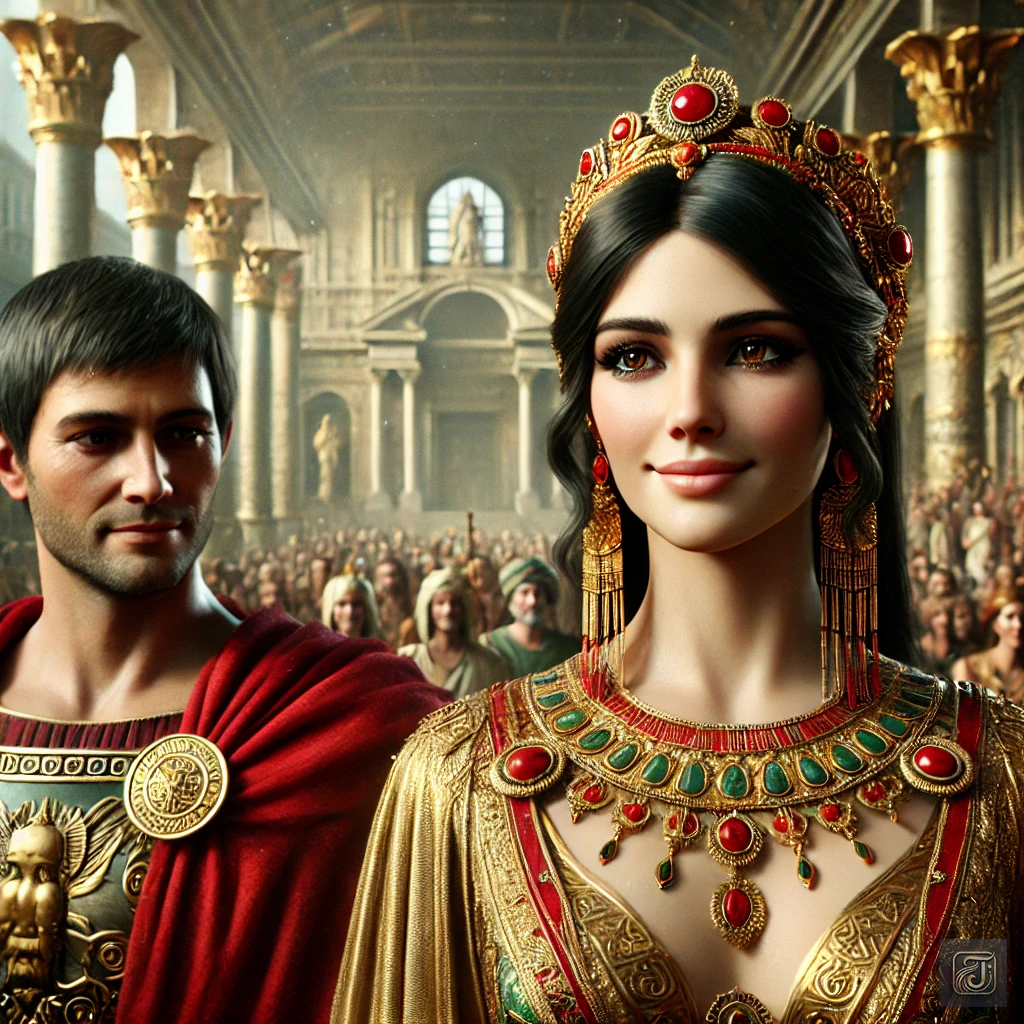
Antonius:
“Our union is a symbol of the future of Rome and Egypt.”
Cleopatra VII:
“Let us build a future where Egypt and Rome prosper together.”
However, this marriage only intensified the outrage in Rome, further fueling the inevitable and final confrontation with Octavian.
Chapter 16: The Donations of Alexandria
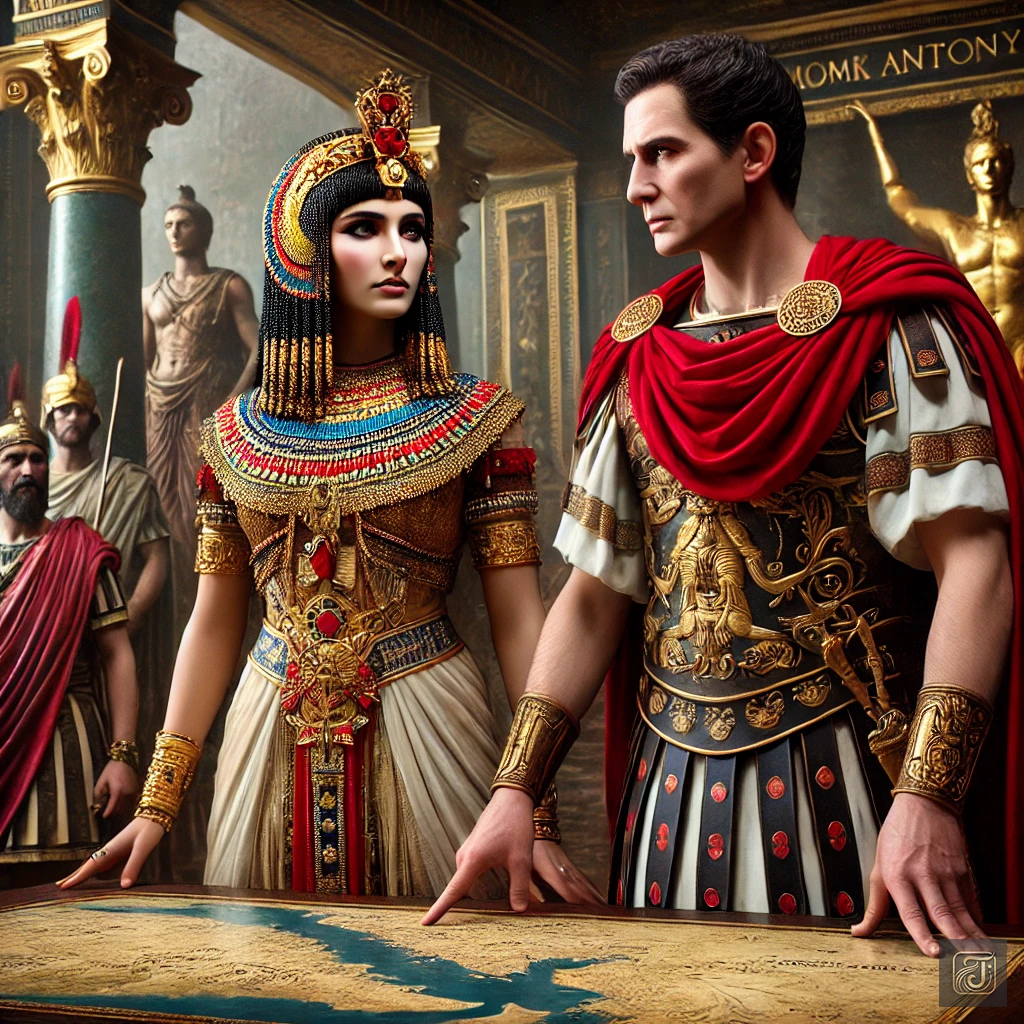
Between 37 and 34 BCE, Cleopatra and Antonius openly embraced their relationship, solidifying a powerful alliance centered on Egypt and the eastern provinces of Rome.
Antonius leveraged Egypt’s vast resources to strengthen his military forces.
As part of this strategy, he devised a plan to reorganize the territories of Egypt and Rome’s eastern holdings.
The grand spectacle known as “The Donations of Alexandria” became the most symbolic event of this vision.
In the lavishly adorned palace square of Alexandria, before a gathered multitude, Antonius proclaimed the granting of vast territories to Cleopatra and her children.
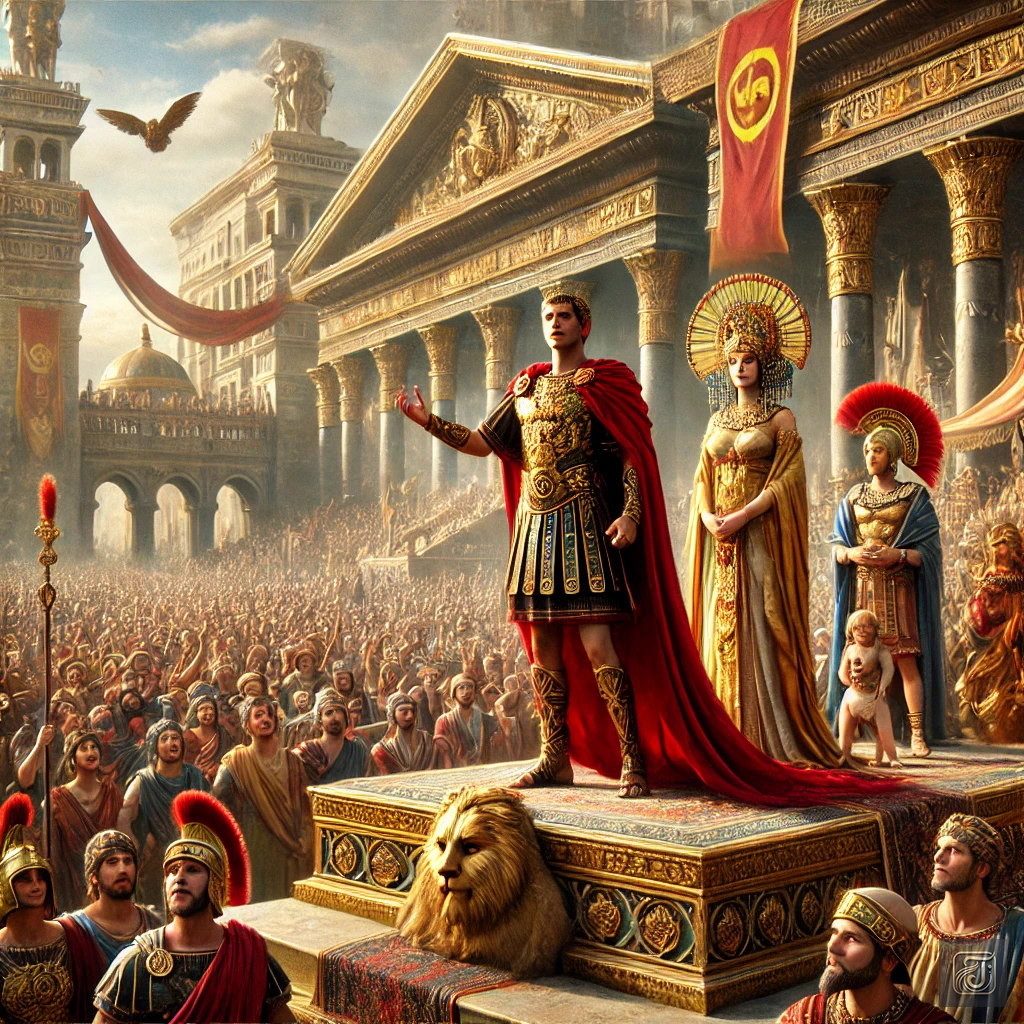
Antonius:
“To Caesarion, I grant Egypt, Cyprus, and Syria.”
“As the son of Cleopatra, he is worthy to rule these lands.”
Furthermore, Antonius distributed additional territories to the children he had with Cleopatra.
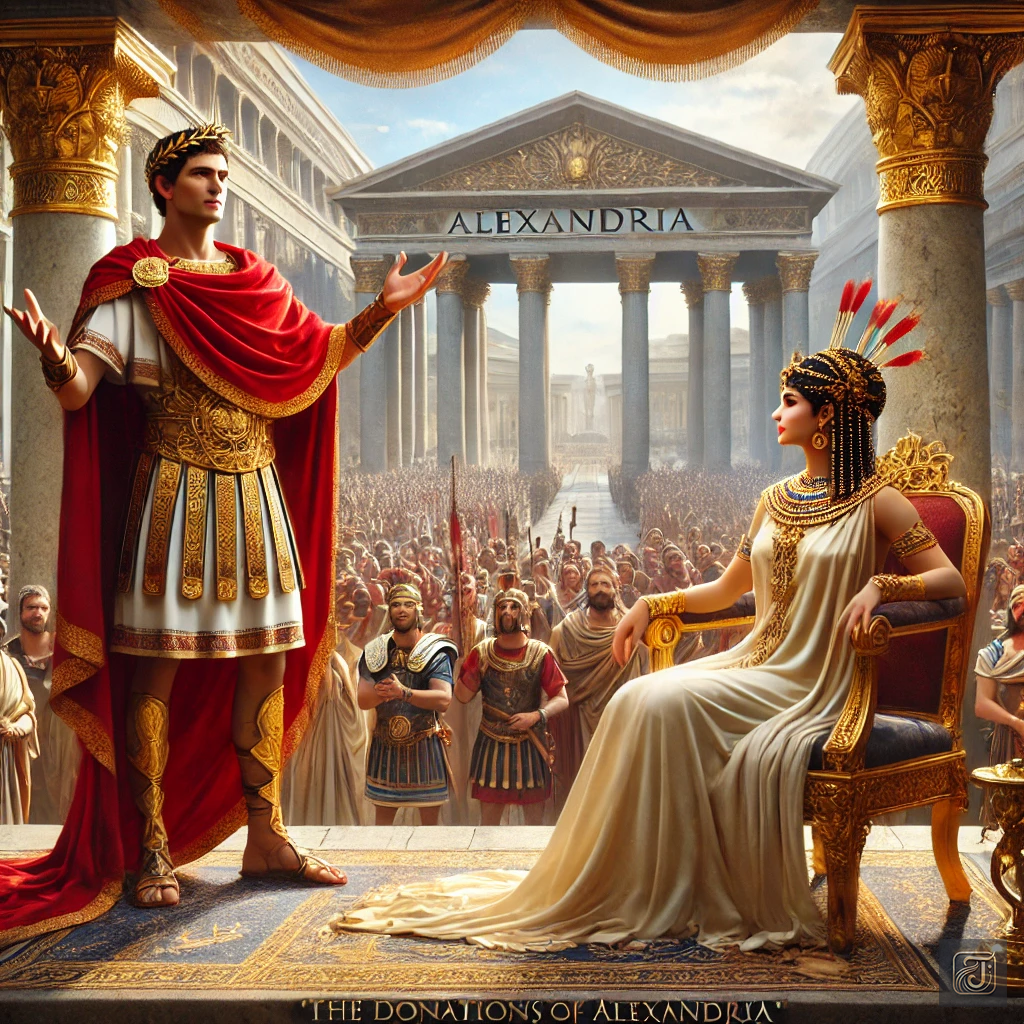
Antonius:
“To our son Alexander, I grant Armenia, Media, and Persia.”
“And to our daughter, Cleopatra Selene, I bestow the lands of North Africa.”
Seated upon a golden throne, Cleopatra watched over the ceremony, adorned in the garments of the goddess Isis.
With a serene smile, she waved to the gathered crowd, etching this moment into history as a powerful symbol of her reign.
However, this act provoked intense outrage in Rome.
Octavian, in particular, condemned Antonius for disregarding Roman traditions and acting solely for his personal gain.

Octavian:
“Antonius is a traitor manipulated by the Queen of Egypt!”
“At this rate, Rome’s wealth will continue to be exploited by the Queen of Egypt!”
As accusations echoed through the Senate, tensions between Rome and Alexandria escalated—an inevitable conflict was now on the horizon.
Chapter 17: Octavian’s Fury

Octavian:
“Antonius has trampled on the honor of Rome and disgraced my sister!”
“Do not think this will go unpunished!”
In the Senate chamber, Octavian’s voice thundered with fury as he denounced Antonius before the assembled senators.

Octavian:
“He has forgotten the traditions of Rome and is being manipulated by the Queen of Egypt!”
Roma senate:
“Is the Queen of Egypt trying to take control of Rome?”
As the Senate’s outrage against Antonius and Cleopatra grew louder, Octavian stepped onto the podium with calculated composure.
With unwavering confidence, he began to speak.
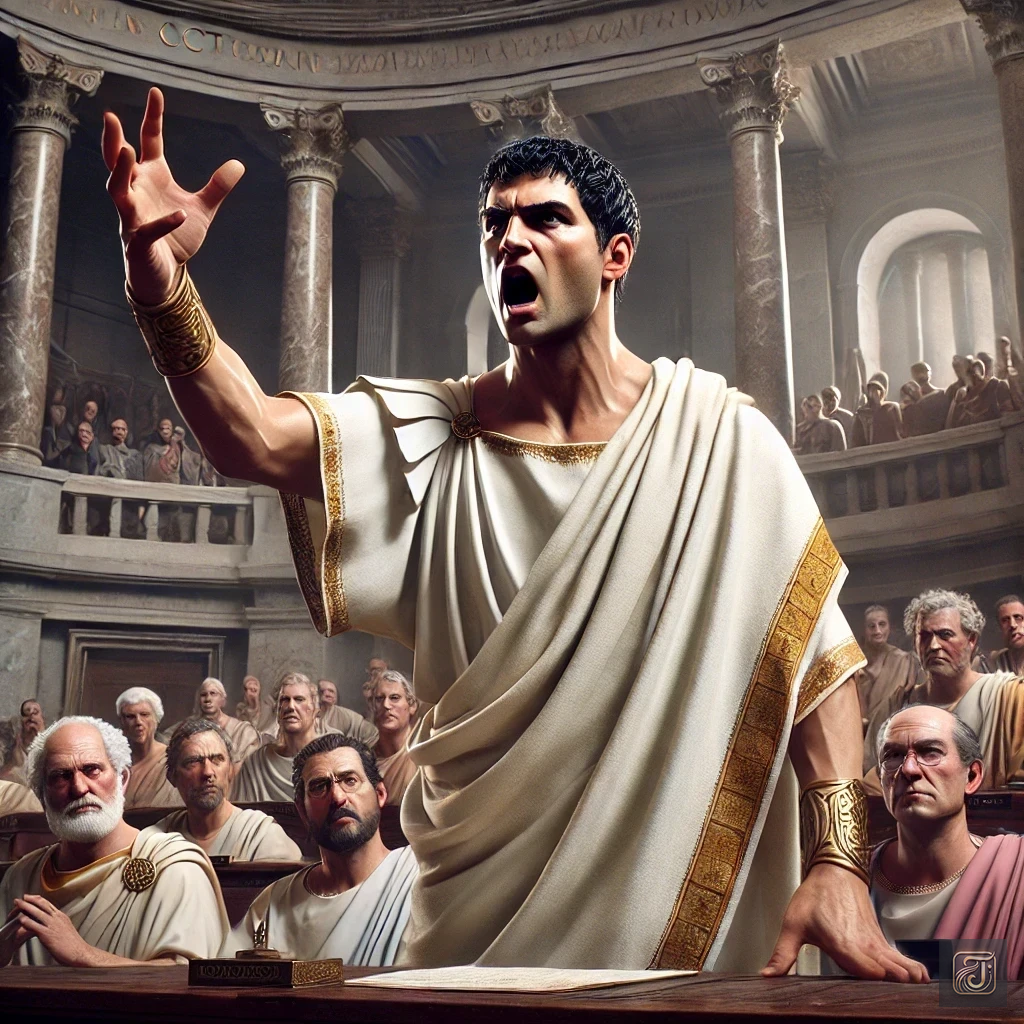
Octavian:
“Rome is now filled with corruption and betrayal!”
“And that is all because of Cleopatra, the Queen of Egypt, and Antonius, who is being manipulated by her!”
Octavian raised a document high for all to see—it was proof of the lands Antonius had granted to Egypt and its queen.
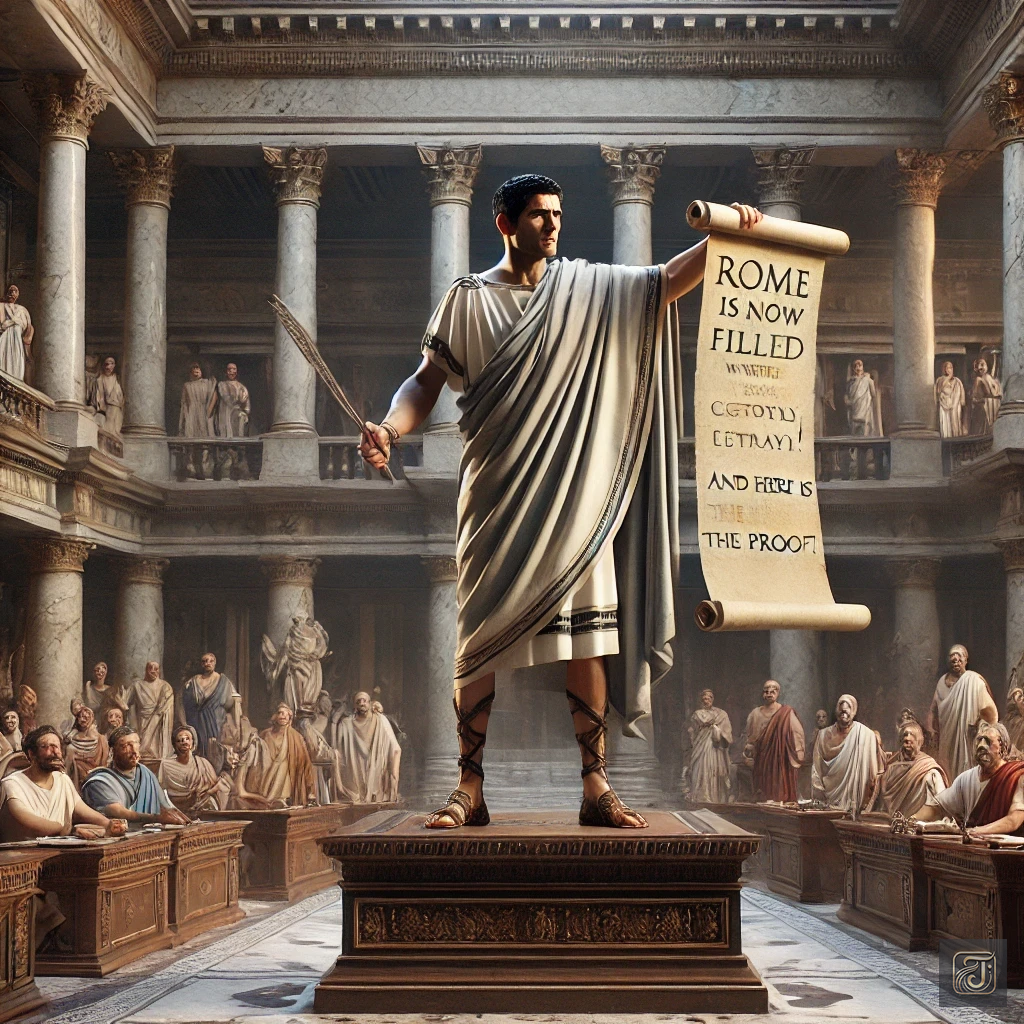
Octavian:
“Antonius has abandoned the authority of Rome and seeks to surrender our land to Egypt!”
“Will we stand by and allow this disgrace?”
Shouts of outrage erupted in the Senate chamber, voices of support rising in unison.
Yet, amidst the chaos, Octavian remained calm.
He understood one thing clearly—controlling this moment meant securing the future of Rome.
His words echoed beyond the Senate chamber, spreading throughout Rome, sealing the inevitable clash between Antonius and Octavian.
That night, in the quiet of his chambers, he addressed his closest advisors.
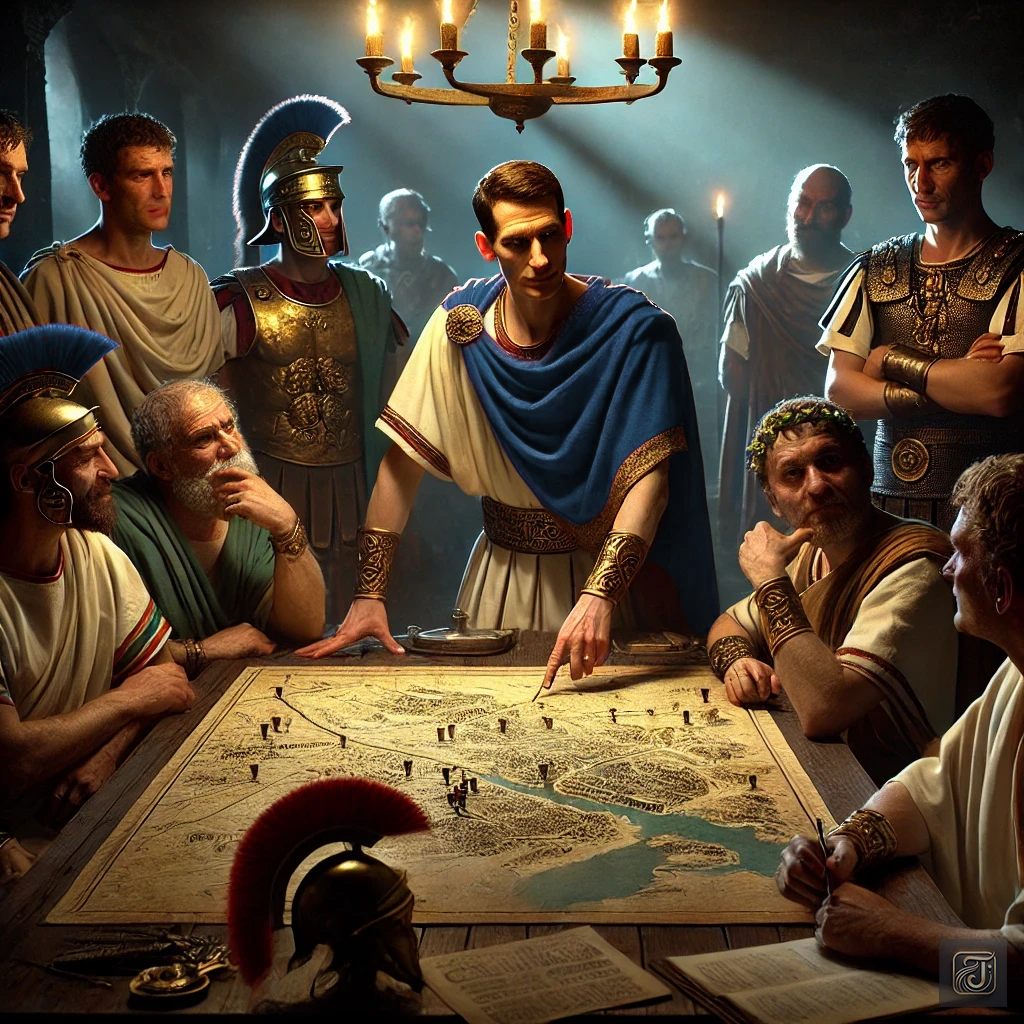
Octavian:
“Cleopatra is not just a queen.”
“She commands the wealth of Egypt and the military power of Antonius.”
“If we allow her to remain unchecked, Rome will be divided.”
Advisor:
“But if we invade Egypt, we risk turning the Roman people against us.”
Octavian:
“That is why we must present ourselves as champions of justice.”
“We will make the people believe that Cleopatra is a threat to Rome itself. “
“That is the path to our victory.”
Deep down, he was aware of his own precarious position.
His status as Caesar’s adopted heir, the Senate’s support, and his military strength—all of it could still be shaken.
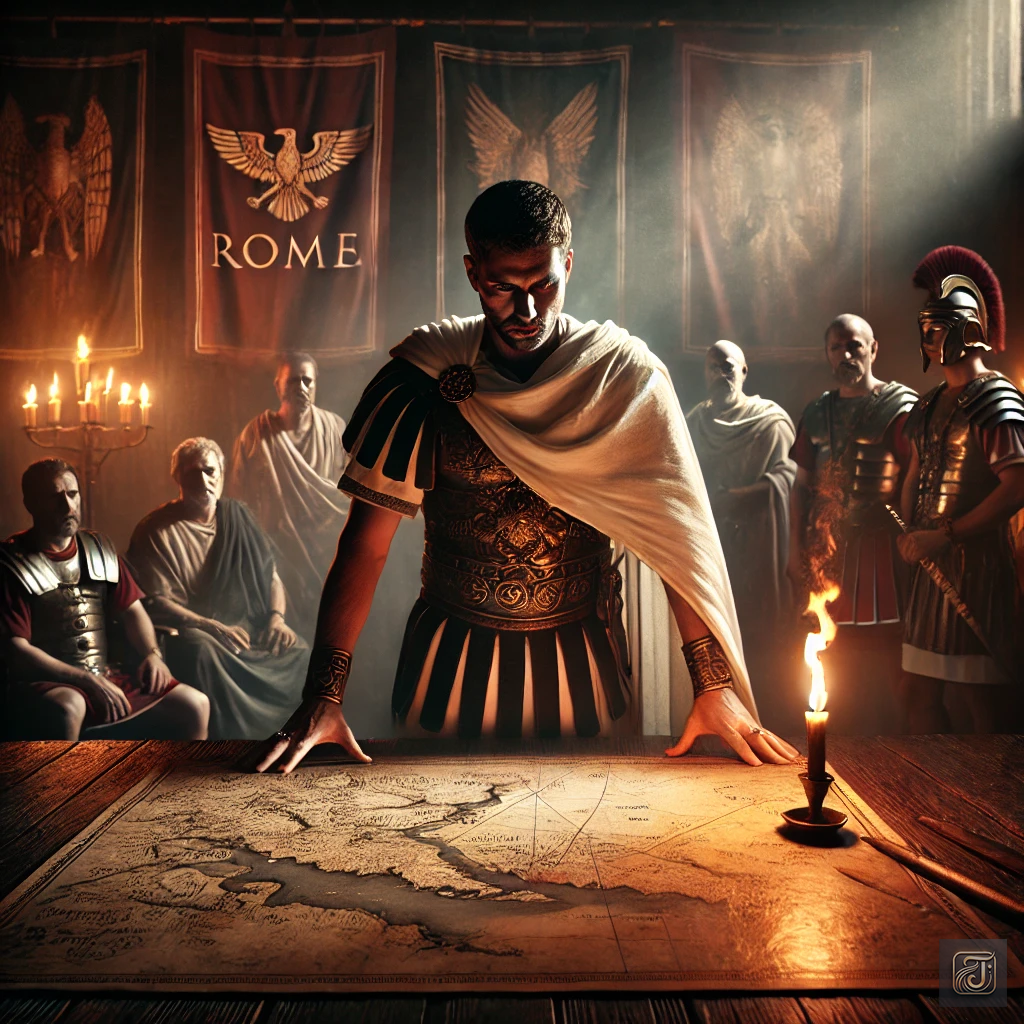
Octavian:
“To protect the future of Rome, I am willing to sacrifice anything.”
“This insult can only be repaid in blood.”
His voice carried a chilling resolve.
Octavian had made his decision—he would go to war against Antonius. He began preparing his forces, gathering soldiers and securing alliances.
At that moment, their fates were set into motion, and the final conflict drew ever closer.
Chapter 18: Antonius’ Rage and Vow of Revenge

When Octavian publicly denounced Antonius in the Senate, calling him “a traitor manipulated by the Queen of Egypt,” those words inevitably reached Antonius’ ears.
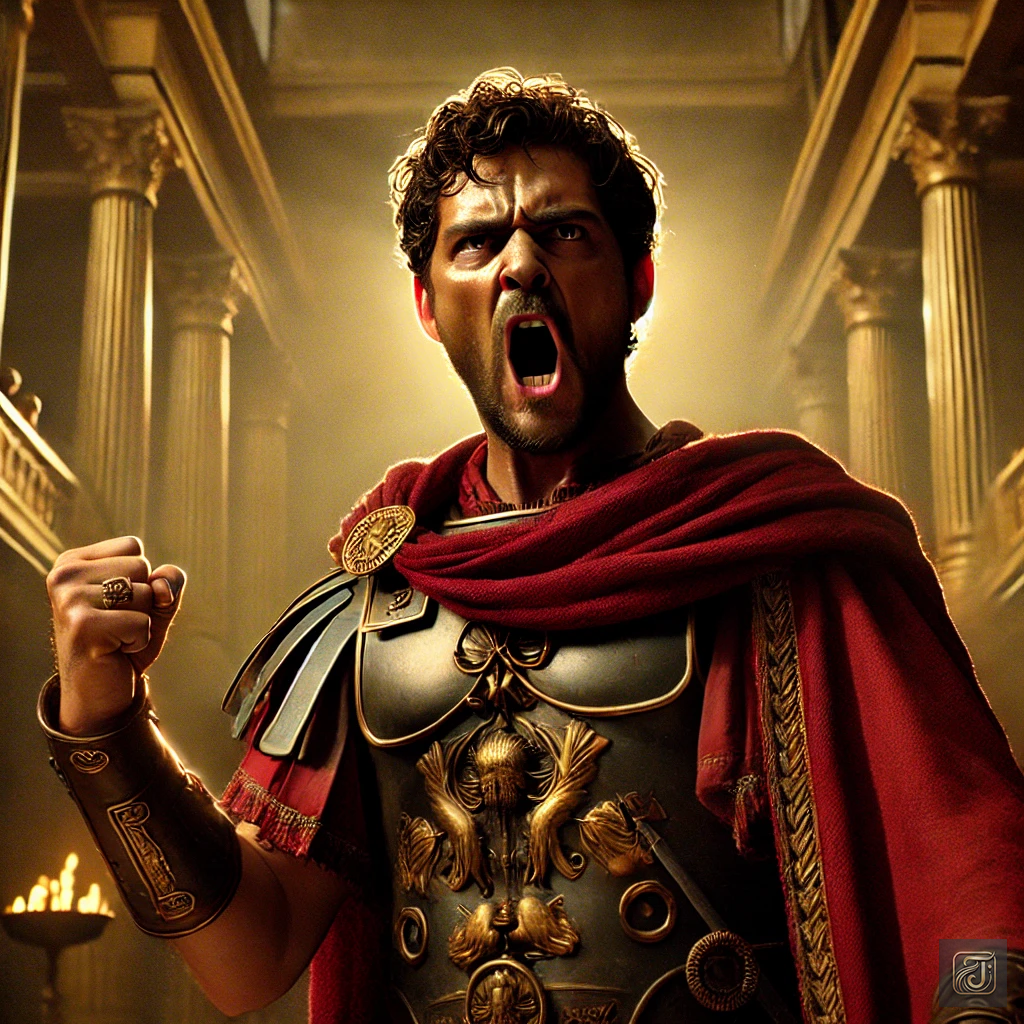
Antonius:
“He is not only insulting me but also defiling Cleopatra’s honor.”
Furious, Antonius stormed through the palace in Alexandria, his voice sharp and commanding as he addressed his officers.
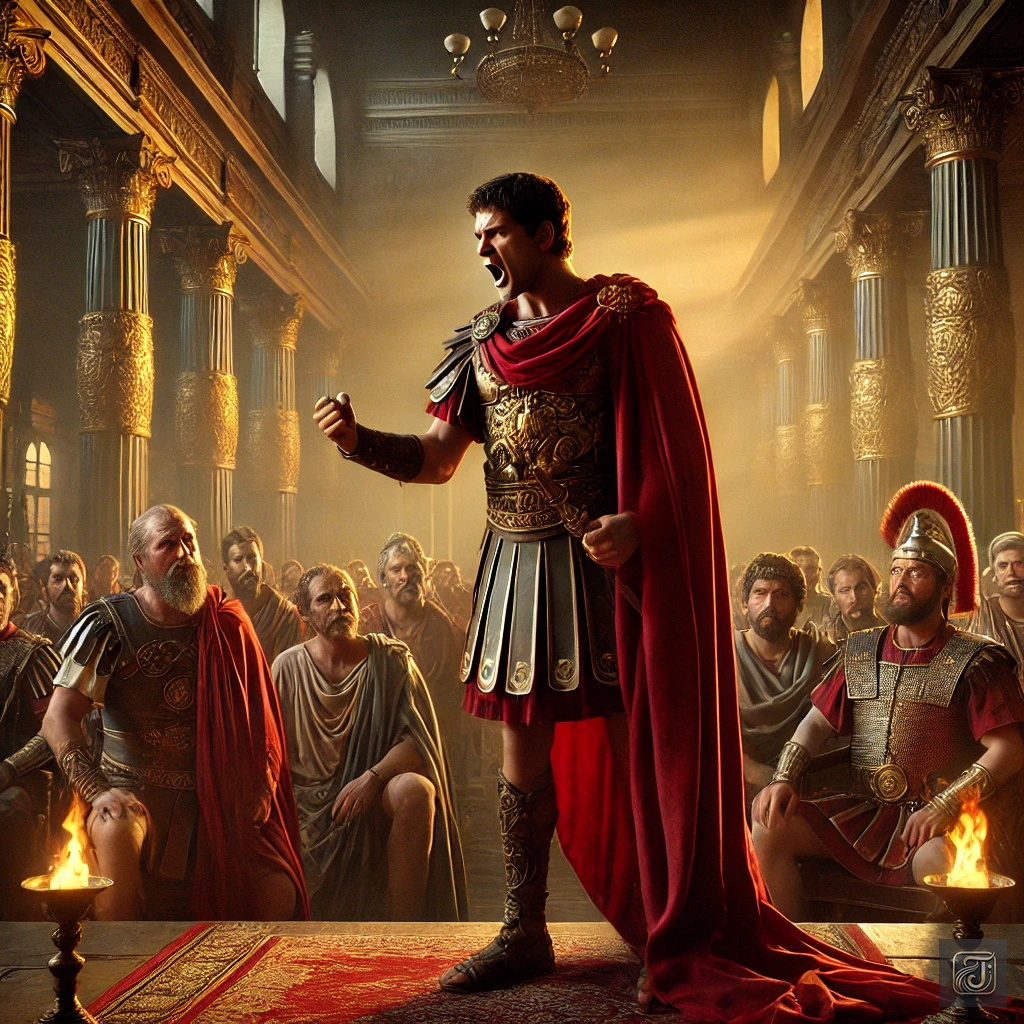
Antonius:
“Octavian is using Rome’s future as a shield to destroy us.”
“But I will not allow it.”
“I will have my revenge.”
Facing Cleopatra, Antonius made his vow with unwavering determination.

Antonius:
“Our alliance will crush his ambitions.”
“Together, we will lead Rome and Egypt into a shared future.”
Cleopatra VII:
“Antonius, as long as you stand by my side, I will keep fighting—to protect our dream.”
With their resolve united, they began devising a strategy, preparing for war with Egypt and Rome’s eastern territories as their stronghold.
Thus, the stage was set for a battle that would determine the fate of Rome and Egypt alike.

Cleopatra VII:
“Can I truly protect this land?”
Cleopatra murmured softly.
She stood in the palace courtyard, bathed in the gentle glow of the moonlight against her white robes.
The flickering torches of the colonnades cast wavering shadows, while their reflections shimmered faintly on the Nile’s surface.
The weight of safeguarding Egypt’s future pressed upon her heart, mingling with an unspoken fear of Rome’s overwhelming power.
From behind her, quiet footsteps approached.

Calixa:
“Your Majesty, are you all right?”
Cleopatra VII:
“Calixa, I am fighting to protect Egypt.”
“But sometimes, I wonder… if I have made the right choices.”
Her voice was quiet, yet beneath its softness lay a trace of uncertainty, a hesitation that even a queen could not fully conceal.
Calixa took Cleopatra’s hand in hers, her eyes earnest and unwavering as she spoke.

Calixa:
“Your Majesty, the people believe in you.”
“And so do we.”
Cleopatra VII:
“Thank you, Calixa.”
She whispered, then lifted her gaze once more, looking beyond the palace to the vast lands of Egypt stretching before her.
Yet, even as she stood tall, a faint unease still lingered in her heart that night.
Chapter 19: The Collapse of the Second Triumvirate

As the power struggle between Octavian and Antonius intensified, the fragile balance of the Second Triumvirate began to crumble.
Octavian consolidated his control over Rome and the western provinces, securing the unwavering support of the Senate and the Roman people.

Octavian:
“Lepidus is no longer of use.”
Octavian’s cold words sealed the fate of the third triumvir.
Lepidus was politically sidelined, leaving Rome’s dominance to be contested between just two men—Octavian and Antonius.
This escalating rivalry was further inflamed by the presence of Cleopatra, whose influence made the conflict even more volatile.
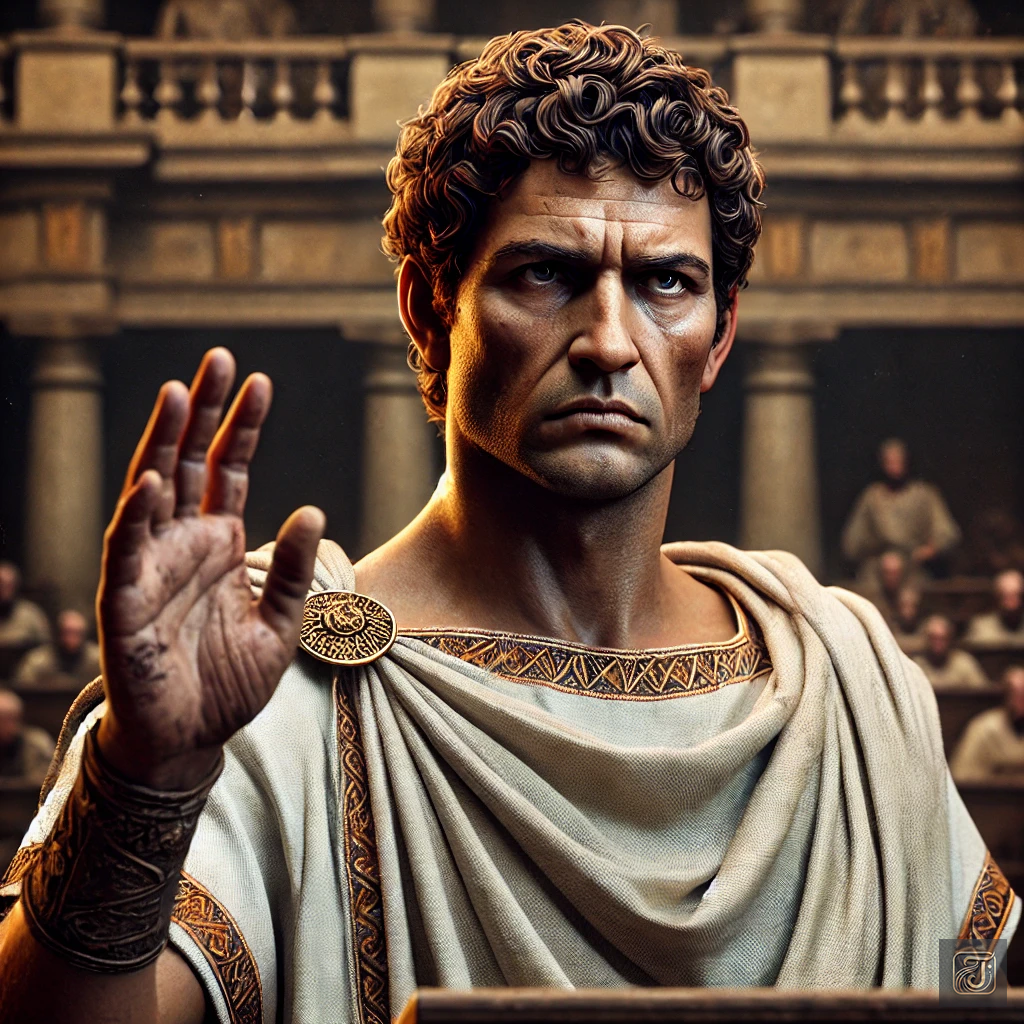
Octavian:
“Antonius has sold his soul to the Queen of Egypt.”
Octavian denounced him before the Senate, fueling the Romans’ growing anti-Egyptian sentiment.
The decisive battle for Rome’s future between Octavian and Antonius was fast approaching.
That night, upon hearing of Octavian’s public condemnation, Cleopatra stood alone in the courtyard of Alexandria’s palace.
The moonlight shimmered over the Nile, and she found herself recalling the vow she had made in her childhood.
Chapter 20: Return to the Vow of the Nile

In 31 BCE, on the eve of the Battle of Actium, Cleopatra stood alone in the courtyard of the palace in Alexandria.
The moonlight shimmered upon the flowing Nile, its gentle currents whispering softly in the night.
Slowly, she lowered herself to sit, her mind drifting back to the banks of the Nile, where she had once spent her childhood alongside her father, Ptolemy XII.

Cleopatra VII:
“Father, I will protect Egypt.”
“No matter what hardships may come.”
The voice of her younger self echoed vividly in her mind, as if reaching out across time to speak to the woman she had now become.

Cleopatra VII:
“Have I truly kept that vow?”
Doubt and the weight of responsibility swirled within her heart.
At that moment, soft footsteps approached from behind.
Her handmaid, Calixa, gently spoke, her voice filled with quiet reassurance.

Calixa:
“Your Majesty, are you here alone?”
Cleopatra VII:
“Yes, I had things I needed to think about on my own.”

Cleopatra VII:
“Calixa, do you remember the words I spoke on my wedding day?”

Cleopatra VII:
“I will protect this land, no matter the cost.”

Calixa:
“Of course, Your Majesty.”
“That vow still lives on, from the moment you returned to Alexandria and reclaimed your throne.”
Cleopatra VII:
“And yet, I am about to drag Egypt into the fires of war.”
“Even so, this battle is inevitable if I am to protect this land.”

Calixa:
“No matter the outcome, the people see you giving your all as the Queen of Egypt.”
Cleopatra took a deep breath, gathering her resolve beneath the moonlight, ready to face the destiny that lay ahead.

Cleopatra VII:
“I will protect this land, no matter the cost.”
“That is my vow.”
“And this battle is the moment to fulfill it.”
She gently pressed her hands together in silent prayer toward the Nile, reaffirming her resolve.
That night, with the determination to stand on the battlefield, Cleopatra turned and made her way back to the palace.
Chapter 21: The Battle of Actium

The sea was filled with countless ships, and the sky over Actium was thick with smoke and the cries of battle.
From the deck of Antonius’ flagship, he could see the impeccably organized formations of the Roman fleet.
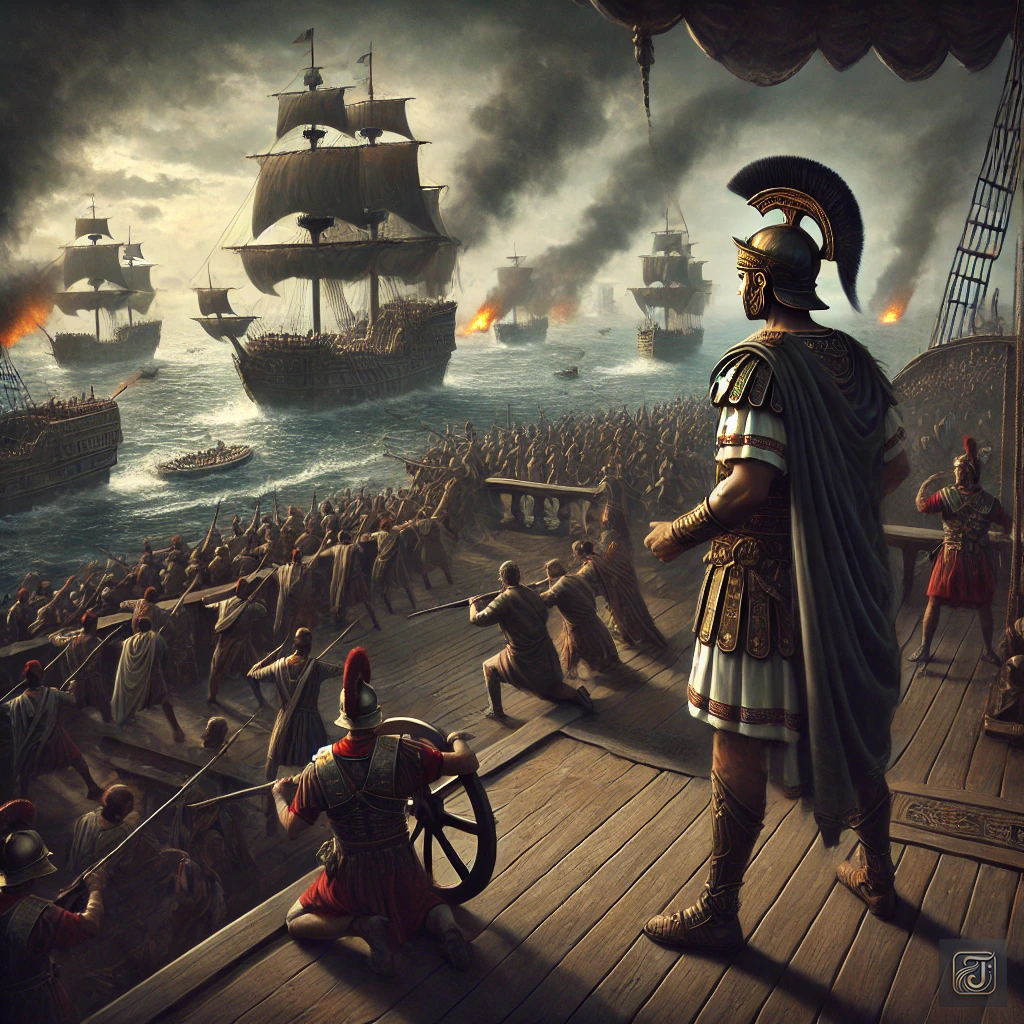
Meanwhile, General Agrippa of the Roman fleet remained calm and composed as he issued precise commands to his forces.
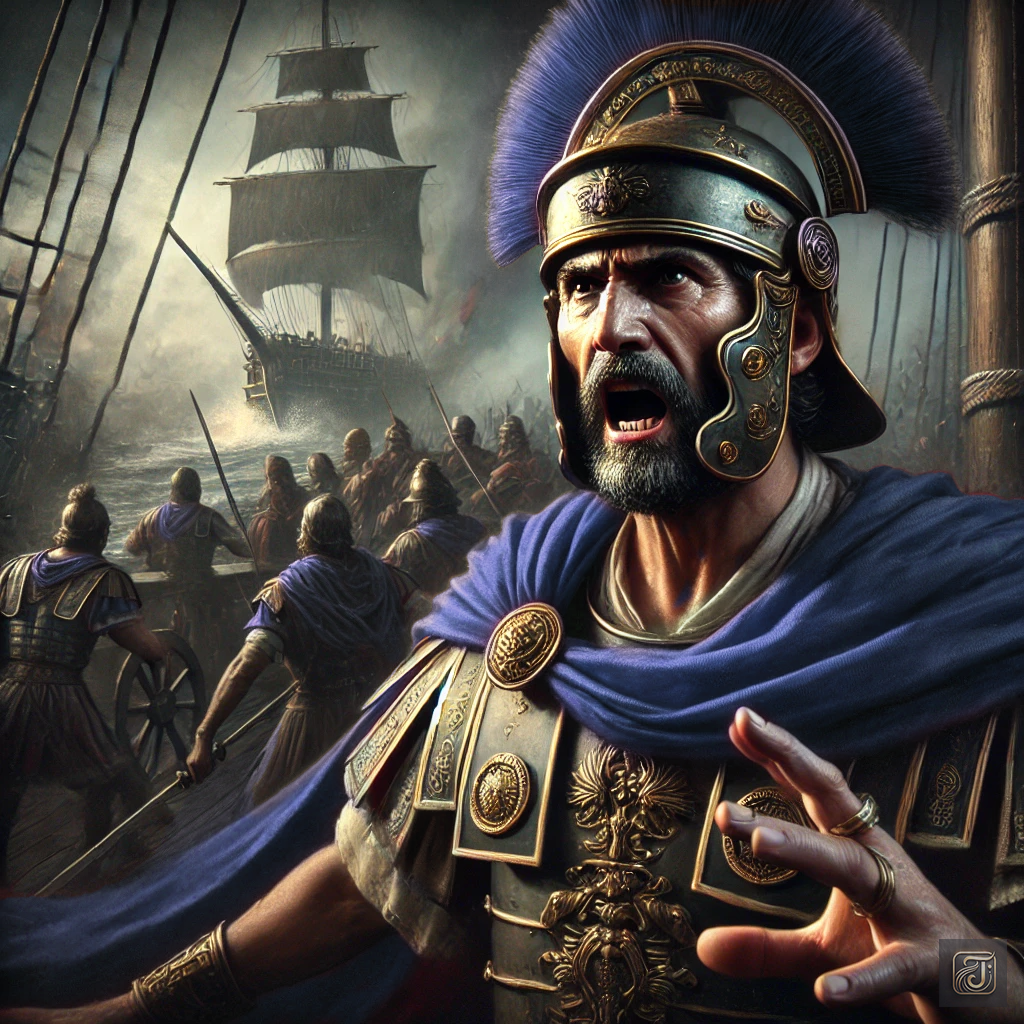
General Agrippa:
“Surround the enemy fleet from three sides.”
“Cut off their escape and wait for their supplies to run dry.”
As per Agrippa’s strategy, the Roman fleet slowly tightened its grip around the Egyptian ships, cutting off their retreat and pushing them into a desperate position.

Their fleet was divided into three formations.
The front line acted as a shield, absorbing the enemy’s attacks, while the rear ships unleashed a relentless barrage of arrows and fire, raining destruction upon Antonius and Cleopatra’s forces.

Officer:
“Lord Antonius!”
“The enemy fleet is concentrating on our left flank!”
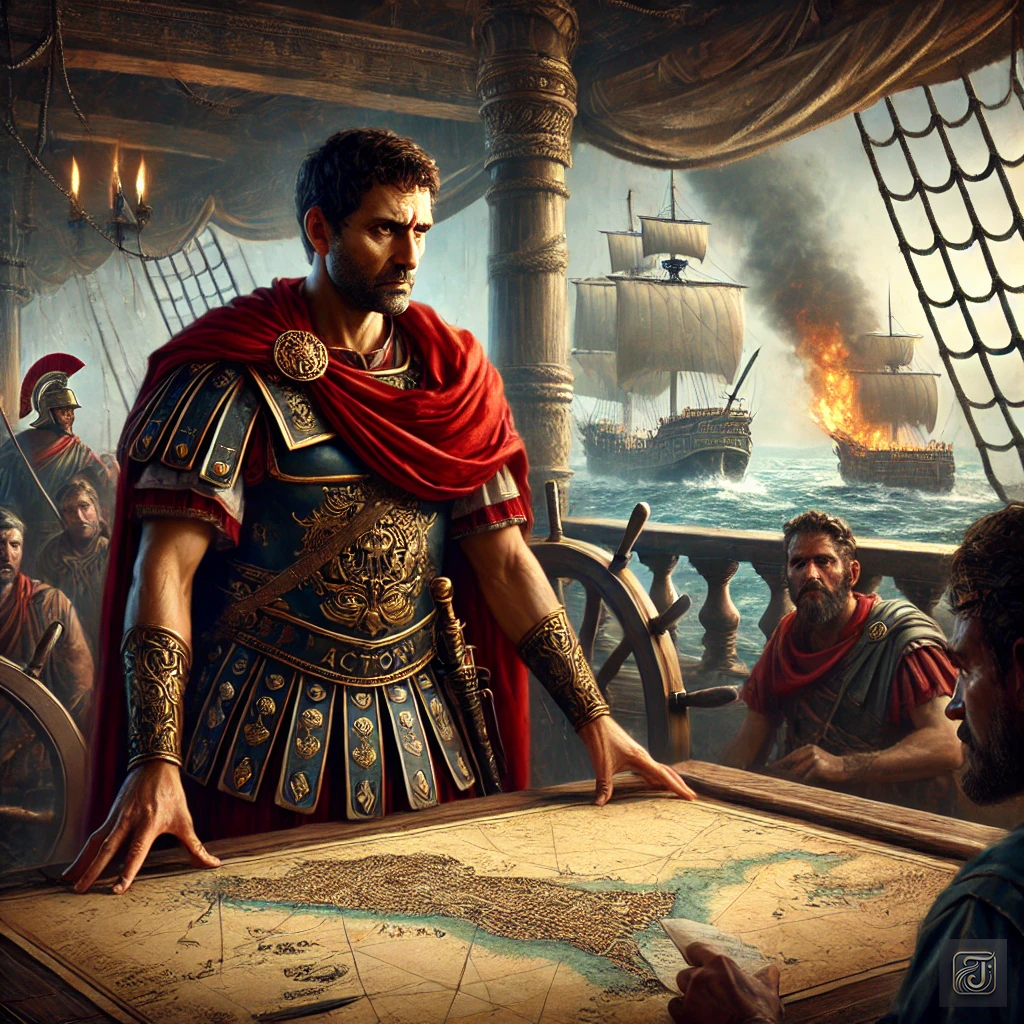
Antonius:
“Reorganize the ships on the left flank!”
“Form a pincer movement and trap them—do not let them retreat!”

The moment Antonius gave his order, the left flank erupted into fierce combat.
Egyptian archers launched flaming arrows, setting Roman ships ablaze.
However, the Roman fleet responded swiftly, cutting loose the burning vessels to contain the damage and minimize their losses.

Cleopatra’s fleet remained stationed at the rear of the battlefield, watching the unfolding chaos as the fight raged on.

Her ship, adorned with golden embellishments, radiated the majesty of the Queen of the Nile.
Yet, beneath that regal exterior, a flicker of anxiety crossed Cleopatra’s face.

Calixa:
“Your Majesty, our supply of arrows is nearly depleted!”
At Calixa’s urgent report, Cleopatra swiftly turned to her crew and issued a command.

Cleopatra VII:
“Maintain the supply lines!”
“If we don’t break their encirclement, we cannot win this battle!”
Cleopatra could feel the grim reality settling in—the tide was turning against them.
Their forces were outnumbered, their morale waning, and the battle was gradually slipping from their grasp.
Meanwhile, on the battlefield, Octavian remained composed.
He rallied his troops while continuing to issue calculated, ruthless orders to ensure his inevitable victory.

Octavian:
“The enemy is outnumbered, but Cleopatra’s fleet still holds ample supplies.”
“If we destroy their resources, they will collapse on their own.”

Octavian:
“Encircle their fleet.”
“Leave them no escape.”
“This is my duty.”
“I will win this war and unify Rome.”
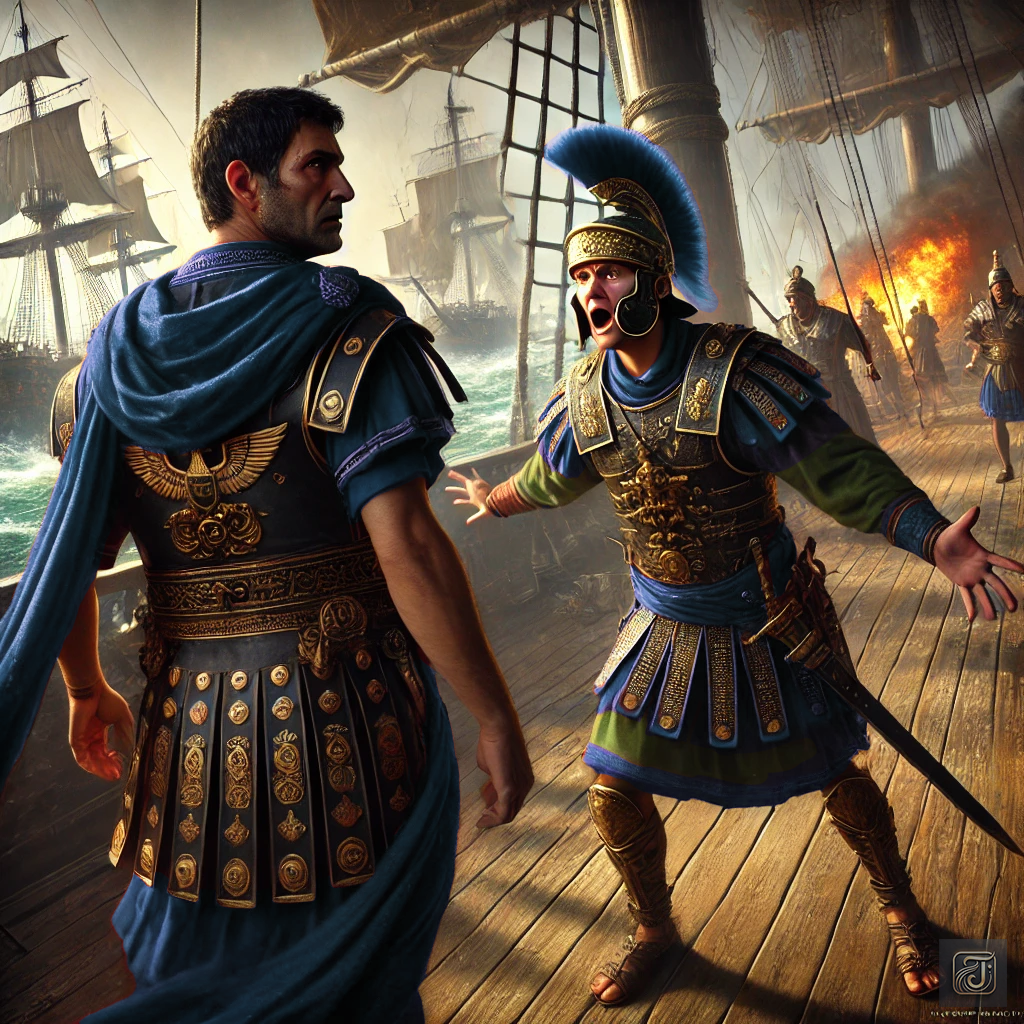
Officer:
“Commander, the enemy fleet is beginning to retreat!”
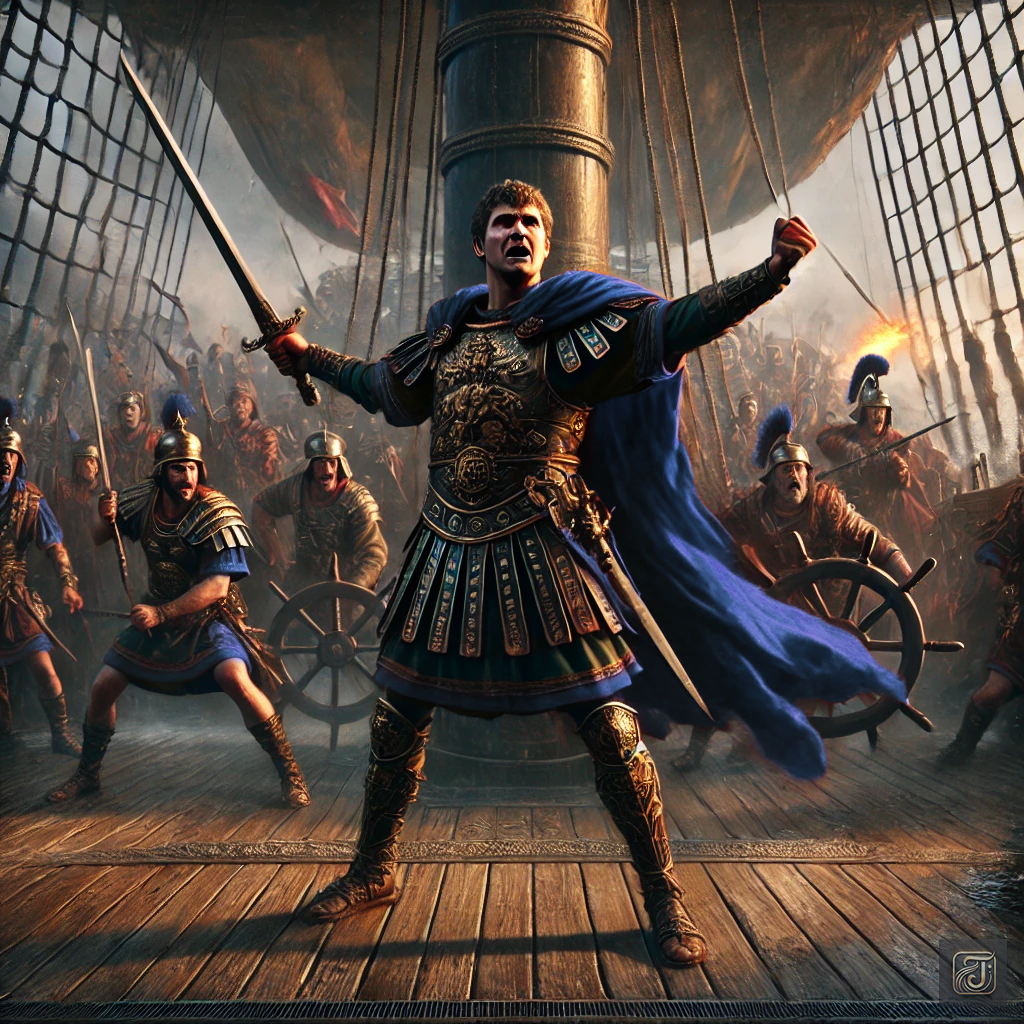
Octavian:
“Do not let them escape!”
“End it here!”
As the battle raged on, Antonius’ flagship broke through the enemy’s center.
Drawing his sword, he raised his voice, rallying his soldiers for a final stand.
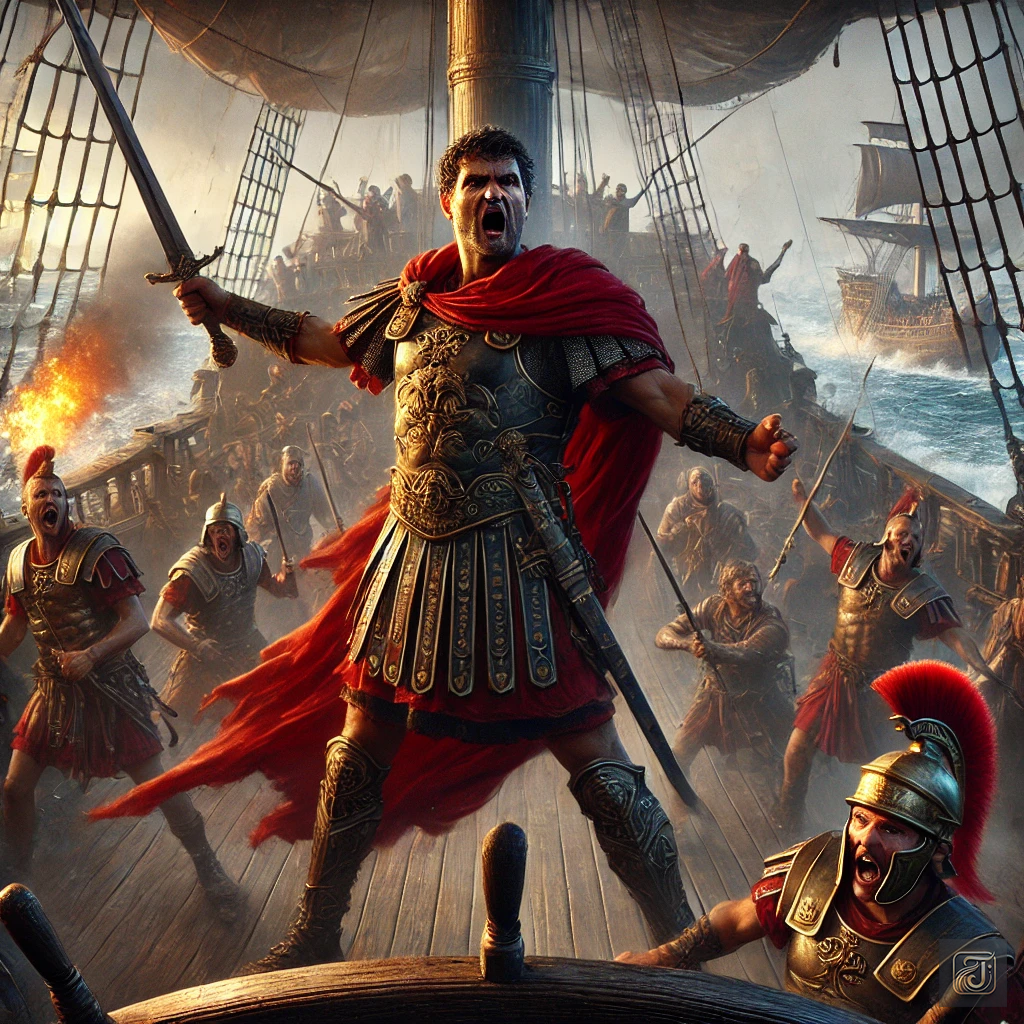
Antonius:
“Fight for Egypt!”
“This is our last stand!”
But Antonius’ ship could not break through the enemy’s encirclement.
Arrows and spears rained down like a relentless storm.
Thick smoke from burning ships choked the sky, while the anguished cries of wounded soldiers pierced the air.

Antonius:
“Order a full retreat!”
Antonius’ voice rang out, but the battlefield had already descended into chaos.
From Cleopatra’s flagship, the dire state of the battle was painfully clear.
Watching from her ship, she grappled with the weight of Egypt’s fate, desperately searching for a way forward.

Cleopatra VII:
“At this rate, we will be annihilated…”

Calixa:
“Your Majesty, the preparations for retreat are complete.”
“If we stay, we will be utterly destroyed.”
“We must withdraw…”
Cleopatra VII:
“Yes, I know but…”

Calixa:
“It is easy to give one’s life for a lost battle.”
“But surviving to protect the future—that is far more difficult.”
Cleopatra VII:
“Thank you, Calixa.”
“Your words have saved me.”
Cleopatra closed her eyes, holding her breath for a brief moment.
Then, as if sealing her resolve, she opened them once more—her decision made.

Cleopatra VII:
“Order a full retreat.”
“We must return to the Nile and devise our next move.”
Her voice carried unwavering determination, yet the decision left a deep scar upon her heart.
As the order was given, the fleet began its chaotic withdrawal.
With resolute action, Cleopatra led her forces away from the battlefield.
From her ship, she watched the unfolding battle—the overwhelming enemy numbers, her own soldiers exhausted and struggling.
A single question echoed in her mind.

Cleopatra VII:
“Is this battle futile?”
“Am I truly making the right choice to protect Egypt’s future?”
She tried to shake off the thought, but the doubt lingered.
Even after ordering the retreat, a deep sense of guilt weighed on her heart.

Cleopatra VII:
“Did I flee… or was this truly the best choice for Egypt?”
Alone in her cabin, Cleopatra wept in silence.
Though she maintained her queenly dignity before others, in solitude, she could not hide the fragility of being human.

Antonius:
“Cleopatra is retreating.”
“Has something happened to her?”
“After her! We must catch up!”
Upon witnessing Cleopatra’s withdrawal, Antonius, consumed by panic and desperation, abandoned his army and left the battlefield, setting sail in pursuit of her.
With their commander deserting them, Antonius’ troops lost faith and began surrendering en masse to Octavian’s forces.
This complete breakdown led to the total defeat of Antonius’ army.

Historical Background: The Battle of Actium (31 BCE)
The Battle of Actium was the pivotal clash between Octavian (the future Emperor Augustus) and the allied forces of Mark Antony and Cleopatra.
This battle not only determined the fate of the Mediterranean world, but it also marked the end of the Ptolemaic Kingdom and the fall of Egypt as an independent power.
Why Did Cleopatra Retreat from Actium?
1. Deteriorating Battle Conditions
・Antony and Cleopatra’s forces were outnumbered and strategically disadvantaged.
・Many of their own soldiers had already defected to Octavian’s side.
・Seeing that defeat was inevitable, Cleopatra chose to withdraw rather than perish in battle.
2. Prioritizing Egypt’s Future
・Cleopatra’s ultimate goal was to preserve Egypt.
・Fighting to the death in a losing battle would have served no purpose.
3. Ensuring Her Own Survival
・If captured, Cleopatra would likely have been executed or paraded through Rome in humiliation.
・Her survival was the only chance for Egypt to endure.
4. Preparing for a Prolonged Struggle
・Cleopatra’s fleet carried supplies, treasure, and resources, all crucial for future battles.
・Rather than risk complete destruction, she chose to retreat and regroup for another fight.
The Consequences of Cleopatra’s Retreat
・Upon seeing Cleopatra’s fleet withdraw, Antonius abandoned his forces and chased after her, leaving his army leaderless.
・This shattered the morale of his remaining troops, leading many to defect to Octavian.
・With Antonius’ army in ruins, Octavian secured victory, ultimately claiming Rome’s sole dominance.
This decision would set the stage for the tragic final chapter of Antony and Cleopatra’s lives in Alexandria.
Chapter 22: Antonius’ Last Stand
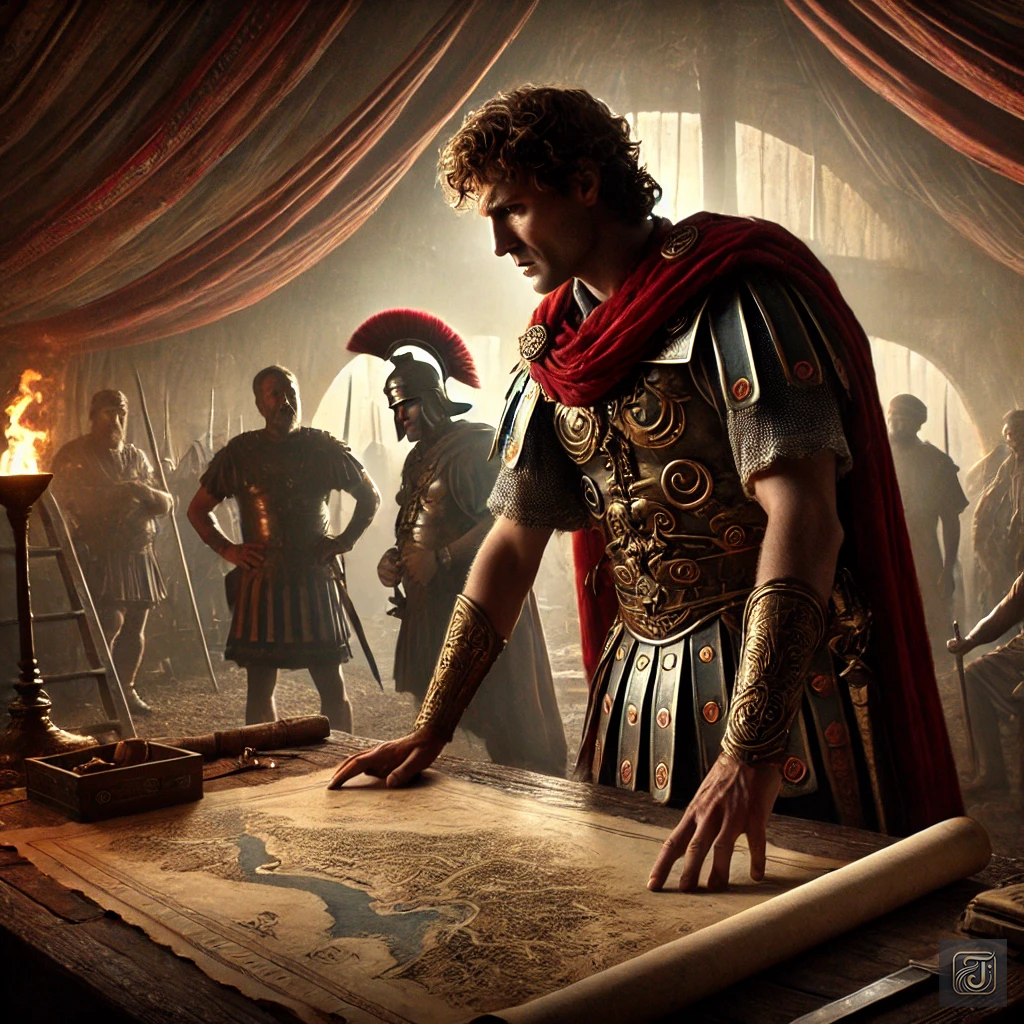
Upon returning to Egypt, Antonius immediately began strategizing to establish defensive positions for Egypt’s final stand.
There was no time to dwell on the shock of defeat—he had to prepare for Octavian’s inevitable advance.

Antonius:
“We must rebuild our forces immediately.”
“The battle is not over yet.”
Antonius summoned his generals, devising a plan to recruit soldiers from across Egypt to strengthen their defenses.
Despite the crushing defeat at Actium, his eyes once again burned with determination.
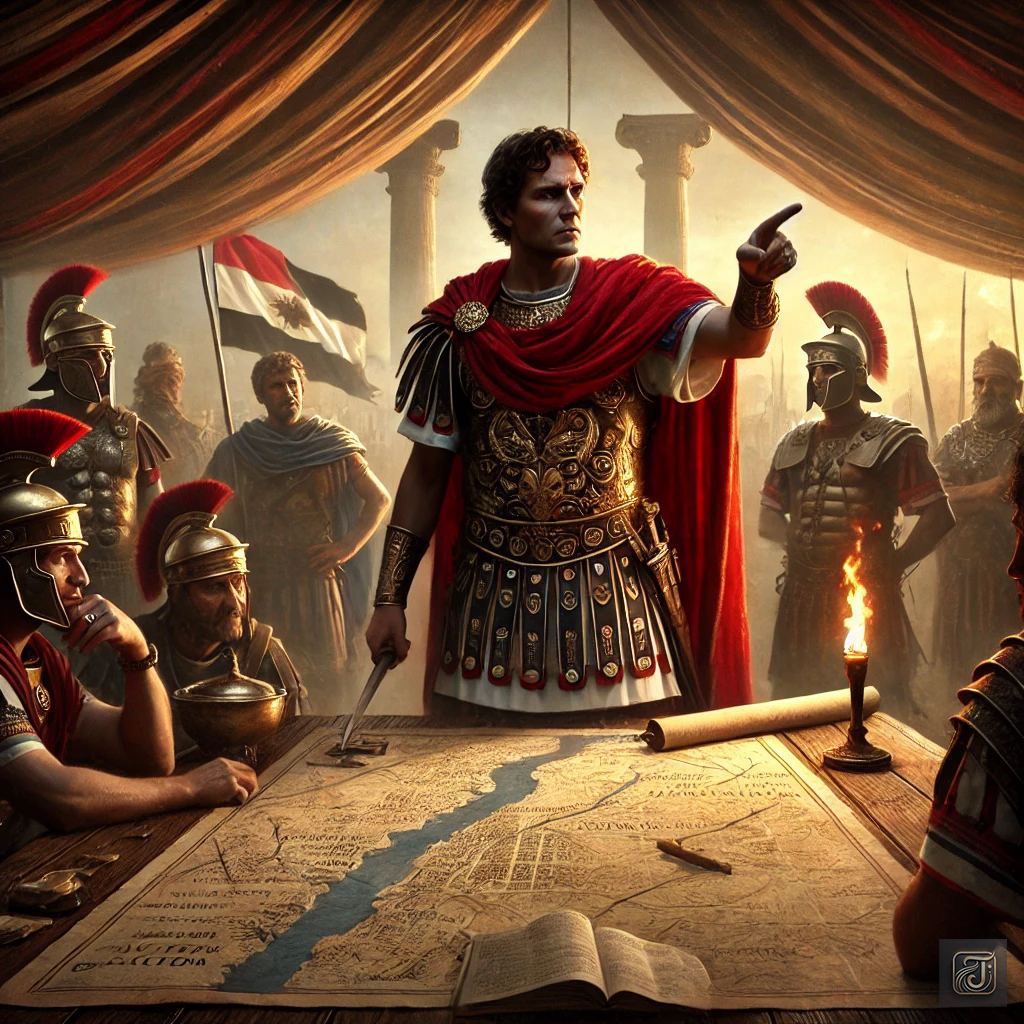
Antonius:
“It is up to us to protect Egypt from Rome’s threat.”
“We cannot allow this land to fall.”
Spreading out a map before him, Antonius meticulously outlined troop deployments and supply routes, issuing precise orders to fortify Egypt’s defenses.
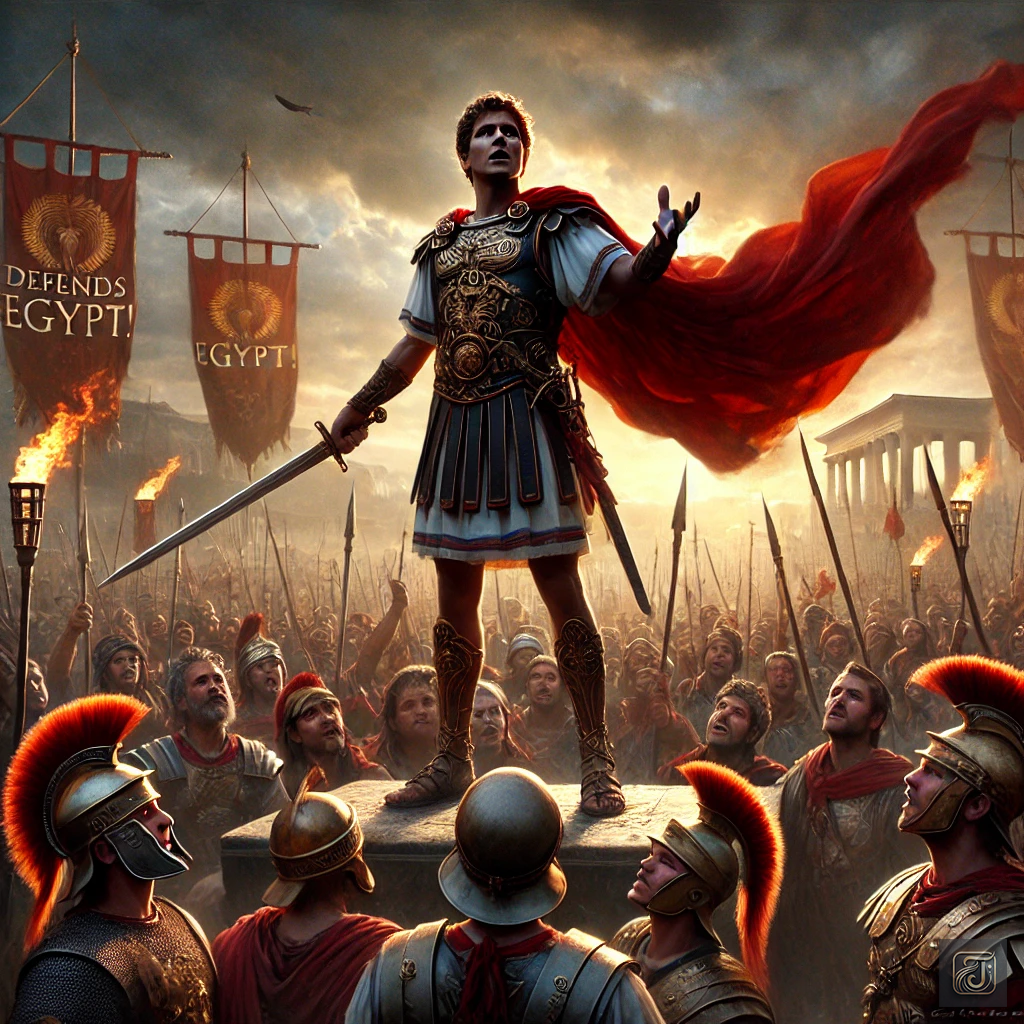
Rebuilding the Army
Antonius recalled Egypt’s garrisons, gathering all available forces.
He also commandeered supplies from farmers and merchants to sustain his troops.
To test their loyalty and reignite their fighting spirit, he delivered a powerful speech.
Antonius:
“We are the shield that protects Egypt. “
“And if anyone dares to break this shield, we shall become the sword that delivers their judgment!”
His soldiers, stirred by his words, rose in renewed determination.
Though the shadow of defeat still loomed, the bonds of unity—once shaken—began to mend.
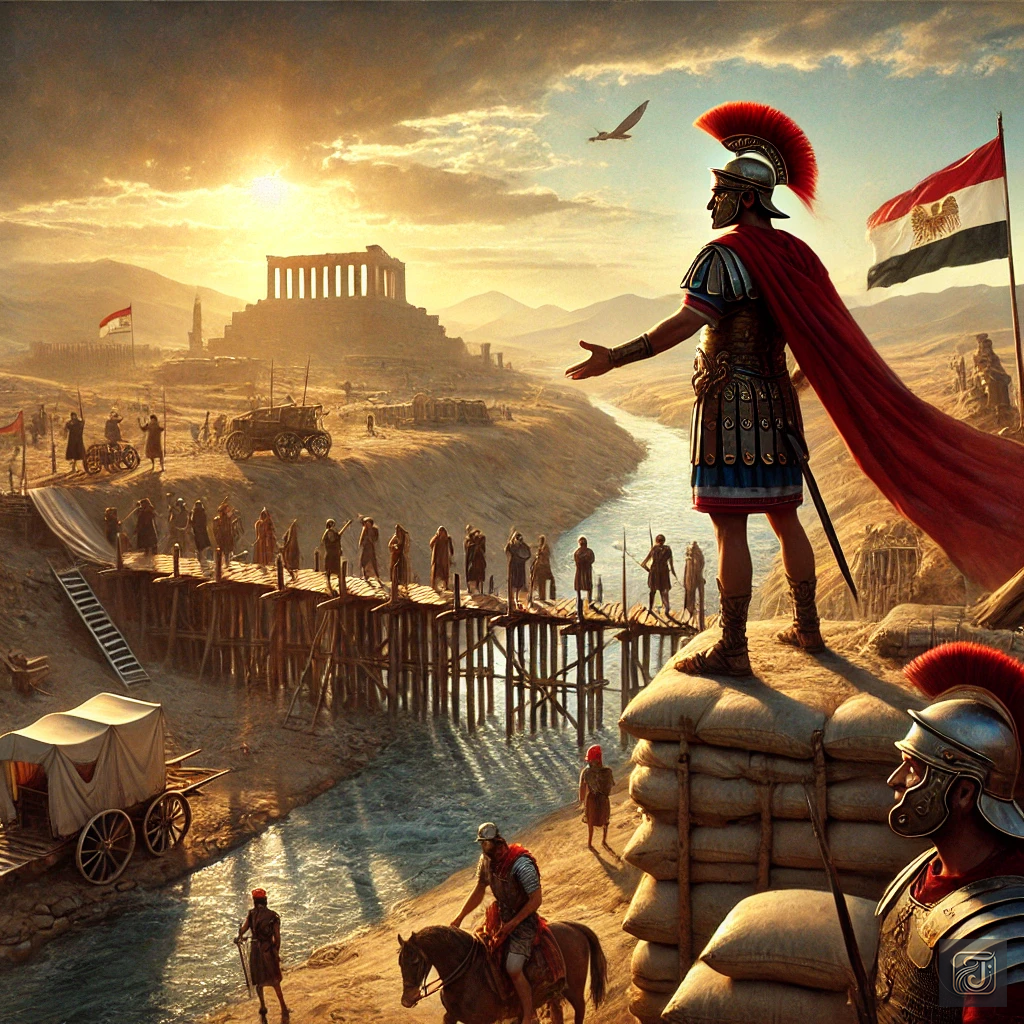
At the same time, Antonius focused on fortifying key strategic locations to defend Egypt.
He ordered the construction of small fortresses along the Nile, aiming to slow the enemy’s advance and force Octavian’s troops into prolonged engagements.
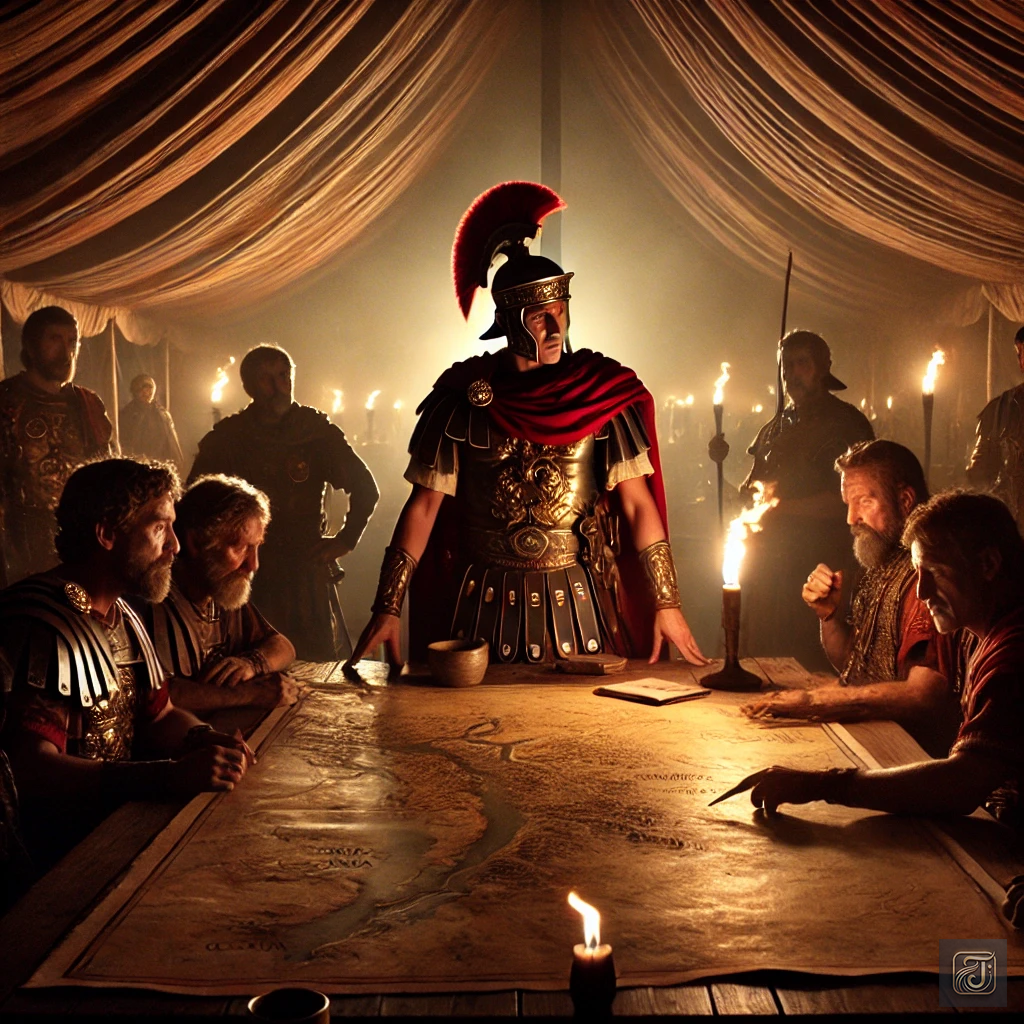
Strategic Council
One night, Antonius convened a war council with his generals.
They studied the map, analyzing enemy movements and refining the defensive lines to counter Octavian’s inevitable advance.
Antonius:
“Octavian will likely march overland, but we must also prepare for a possible naval assault.”
“Fortify Alexandria’s defenses with multiple layers of protection.”
Generals:
“We must also strengthen the Nile’s defenses to secure our supply lines.”
Antonius:
“You’re right.”
“The Nile is Egypt’s lifeline.”
“If we lose control of it, we lose the war.”
With calm precision, he reinforced Egypt’s defensive network and intensified the training of his soldiers, preparing for the battle ahead.
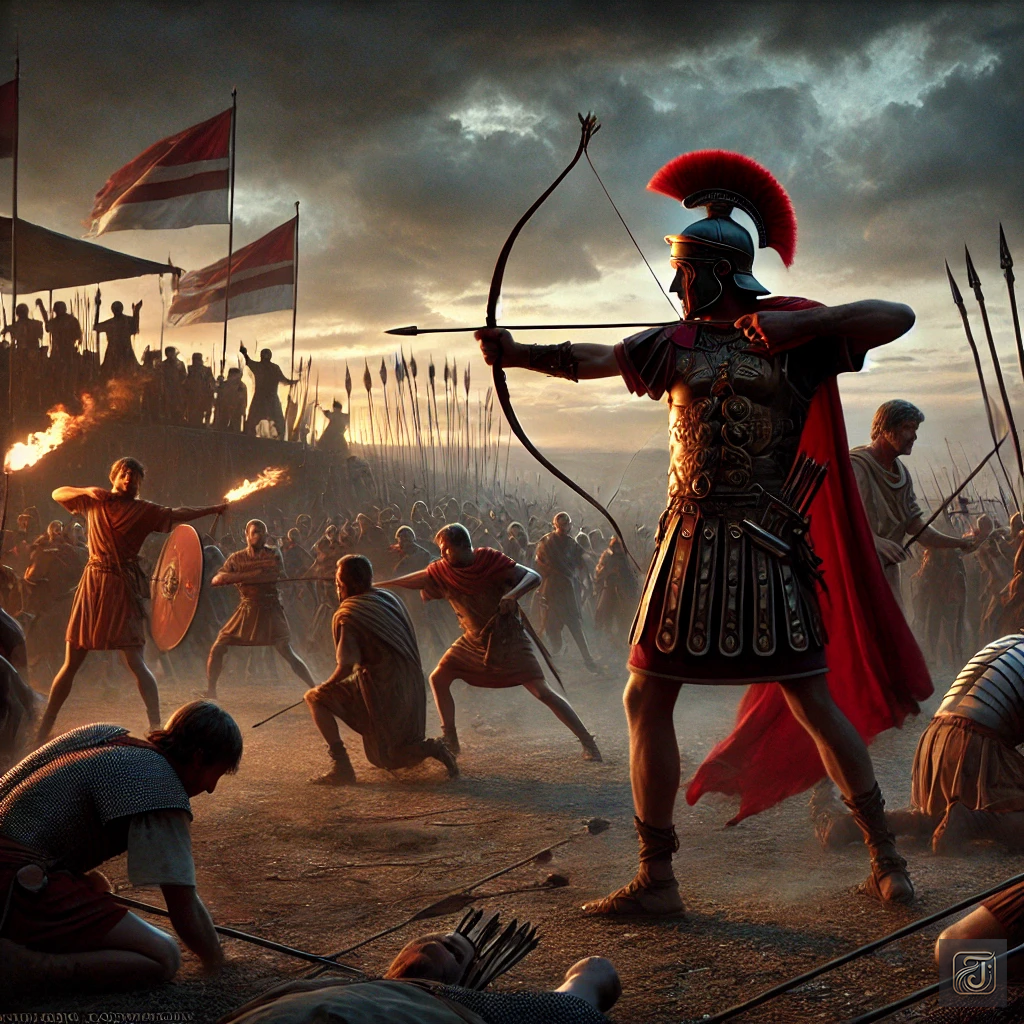
Preparing for Battle
Under Antonius’ command, the soldiers trained relentlessly day and night.
Archery drills, spear exercises, and tactical formations were repeatedly practiced to hone their skills.
At the same time, Antonius took steps to restore his soldiers’ trust.
He ate the same humble rations as his troops and personally joined their training, proving his loyalty and dedication to them.
Through these actions, the bond between Antonius and his men slowly began to mend.
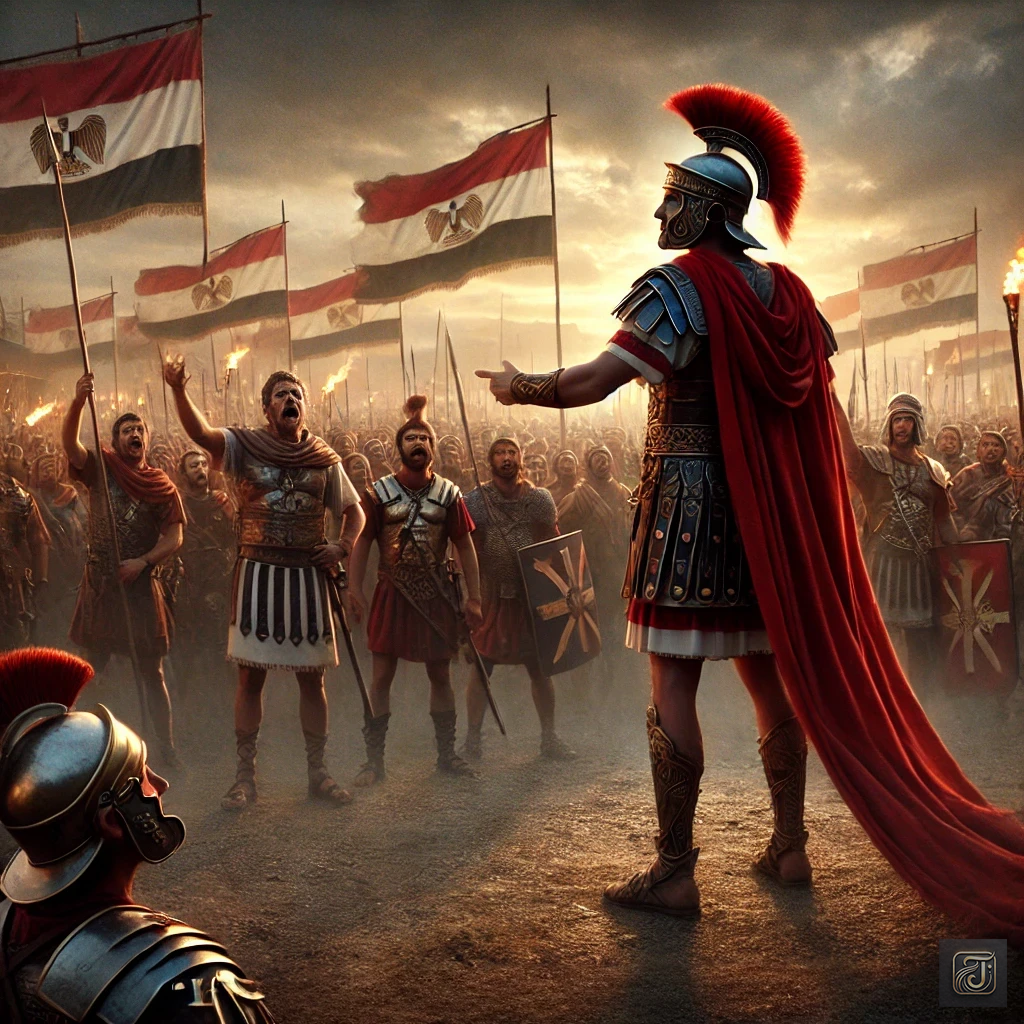
soldiers:
“If our general fights alongside us, then we will follow him to the end!”
Among the ranks, more and more soldiers renewed their oath of loyalty to Antonius, their morale rising once again.
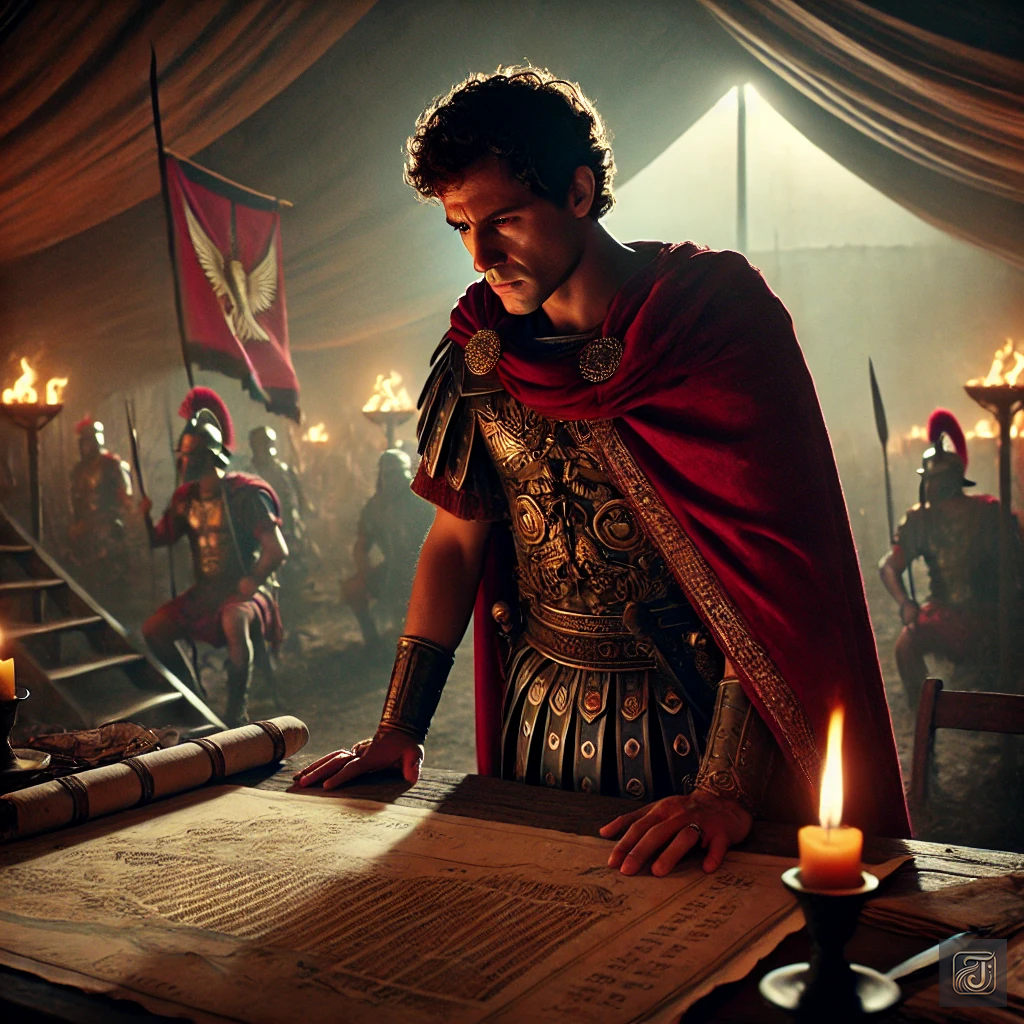
Before Reuniting with Cleopatra
Antonius deliberately postponed his meeting with Cleopatra.
More than his desire to see her, his priority was to protect her—to prepare for the battle that would soon come against Octavian’s advancing forces.
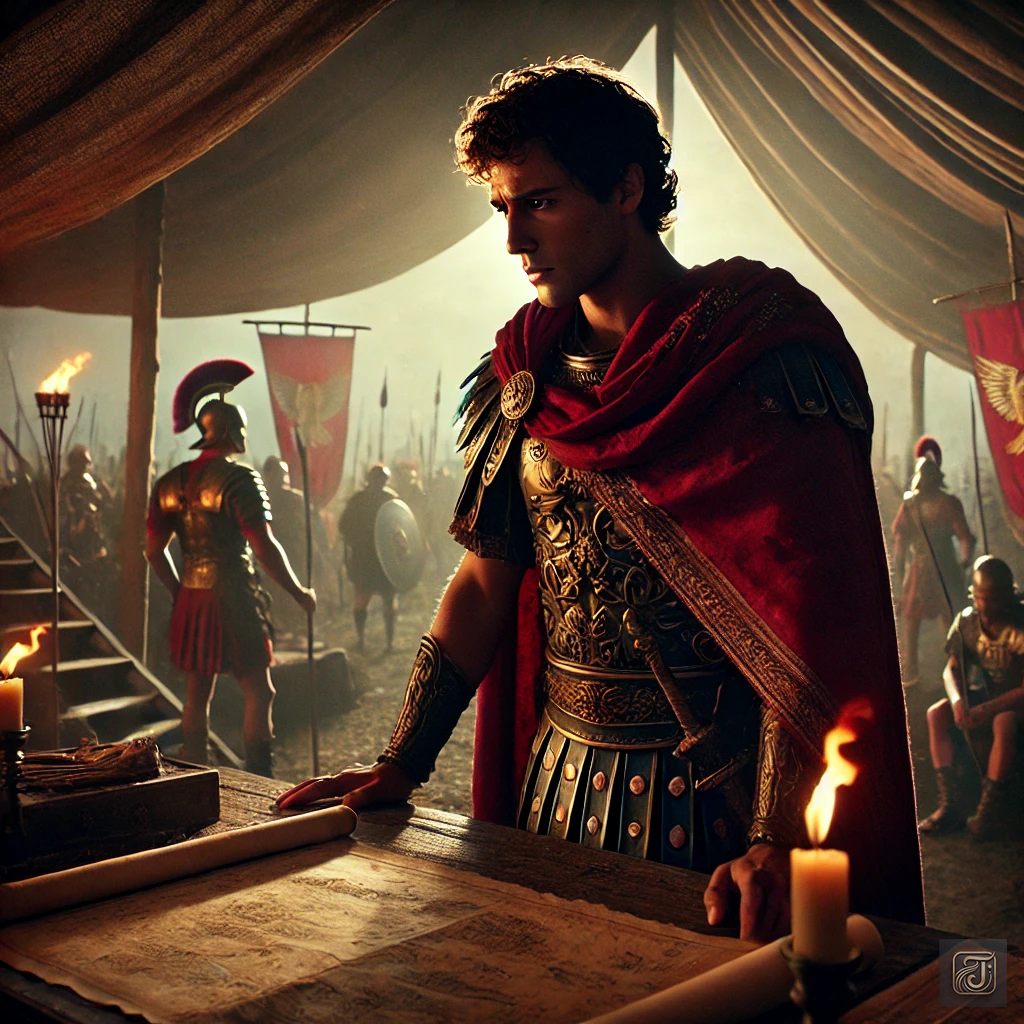
Antonius:
“First, I must rebuild our army and prepare to defend this land.”
“There is no time to see her now.”
“If we lose this battle, I will lose both her and Egypt.”
“That is something I will not allow.”
“This is my duty.”
Antonius remained in his camp, fully dedicating himself to the preparations for the coming battle.
Yet, deep within his heart, he longed for Cleopatra.
No matter how much he tried to focus, not a single moment passed without thinking of her.
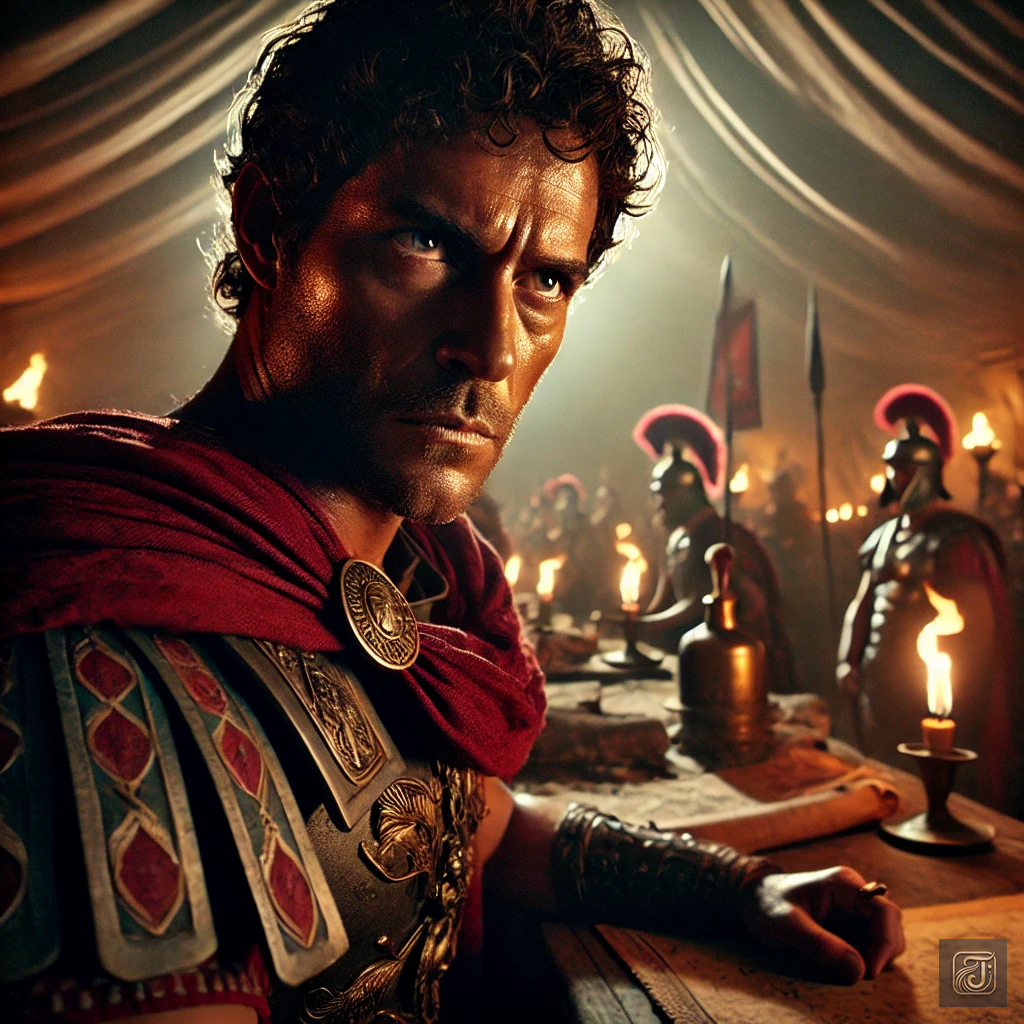
Antonius:
“For her, I will rise once more.”
“I will win this battle and go to her. “
“Wait for me, Cleopatra…”
With renewed pride as a warrior, Antonius forged ahead, preparing to face Octavian’s army in what would be the decisive battle of fate.
At that moment, the final confrontation was upon them—a battle that would seal the destiny of Egypt, Rome, and their love.
Chapter 23: Octavian’s Proposal
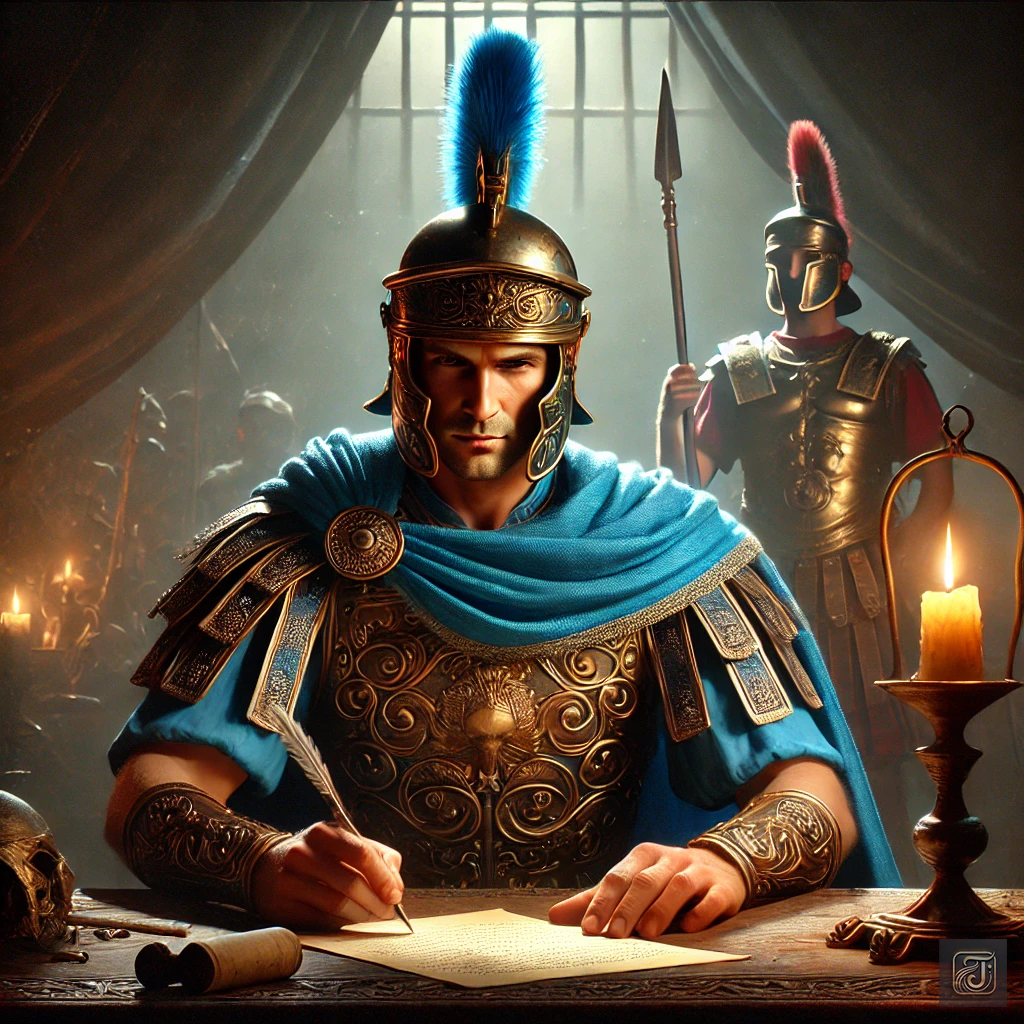
In 30 BCE, during the siege of Alexandria, Octavian penned a letter to Cleopatra.
Octavian:
“To break her, brute force is not enough.”
“Psychological pressure is the key.”
Officer:
“Is there any real chance she will surrender?”
Octavian:
“If she refuses, we become the righteous defenders of Rome’s cause.”
“If she accepts, all the better.”
“Either way, victory is mine.”

As he spoke, Octavian felt a faint tremor in the hand that sealed the letter.
Octavian:
“Cleopatra is the enemy… But what if she could be mine?”
For a fleeting moment, doubt crossed his mind.
Was there a way not just to eliminate her, but to claim her for himself?
Yet, as he gazed out at the legions beyond the window, he steeled himself.

Octavian:
“Banish such thoughts.”
“She is Rome’s enemy.”
“Never forget that.”
“It is my duty to protect Rome.”
“Even if that means burying Cleopatra, the beautiful queen.”

As the Roman army tightened its siege on Alexandria, Cleopatra spent her days in the palace, each moment weighed down by tension and uncertainty.
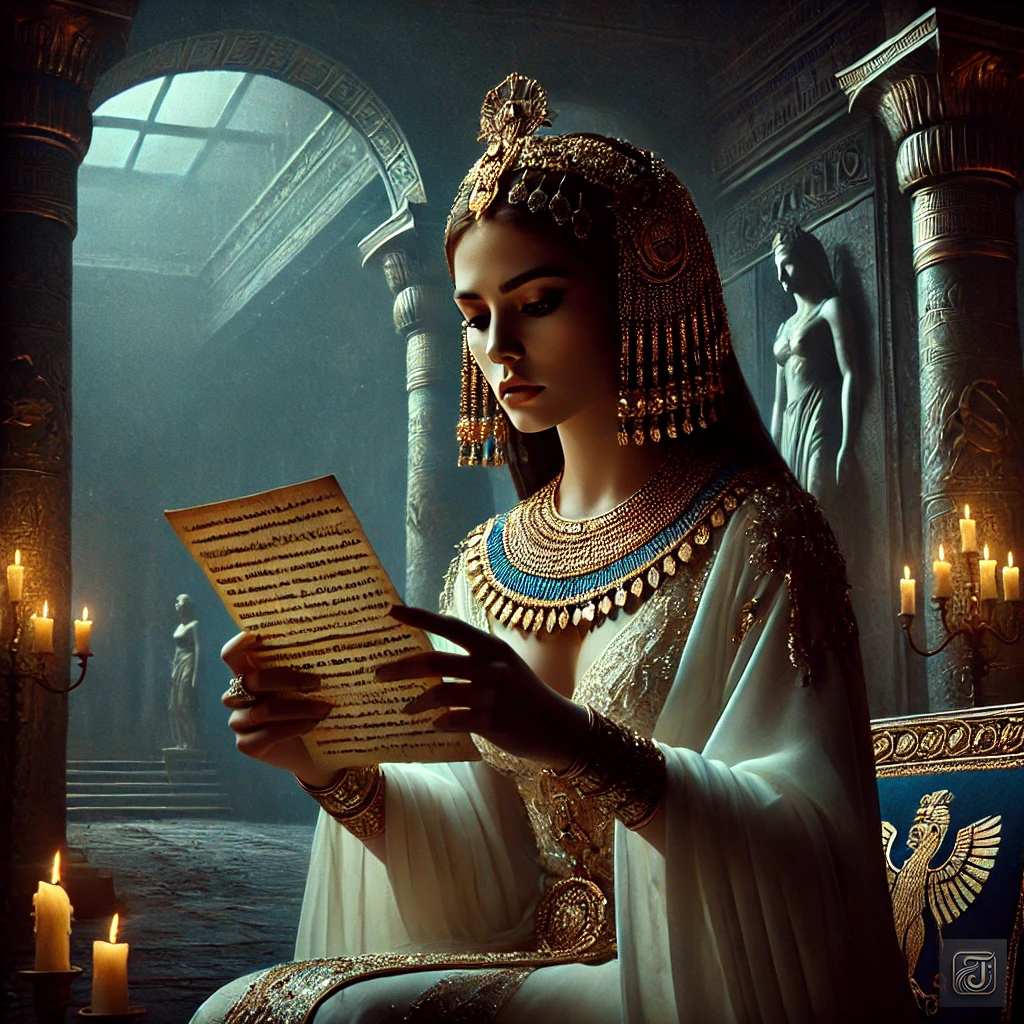
One day, a letter arrived for her.
It was from Octavian.
Octavian:
“To Her Majesty, Queen Cleopatra,
Betray Antonius and align yourself with my forces.”
“In return, I will guarantee your safety and the survival of Egypt.”

Calixa:
“Your Majesty, this could be a trap.”
“There is no guarantee that Octavian will truly spare your life or preserve Egypt.”
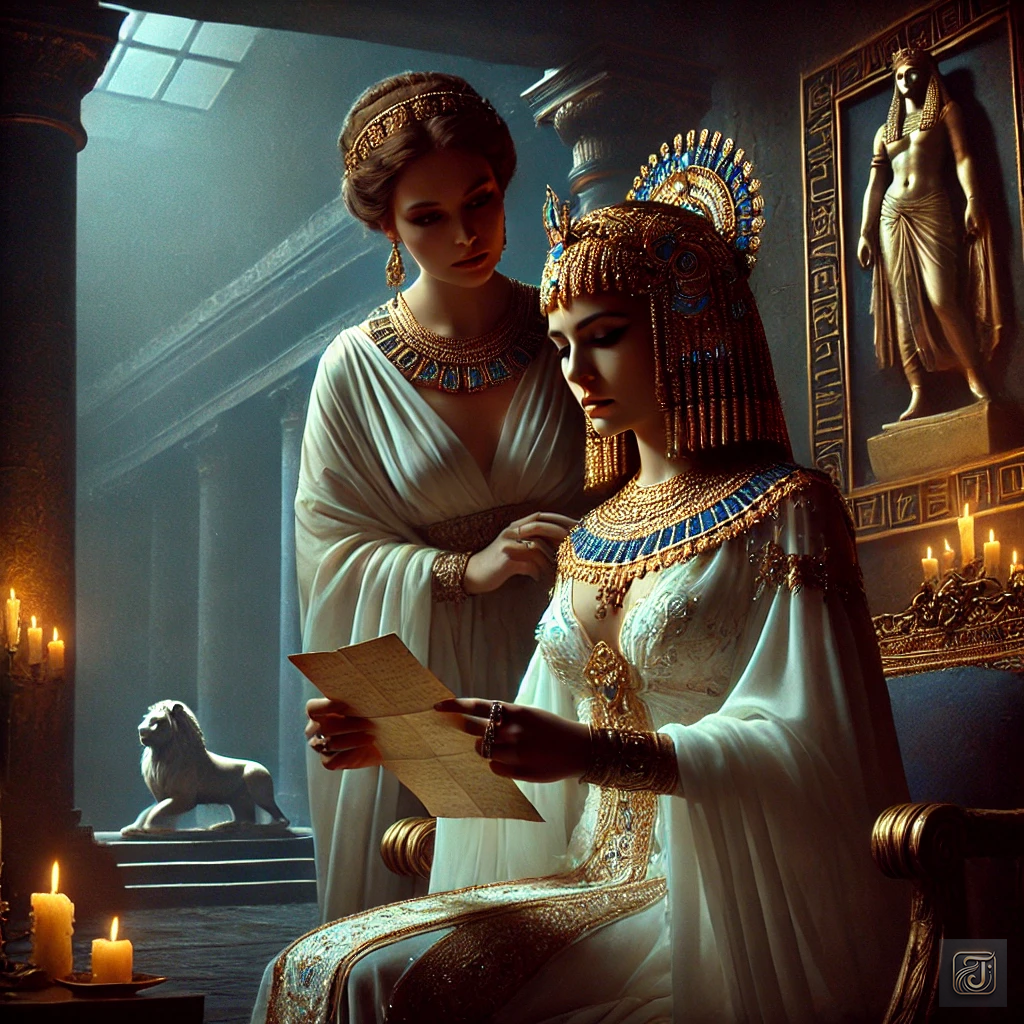
Cleopatra VII:
“I know.”
“This proposal is nothing more than a ploy—to separate Antonius from me and secure Rome’s dominance.”
“But if I refuse, both Egypt and my life will be in even greater danger.”
In the end, Cleopatra rejected Octavian’s offer.
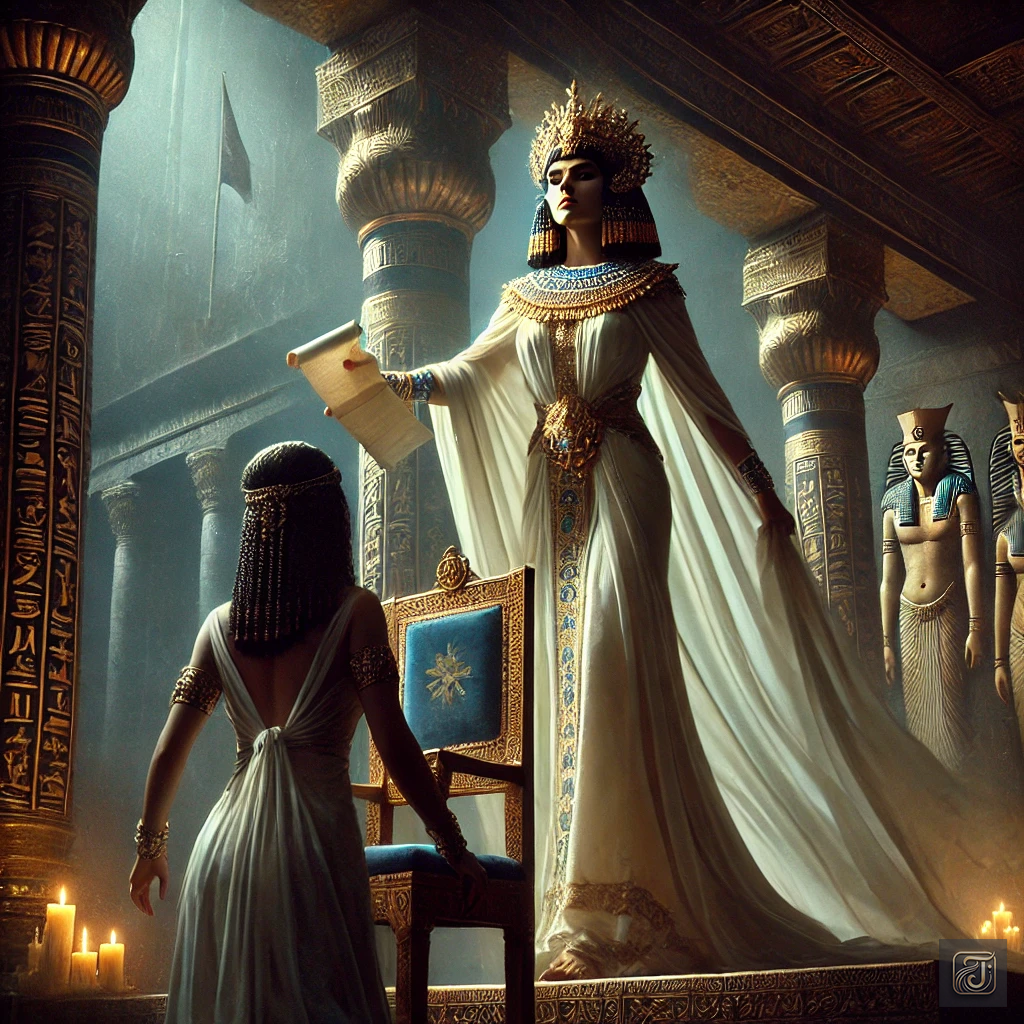
Cleopatra VII:
“I will fight for Egypt until the very end—no matter what fate awaits me.”
The next morning, Cleopatra composed her reply to Octavian.

Cleopatra VII:
“To Octavian, Commander of the Roman Army”
“Antonius is mine.”
“I will never surrender him to anyone.”
This response was a declaration of her pride and unwavering loyalty—one that would ultimately seal her fate.
Chapter 24: The Flames of Rupture
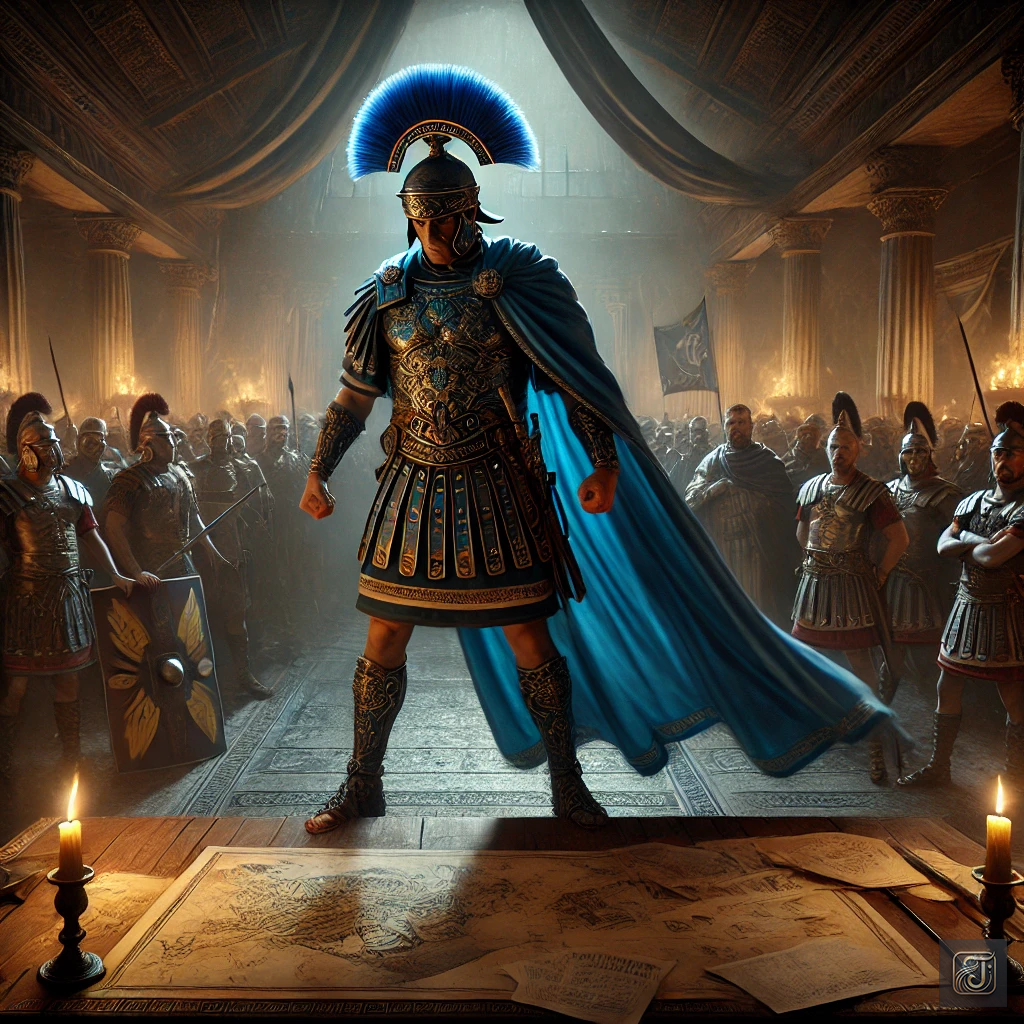
Cleopatra’s rejection of Octavian’s offer for negotiation only served to further enrage the Roman forces.
Furious, Octavian summoned his commanders, his anger unmistakable as he addressed them.
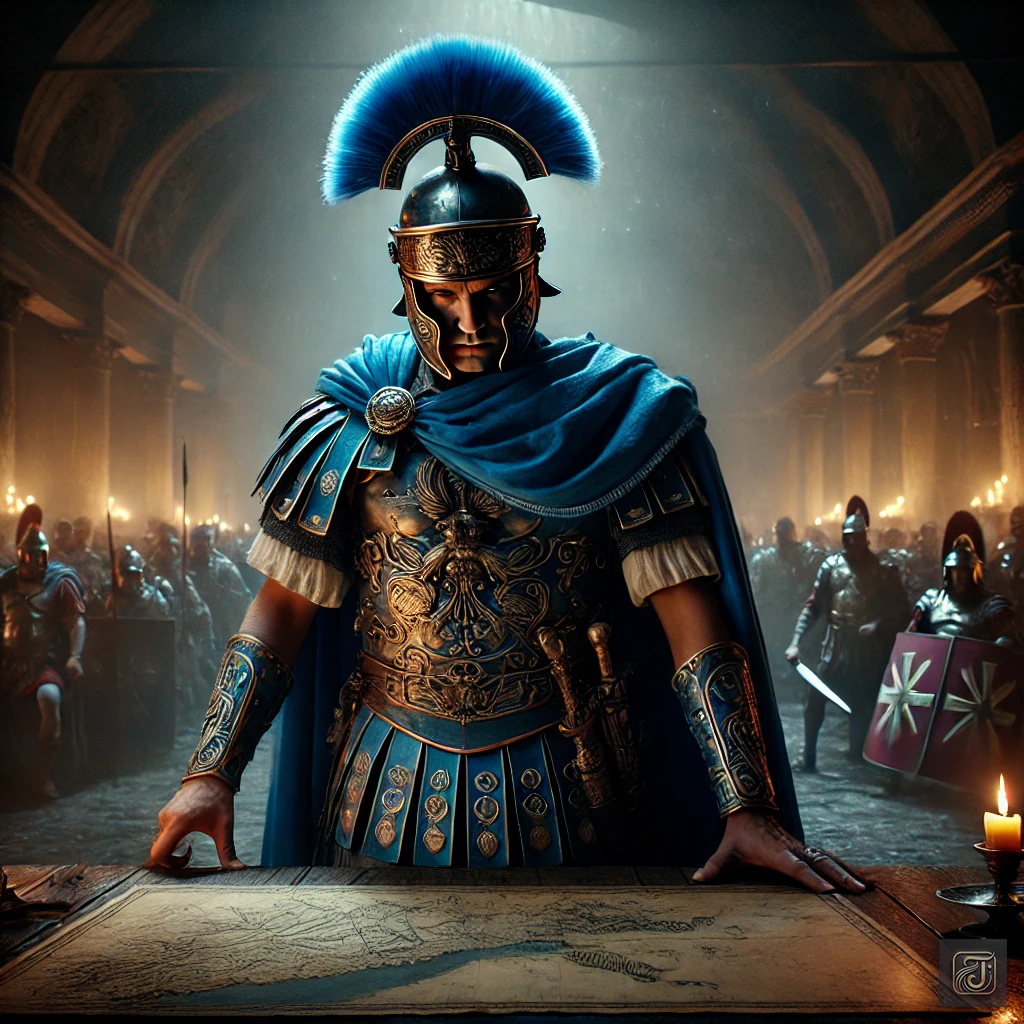
Octavian:
“Cleopatra has not only refused to submit to me—she has outright rejected me.”
“I will make her realize just how foolish that choice was.”
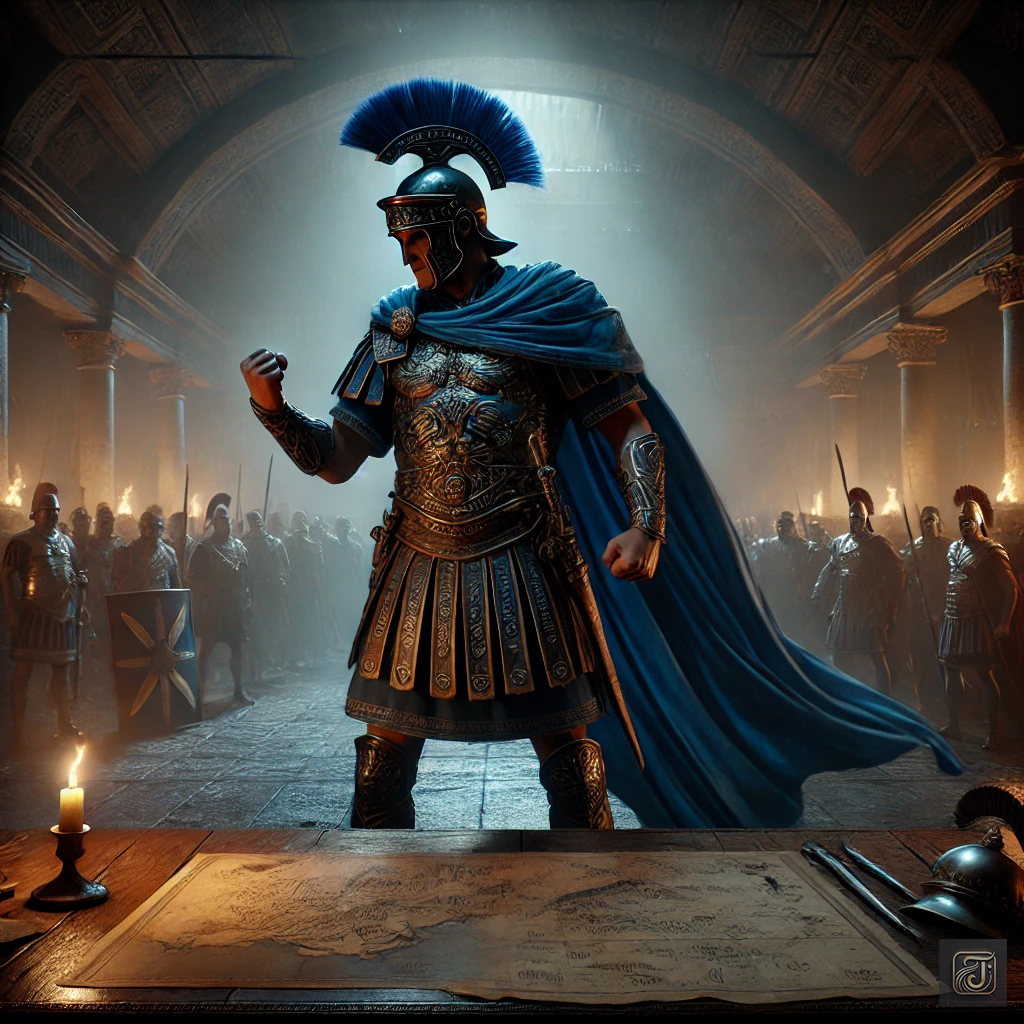
Octavian:
“She will never be mine.”
“She chose Antonius—and in doing so, she insulted me.”
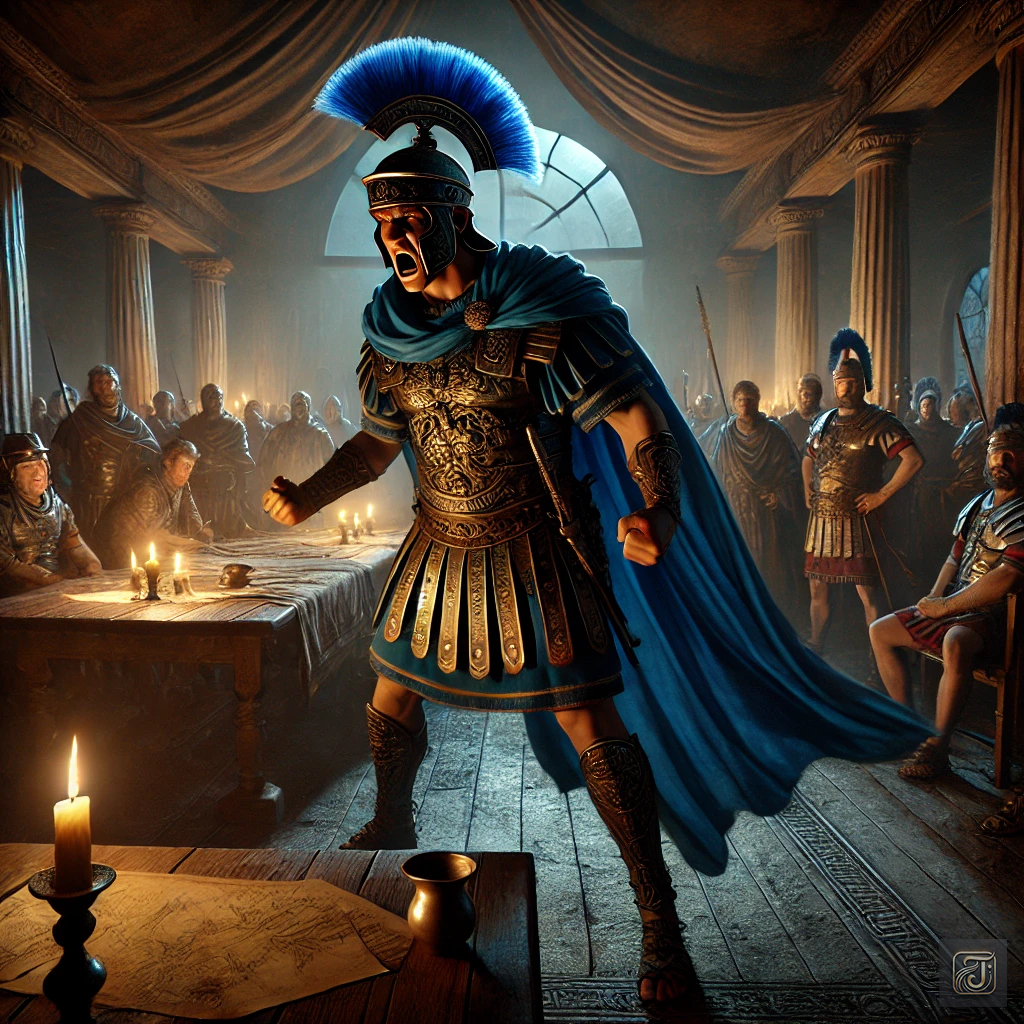
Octavian:
“Her defiance is nothing more than a failure to grasp our true strength.”
“We will show her the power of Rome and claim Egypt as our own.”
With those words, Octavian issued the command for a full-scale advance, preparing to encircle Alexandria completely.
His forces moved by both land and sea, cutting off Egypt’s army and isolating the city.

Meanwhile, within the palace of Alexandria, Antonius hurriedly reorganized his troops.
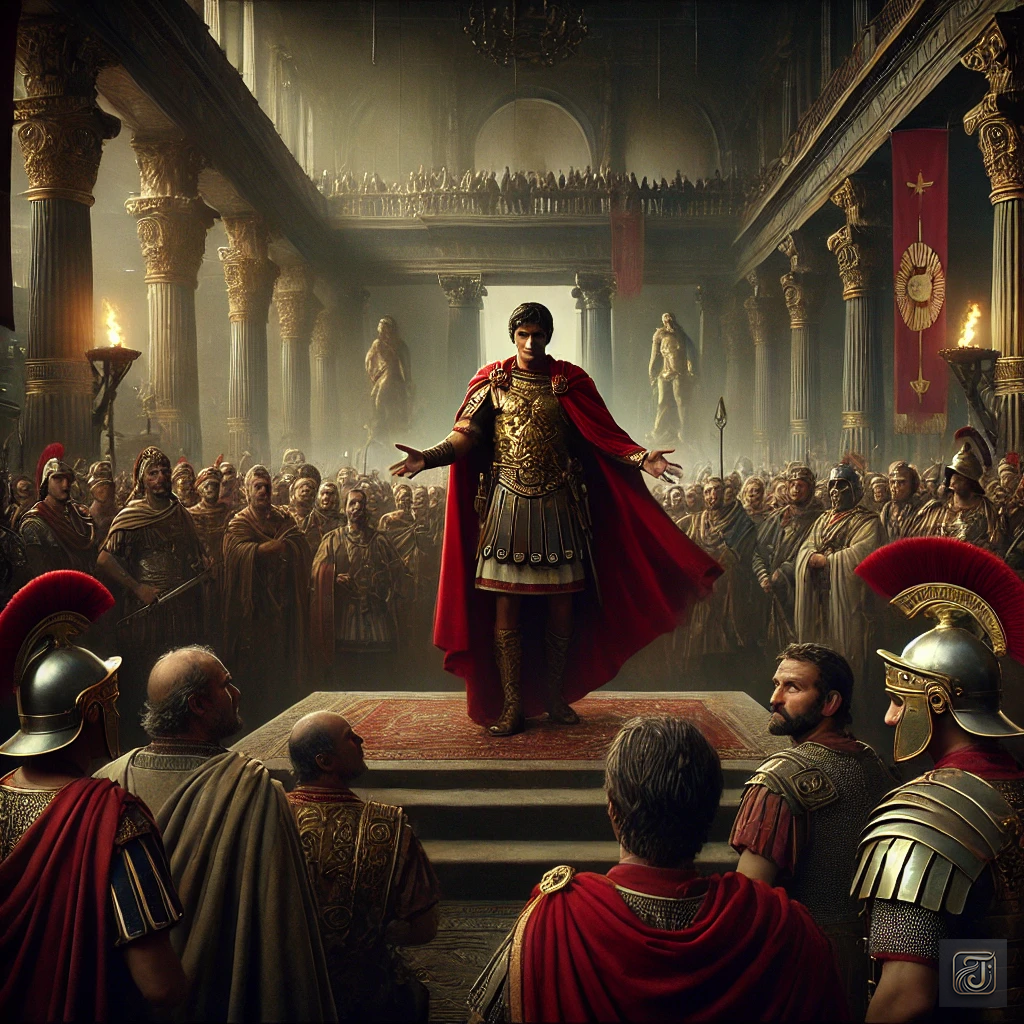
Gathering his commanders, he spoke with unwavering determination.

Antonius:
“This is not just a war.”
“This is a battle to protect the future of the people who live here—the very soul of Egypt.”
“Yes, Rome is powerful.”
“But if we retreat now, there will be no future for Egypt.”
“If we lose here, everything will be over.”
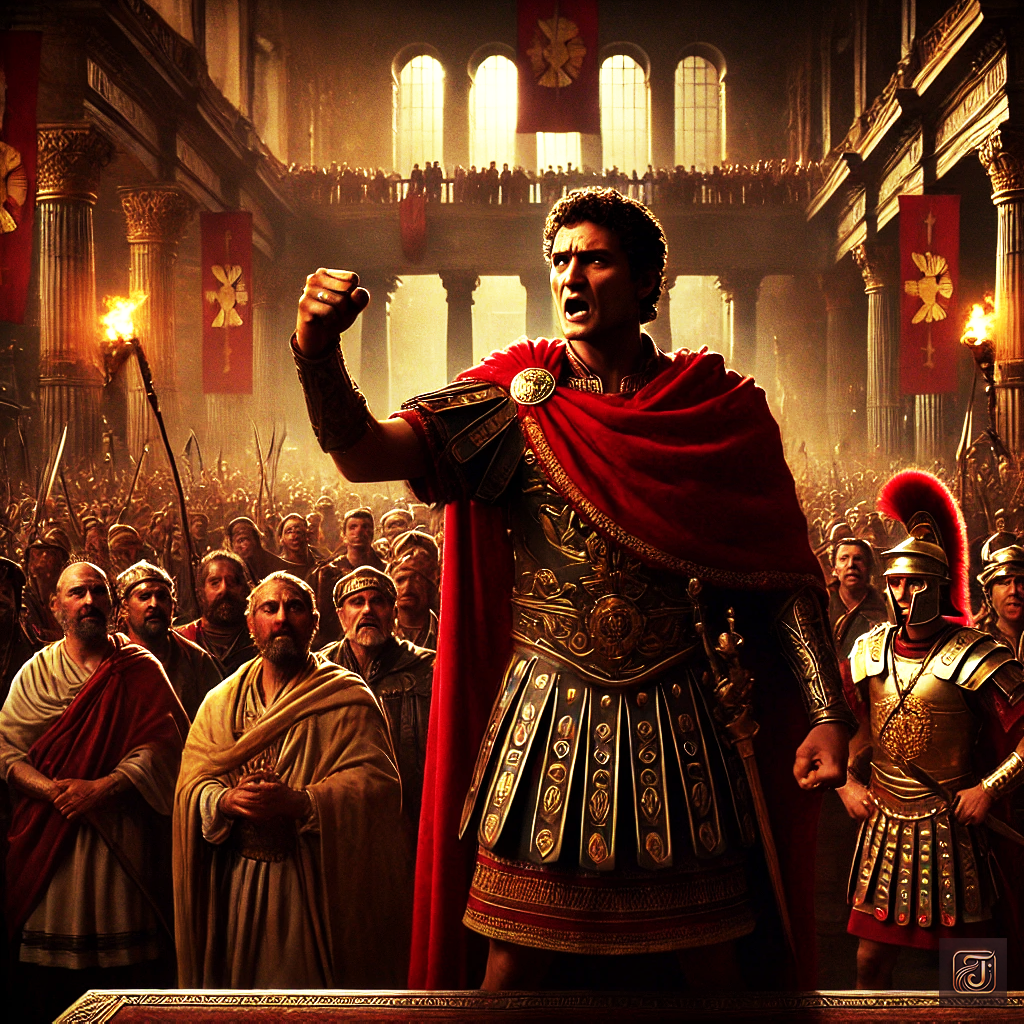
Antonius:
“We will win!”
“People of Egypt, this is our final battle for the survival of our homeland!”
Antonius’ words struck deep into the hearts of his soldiers, reigniting their spirit and determination to fight.
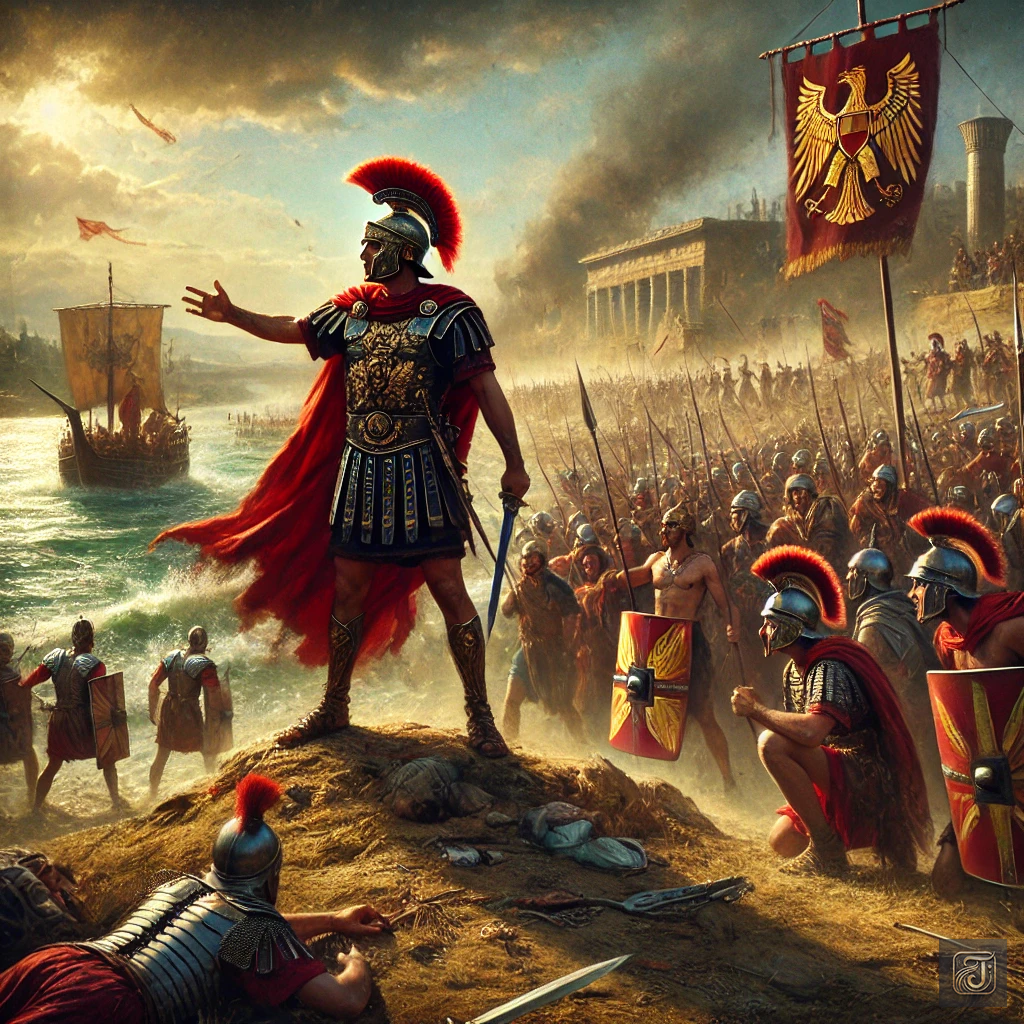
The Battle Begins
In 30 BCE, the decisive clash between the Roman army and the Egyptian coalition forces erupted near Alexandria.
Antonius established defensive lines along the Nile, leveraging the terrain to his advantage in a tactical stand against the Roman invasion.
As he moved through the ranks, he inspired his soldiers, issuing precise strategic commands to fortify their positions.
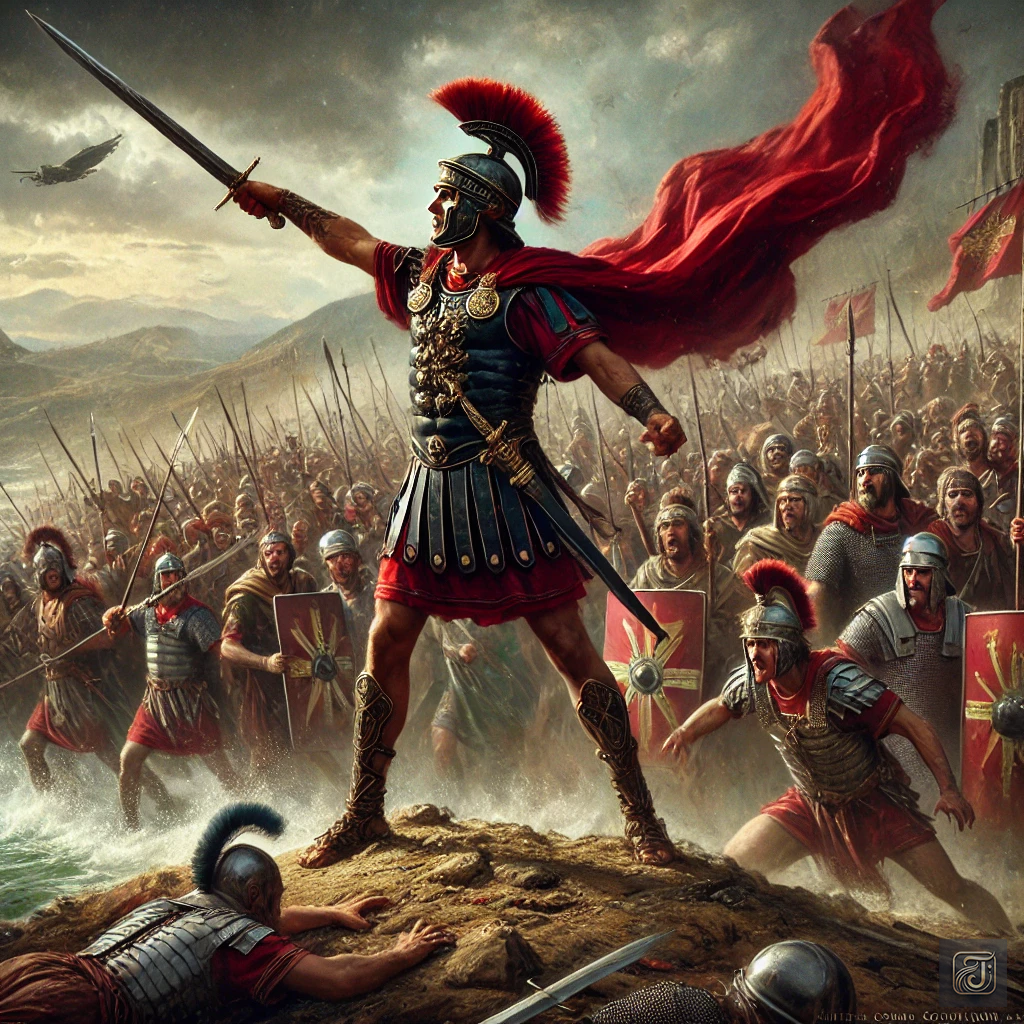
Antonius:
“Use the river as our shield!”
“Do not let the enemy set foot on this land!”
However, the sheer might and discipline of the Roman army gradually pushed the Egyptian forces into a corner.
Octavian, ever composed, observed the battlefield with keen precision, directing calculated strikes to weaken the Egyptian defenses step by step.
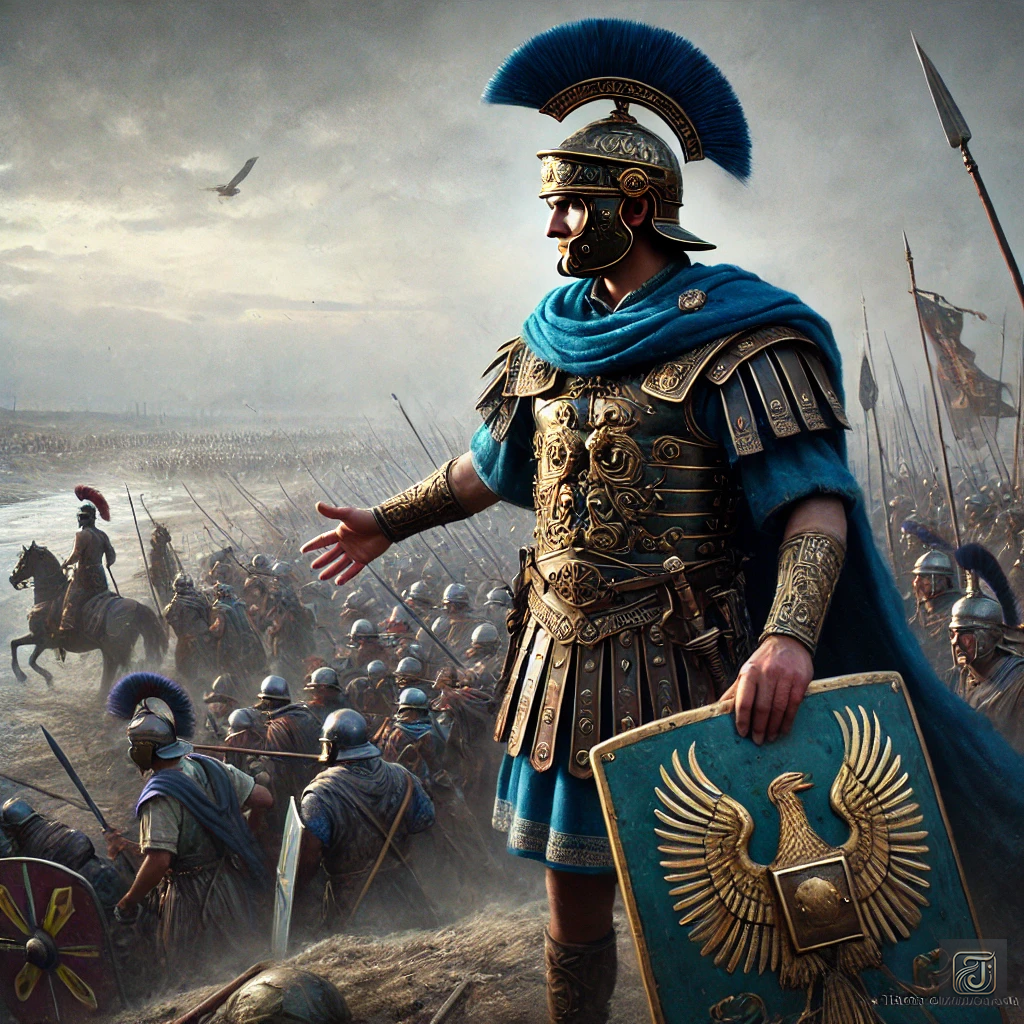
Octavian:
“Tighten the noose. Drive them toward the Nile—leave them no escape.”
As the brutal battle raged on, the morale of the Egyptian forces began to waver.
Antonius fought relentlessly, but against the overwhelming firepower and discipline of the Roman legions, he found himself steadily being pushed back.
Chapter 25: Cleopatra’s Decision

Meanwhile, Cleopatra learned that Antonius had returned to Egypt, and she longed to see him.
However, her palace was already surrounded by Octavian’s forces, leaving her with little to no means of contact with the outside world.

Cleopatra VII:
“I must break through the siege—no matter what it takes.”
“I have to reach Antonius.”
Cleopatra turned to her handmaiden, Calixa, and revealed a daring plan.

Cleopatra VII:
“Spread the news that I have taken my own life.”
“If I am dead, Octavian’s army will have no reason to continue this siege.”
“Deception is the only way to break this deadlock.”
“Once the rumor spreads, cracks will form in the siege.”
“I will use that opening to escape.”

Calixa:
“If this is the path you have chosen, my queen, then I will stand by you until the end.”
Cleopatra paused for a brief moment, then gave a quiet nod.
Her handmaidens exchanged looks of shock and unease, but sensing the unwavering resolve in their queen’s eyes, they set to work, preparing to carry out the daring deception.

Calixa:
“Your Majesty, please… stay safe.”
Cleopatra VII:
“Thank you, Calixa.”
“I am going to see Antonius now.”
Chapter 26: The Tragedy Born from False News

The false news of Cleopatra’s death not only unsettled Octavian’s forces but also reached the ears of Antonius.
The moment he heard it, he was overcome with utter despair.
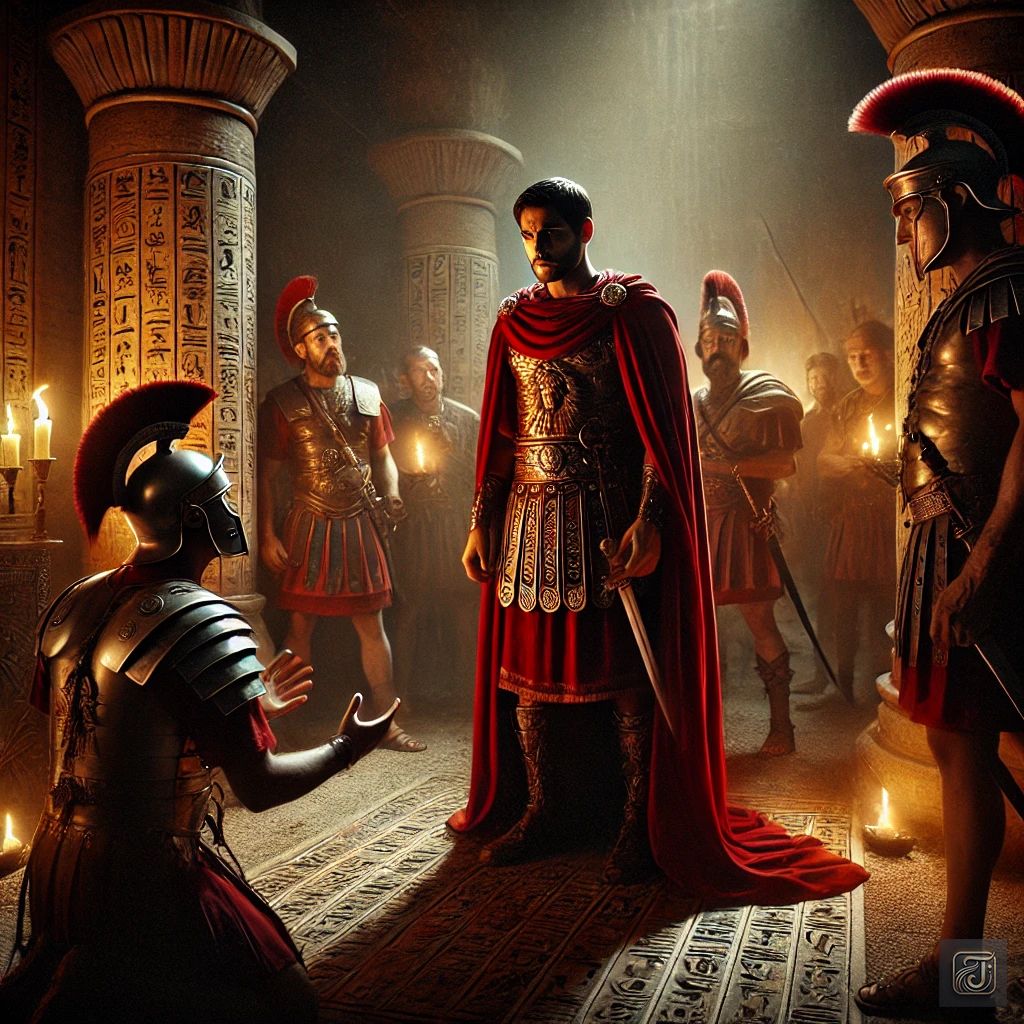
Antonius:
“Cleopatra… is dead?”
Standing motionless in the room, Antonius’ eyes reflected sheer despair.
To him, Cleopatra’s death meant the loss of everything—his love, his purpose, his very reason for fighting.
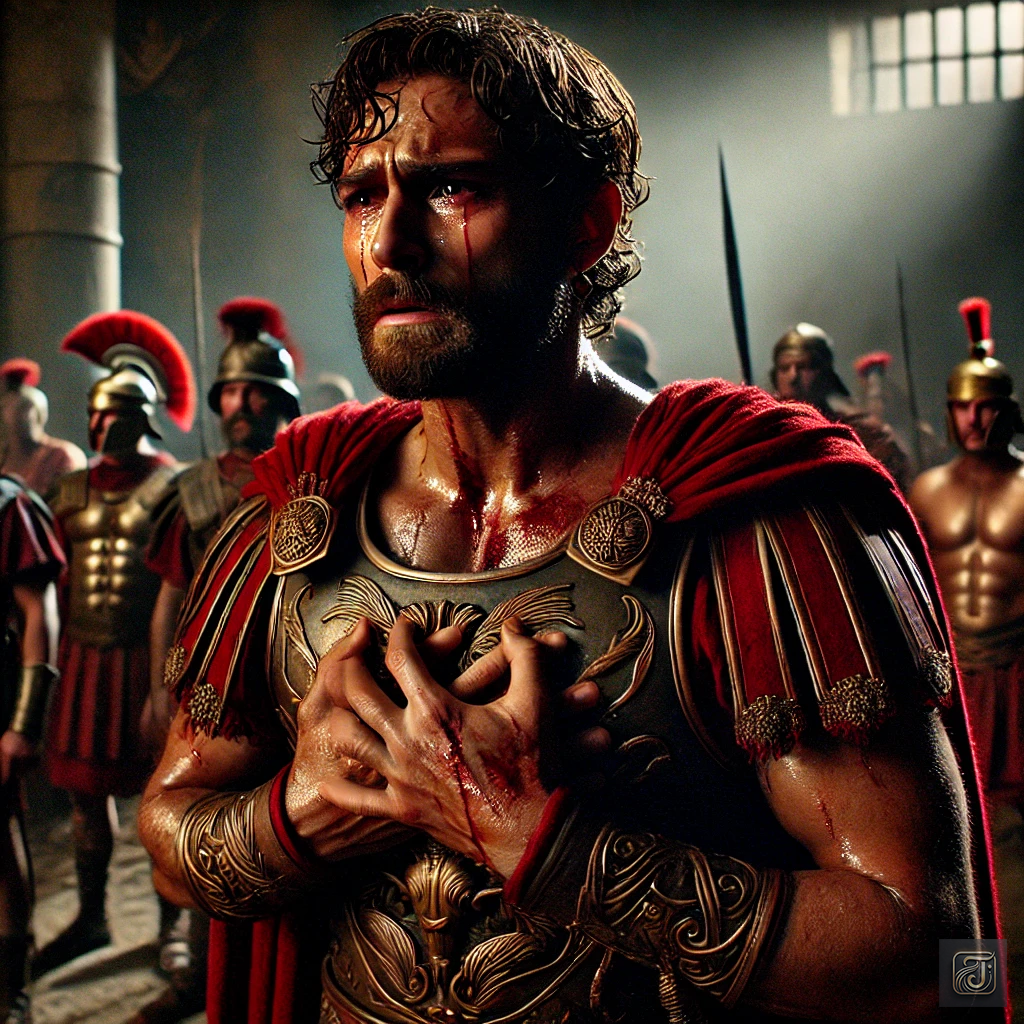
Antonius:
“I see… Egypt’s survival was her dream.”
“But she must have realized that survival was no longer possible…”
“Rather than live as Octavian’s prisoner, she chose to die as the Queen of Egypt.”
“And it’s all my fault.”
“The one who failed to make that dream a reality… is no one but me.”
Tears welled in his eyes as a crushing pain tightened around his chest.
He took a deep breath, then, in a quiet yet resolute voice, spoke to his men.
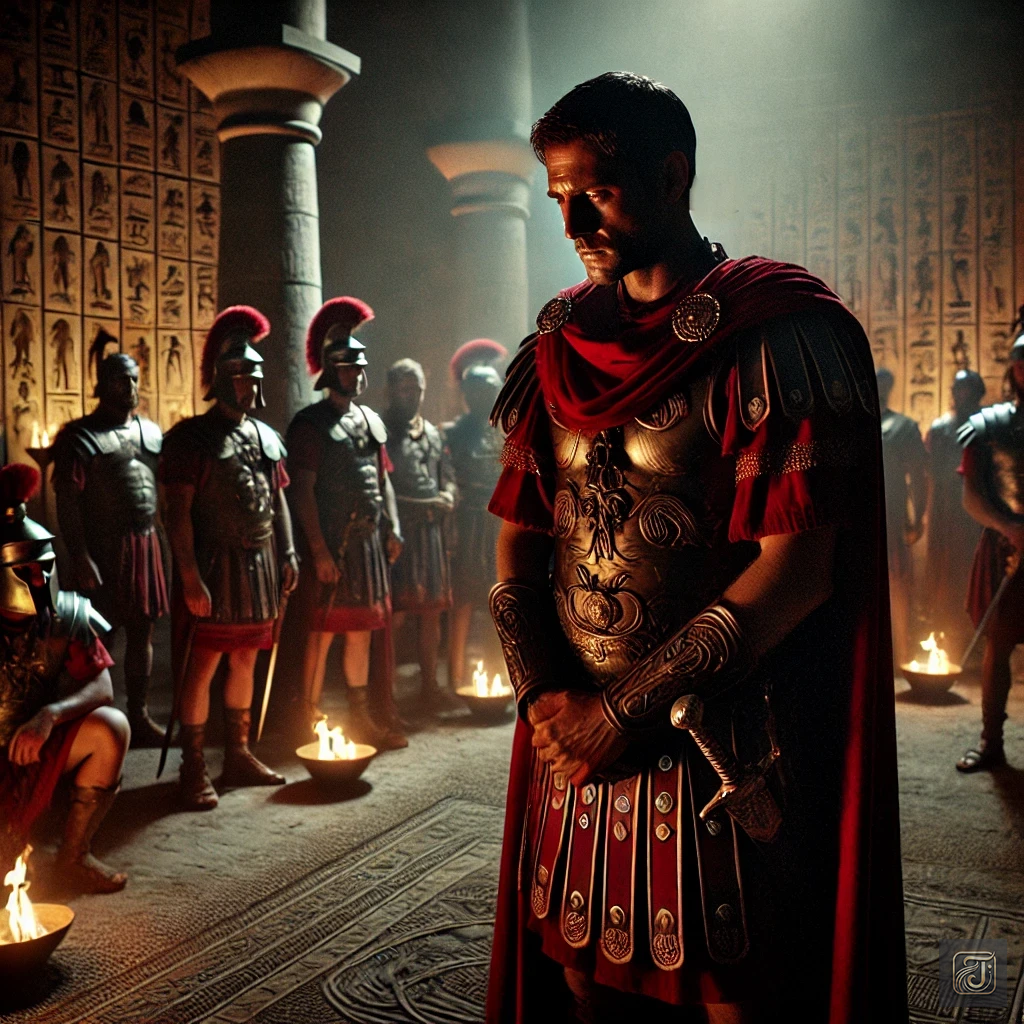
Antonius:
“Our defeat was already inevitable.”
“And yet, I kept fighting—for her.”
“But now, she is gone.”
“There is no longer any reason for me to continue this war.”
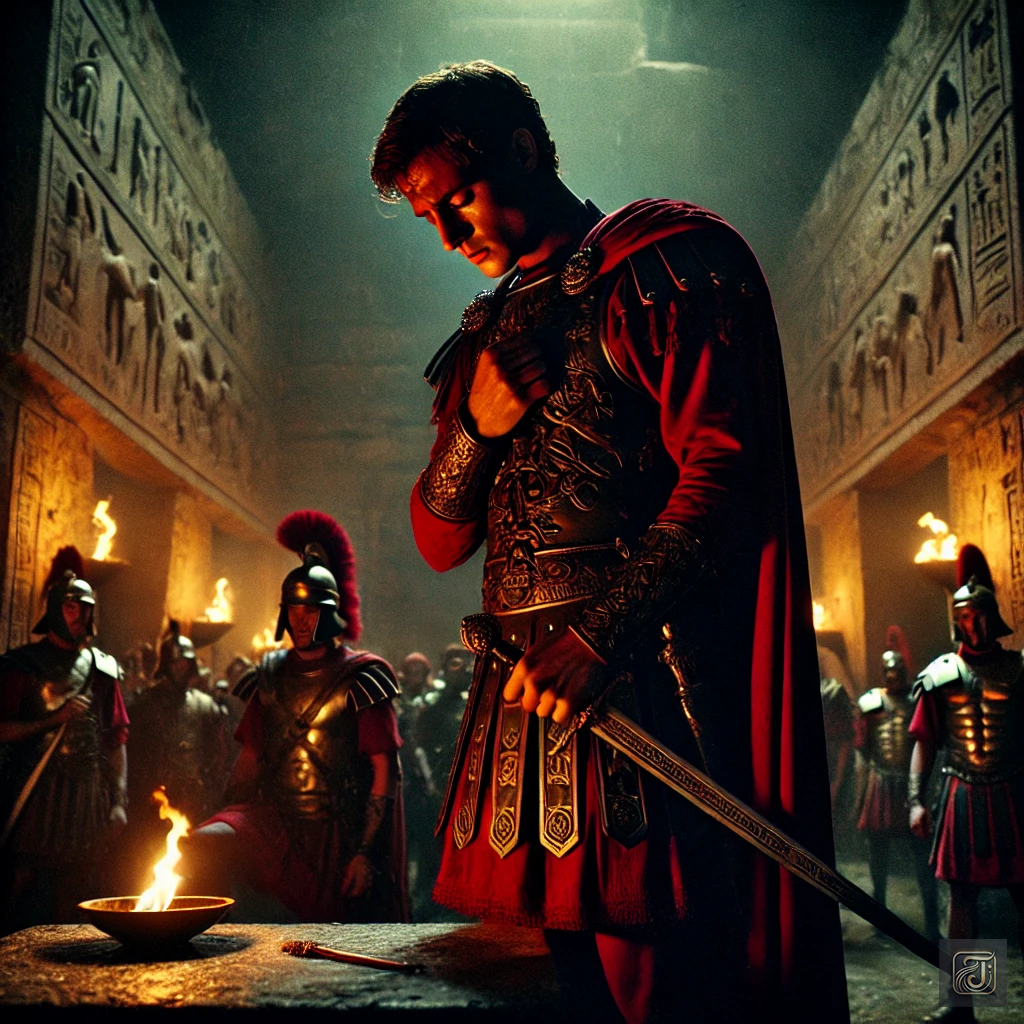
He took his sword in hand and made his final decision.
Antonius:
“In a world without her, I have no reason to live.”
“I will join you soon, Cleopatra… Don’t worry.”
“I will never let you go alone.”
With those words, Antonius plunged the sword into his own chest.
Yet, the wound was not immediately fatal.
Gasping in pain, he collapsed to the ground, gravely injured but still clinging to life.
Chapter 27: Cleopatra’s Escape

Meanwhile, Cleopatra had successfully escaped the siege as planned and was making her way to Antonius.
Antonius:
“Antonius… you are still fighting to protect me, aren’t you?”
“Thank you, Antonius.”
“I am coming to you now.”
“Just hold on a little longer.”
As she arrived at Antonius’ encampment, Cleopatra was met with the sight of his men in a state of frantic disarray.
The sight of Cleopatra—whom they believed to be dead—shocked Antonius’ men.
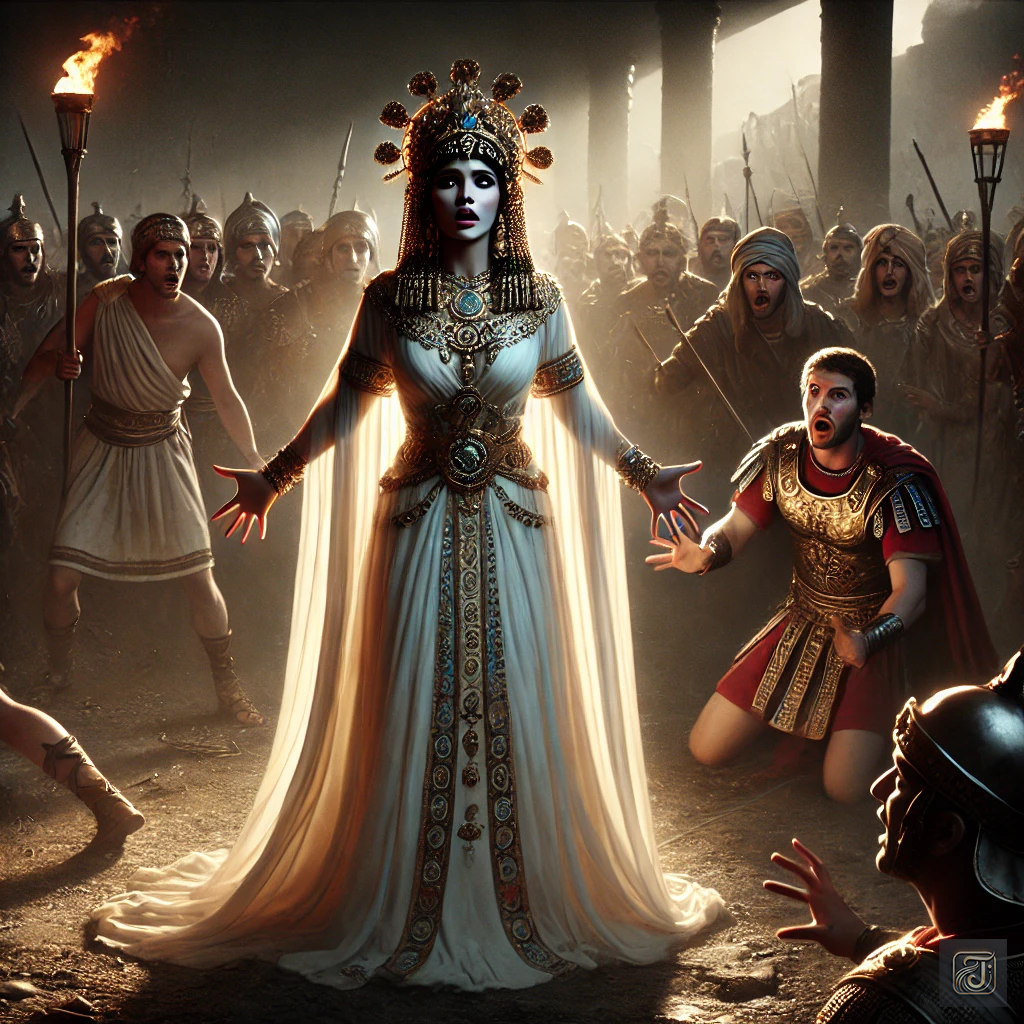
Cleopatra VII:
“What has happened here?”
Soldiers:
“Queen Cleopatra!?”
“How can this be?”
“We were told you had taken your own life!”
Cleopatra VII:
“That was false news—I spread it to escape the siege and come here!”
Soldiers:
“No…! Lord Antonius was told you were dead… and he took his own life moments ago!”

Cleopatra VII:
“He… did that?”
Cleopatra’s breath caught in her throat, but there was no time for despair.
She hurried toward Antonius, hoping she was not too late.
Chapter 28: The Final Reunion

Moments later, a handmaiden rushed into the room where the gravely wounded Antonius lay, breathless with urgency.
Handmaiden:
“My lord! The queen—she is alive!”
Antonius:
“What…? She… lives?”
“Take me to her… That is my final wish.”
His loyal men carefully carried him, ensuring he would see Cleopatra one last time.
At long last, they were reunited.
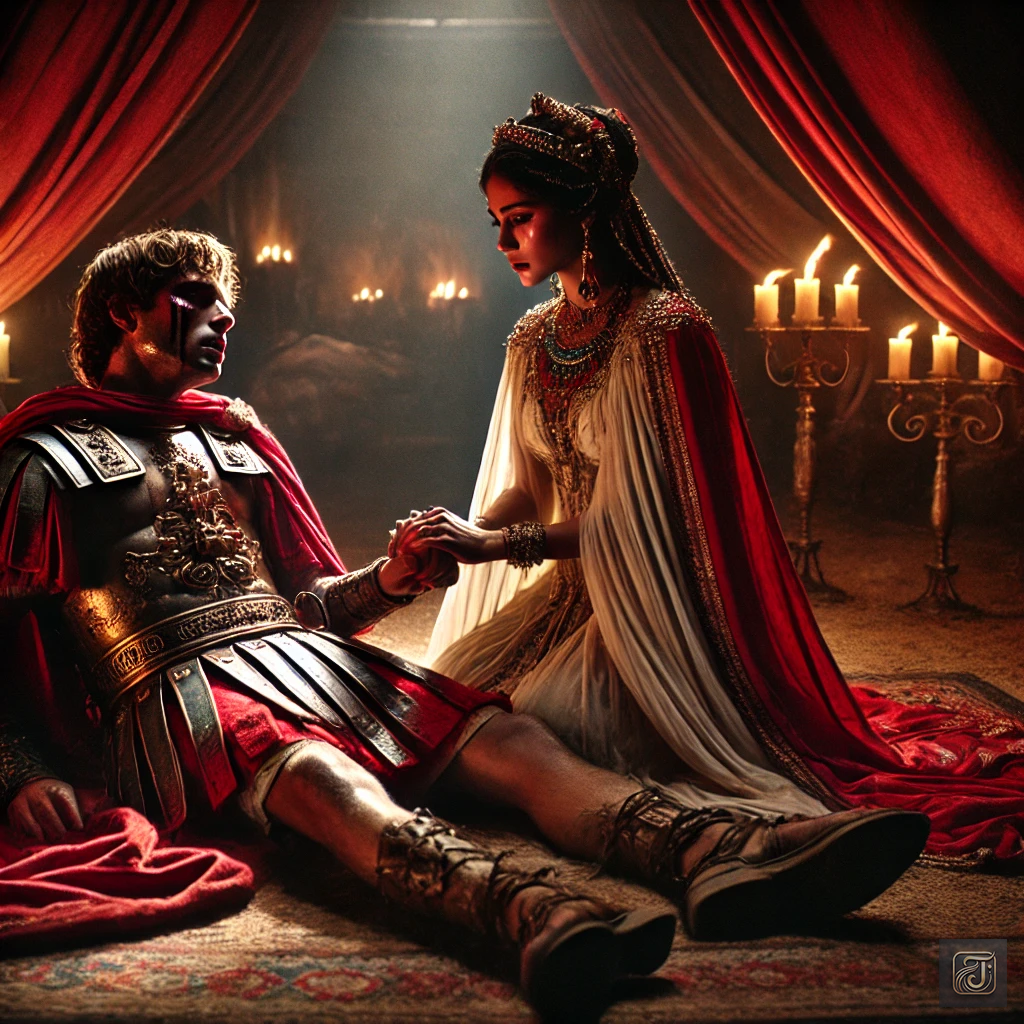
Cleopatra took his hand, tears streaming down her face as she gazed at him.
Cleopatra VII:
“Antonius… why would you do this…?”
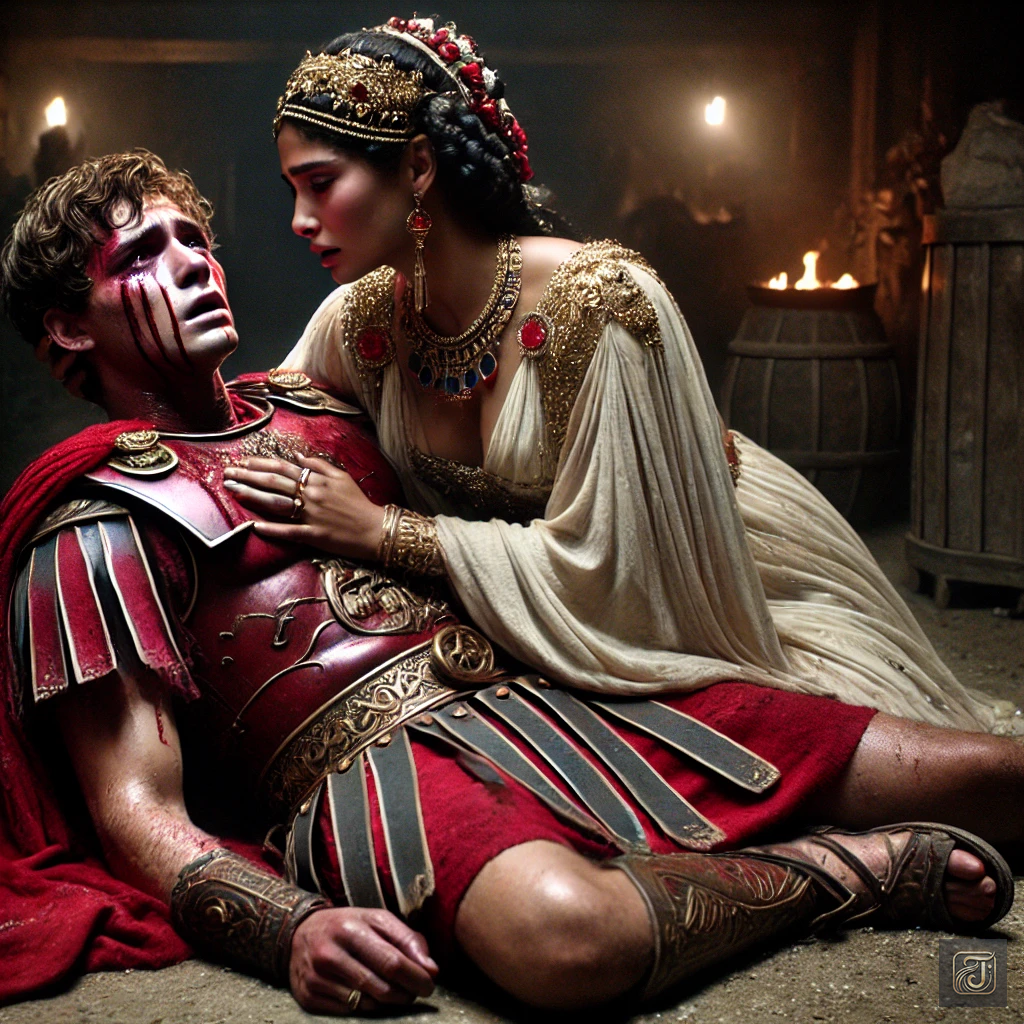
Antonius:
“I was told you had died… A life without you has no meaning. So I…”
Cleopatra VII:
“Antonius… I’m here.”
“I’m right here.”
She stayed by his side, never letting go, as he clung to his final moments in her embrace.
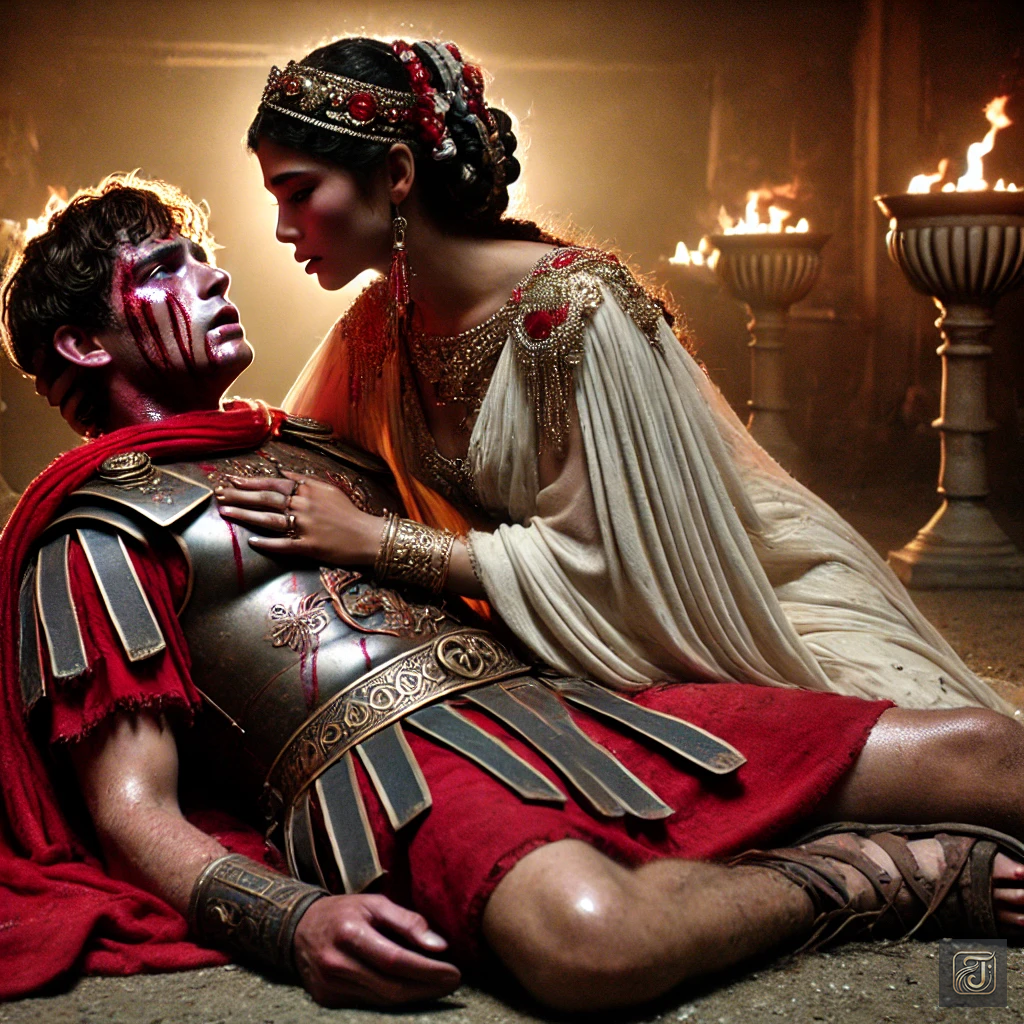
Antonius:
“But in the end… I’m glad I could see you one last time…”
With those final words, Antonius took his last breath in Cleopatra’s arms.
A peaceful expression settled upon his face, as if he had finally found solace.
Antonius’ death left Cleopatra in profound sorrow.
Yet, she did not waver.
Accepting her fate, she turned her thoughts to Egypt’s future—preparing herself for the final decision that lay ahead.
Chapter 29: Despair

Cleopatra was consumed by despair—she had lost Antonius, and every means of protecting Egypt had been exhausted.

Cleopatra VII:
“There is no way left to save Egypt.”
“If Egypt is to fall under Roman rule, then my life has no meaning anymore.”
“It is unfortunate… but my hopes are completely shattered.”
“This is the end.”
After Antonius’ death, Cleopatra lost all confidence in her ability to protect Egypt alone.
For her, Antonius’ death was more than the loss of a lover—it was the death of Egypt’s hope and future.
Amidst her despair, she learned of Octavian’s plan—to take her to Rome as a captive and parade her in a triumph, humiliating her before the Roman people.
To Cleopatra, the idea of being displayed as a mere prisoner, stripped of her dignity, was an unbearable disgrace.
She attempted to negotiate with Octavian multiple times, seeking any path to retain her autonomy.
But every effort was in vain.
No matter what she proposed, it became clear—Octavian saw her only as a tool to be used, nothing more.
Chapter 30: The Final Choice

In a secluded chamber of the palace, Cleopatra gazed silently at a basket containing a venomous asp.
Memories flickered through her mind—moments of triumph, love, and loss—each one leading her to this final decision.

Cleopatra VII:
“I was born into this world as the Queen of Egypt.”
“And with that same pride, I must meet my end.”
Beyond the window, the Nile flowed gently, its waters carrying whispers of a time long past.
As she listened to its soothing murmur, memories of her childhood surfaced—distant yet vivid, a reminder of the land she had sworn to protect.

Cleopatra VII:
“Father, I will protect Egypt—no matter what hardships may come.”
She recalled the day when, as a young girl, she stood by the Nile and made that vow to her father, Ptolemy XII.
The blessings of the Nile, the love she held for this land—this was where everything had begun.
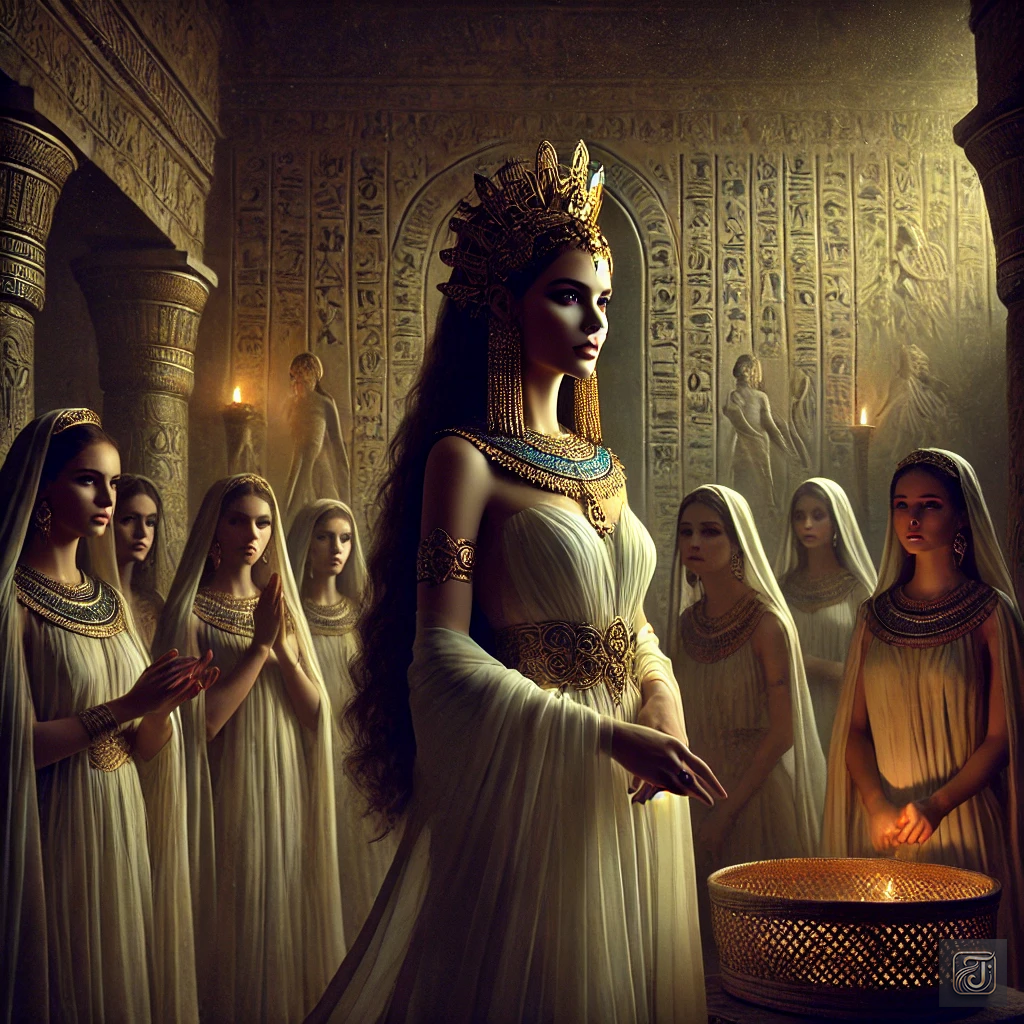
Cleopatra VII:
“Egypt is the gift of the Nile.”
“And I was born to protect that gift.”
With unwavering resolve, she summoned her handmaidens and gave them a quiet, final command.

Cleopatra VII:
“Prepare the asp.”
“I will never become a slave of Rome.”
Handmaiden Calixa, with tears streaming down her face, pleaded desperately.

Calixa:
“Your Majesty, please reconsider!”
“There may still be another way!”
Calixa’s voice trembled with desperation, her eyes filled with sorrow.
However, Cleopatra simply gave a gentle smile and wiped away Calixa’s tears.

Cleopatra VII:
“Calixa, my mind is made up.”
“I will never belong to Octavian.”
“I cannot belong to anyone—I am the Queen of Egypt.”

Calixa:
“But still, I want you to live!”
“As long as you are alive, there is always hope for the future!”

Cleopatra VII:
“Calixa, then grant me my final wish. “
“Live.”
“Watch over this land in my place.”
“No matter what becomes of Egypt, someone must remain to tell its story.”
“So live—instead of me.”
At those words, Calixa collapsed in tears, unable to contain her sorrow.
The other handmaidens, their eyes brimming with grief, silently presented Cleopatra with a small basket of figs—concealing within it the venomous asp that would seal her fate.
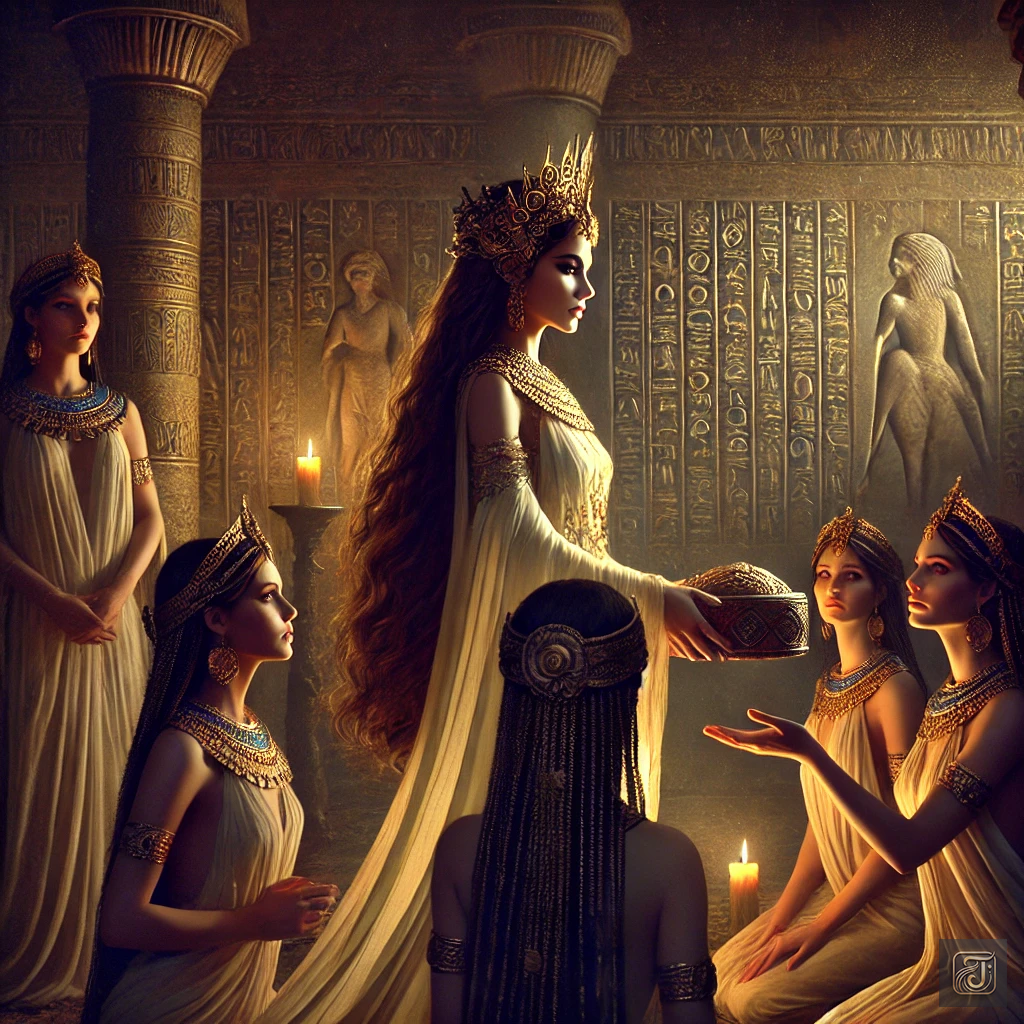
Handmaidens:
“Your Majesty… is this truly what you want?”
Cleopatra VII:
“Yes. This is my decision.”
“If my only fate is to live as a slave of Rome, then I choose death.”

Cleopatra VII:
“This is my story, and only I have the right to decide how it ends.”
“I was born into this world as the Queen of Egypt.”
“And to protect that pride, I will die as the Queen of Egypt.”
She reached for the asp, her fingers brushing against its cold, scaled body.
With her fate sealed, Cleopatra whispered her final words.

Cleopatra VII:
“Antonius, wait for me.”
“I am coming to you now.”

As the asp sank its fangs into her chest, a deep sense of peace washed over Cleopatra.
A serene smile graced her lips as she quietly closed her eyes.
In the distance, only the gentle murmur of the Nile could be heard, whispering its eternal song.
Cleopatra’s Negotiation Attempts
1. Preservation of Egypt’s Independence
Cleopatra’s top priority was to maintain Egypt as an independent kingdom.
She likely pleaded with Octavian to allow Egypt to remain sovereign and not be reduced to a Roman province.
2. Protection of Herself and Caesarion
Cleopatra sought assurances for her own safety and that of her son, Caesarion, the child she bore with Julius Caesar.
To her, Caesarion represented the future of Egypt, and his survival was paramount.
3. The Fate of Antonius
Octavian may have pressured Cleopatra to abandon Antonius in exchange for her own survival and Egypt’s continued existence.
His proposal likely implied that if she handed over Antonius, she and Egypt might be spared.
Octavian’s Intentions
1. A Quick End to the Conflict
If Cleopatra surrendered, Octavian could swiftly end the war against Antonius without prolonged battles.
Diplomatic submission would be more efficient for Rome than continued warfare.
2. Total Roman Control Over Egypt
Octavian’s ultimate goal was to absorb Egypt as a Roman province.
To achieve this, he needed Cleopatra to cooperate or be removed as a political obstacle.
3. Parading Cleopatra in His Roman Triumph
Octavian intended to capture Cleopatra and display her as a war trophy in his Roman triumph.
This would serve as a public demonstration of his victory and strengthen his image among the Roman people.
Outcome
Realizing that negotiations with Octavian would not secure her or Egypt’s future, Cleopatra made her final decision.
After Antonius’ death, she chose to end her own life rather than suffer the humiliation of being paraded through Rome.
Her suicide was an act of defiance—her last effort to protect her dignity and die as the Queen of Egypt rather than live as a prisoner of Rome.
Epilogue: The Eternal Queen
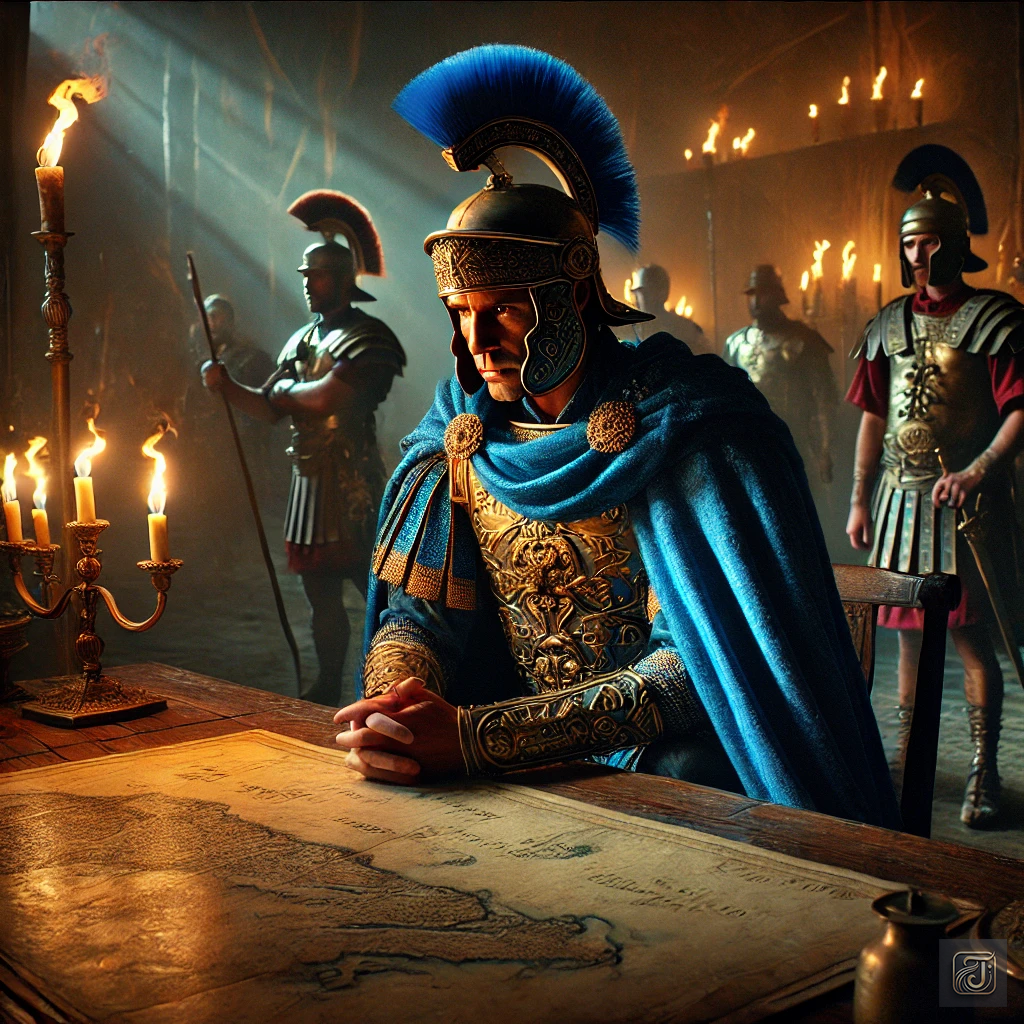
The news of Cleopatra’s death soon reached Octavian, leaving him deeply astonished.
Octavian:
“Until her final breath, she remained a queen.”
“Rather than live as my possession, she chose to die as the Queen of Egypt.”

Her death marked the end of the Ptolemaic dynasty—the last ruling house of Egypt.
With her passing, Egypt lost its final pharaoh, and Rome claimed its greatest prize.
Octavian swiftly annexed Egypt, making it a province of the Roman Empire.
Caesarion, the last heir to Egypt’s throne, was hunted down and executed—his fate sealed by Octavian’s desire to eliminate any threat to his rule.
The dream Cleopatra had nurtured since childhood—the dream of preserving Egypt’s sovereignty—vanished like mist.
Yet, Cleopatra’s legacy did not fade.
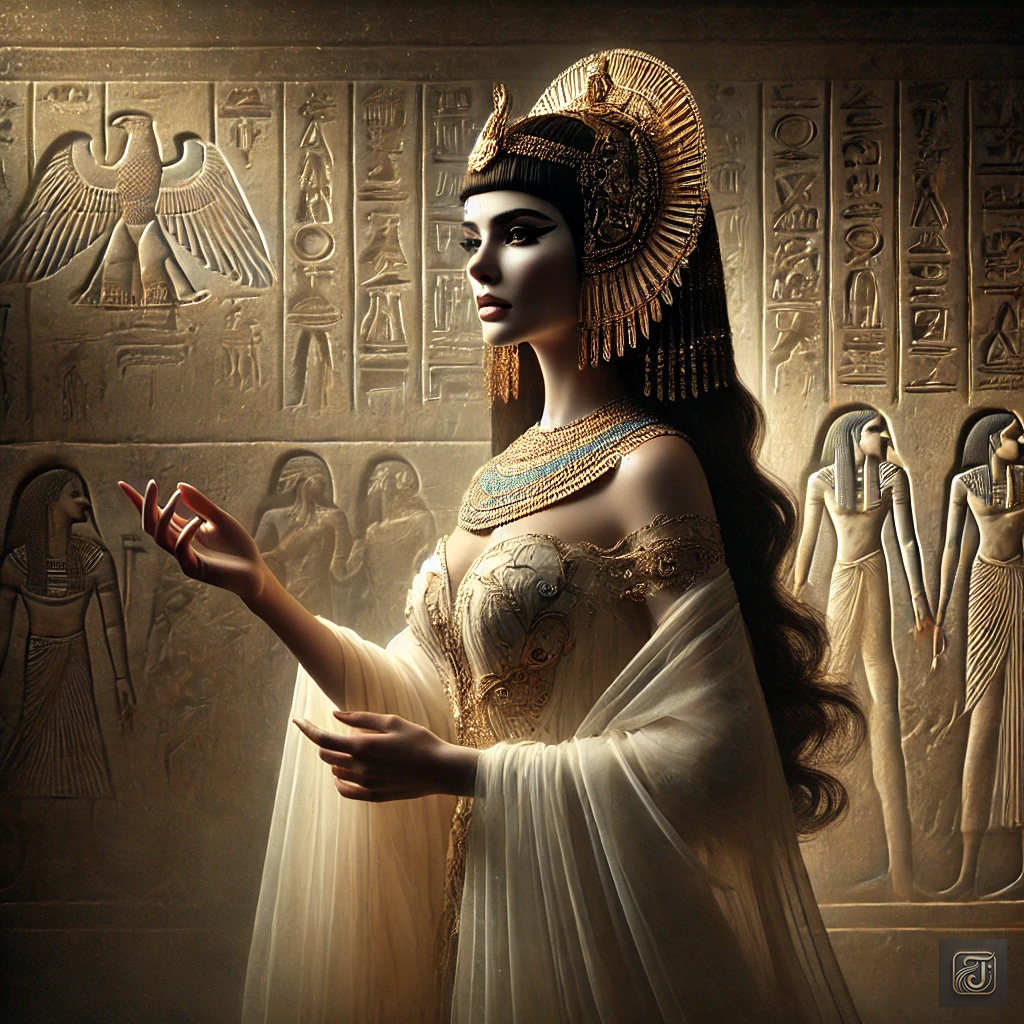
History would forever remember her not just as a queen, but as a woman who defied an empire, who lived and died on her own terms.
Her life speaks to all who hear her story:

Cleopatra VII:
“No matter how deep the despair, staying true to oneself—that is true strength.”
Author Fuji’s Afterword

History is not merely a sequence of events but a grand narrative woven with the passion and struggles of those who lived it.
In portraying the life of Cleopatra, I focused most on her “way of life as a queen.”
Above all else, she devoted herself to protecting Egypt, yet that dream was never fulfilled.
She was a “tragic queen” who fought tirelessly for her country but ultimately could not change the course of fate.
Her life was a relentless struggle to uphold her belief in preserving Egypt’s independence.
She fought to maintain its sovereignty, shed tears for those she loved, and in the end, chose to die to protect her dignity.
That choice was not a defeat but a testament to her unwavering resolve to live and die as the Queen of Egypt.
In this story, her loyal handmaiden, Kalyxa, is a fictional character I created.
There are no historical records confirming her existence, but it is not difficult to imagine that figures like her—attendants and confidants—were by Cleopatra’s side, supporting her through the tumult of her reign.
Through Kalyxa, I aimed to depict how deeply Cleopatra influenced those around her and how profoundly lonely her battle was.
Behind every great ruler, there are always those who stand by them.
By introducing Kalyxa’s perspective, I hoped to bring Cleopatra to life not just as a historical figure, but as a person of flesh and blood.
There are no “what ifs” in history, yet I cannot help but wonder:
What if Cleopatra and Antony had won the Battle of Actium?
What if Antony had never received the false news of Cleopatra’s death?
What if Octavian had accepted her demands?
What if Caesarion had survived?
… But perhaps, it is precisely because history unfolded as it did that Cleopatra’s story continues to be told for generations.
Through this work, I hope you have been able to glimpse how Cleopatra faced the tides of her time and what she fought to protect.
Thank you for reading.
— The storyteller Fuji
If you found this article helpful or enjoyable, please consider supporting me with a cup of coffee! 👈Click☕🙏
I’m a passionate blogger who loves diving deep into human history and sharing captivating stories about remarkable figures and events from the past. My blog combines engaging storytelling with beautiful illustrations, making history accessible and enjoyable for everyone.
Currently, I write my blog while managing a full-time job. Balancing both limits the time I can dedicate to research, writing, and illustrations. With your support on Ko-fi, I can reduce the time spent on my main job and focus more on blogging, allowing me to increase the frequency of updates and bring you even more captivating stories.
Whether it’s a one-time coffee or a regular contribution, every bit goes directly into making history engaging and fun for my readers.
Thank you for joining me on this journey through time. Let’s uncover the past together!
If you found this article insightful, please consider supporting me on a cup of coffee! 👈Click☕🙏

Author: Fuji
Human history is truly complex, isn’t it? There are countless websites introducing historical figures and events, but many of them are just plain explanations—not exactly exciting to read. On the other hand, reading books takes a lot of time and effort. That’s where I come in. Through “stories that are more engaging than explanations and shorter than books,” I aim to bring the world’s history and humanity’s records to you in a more accessible and interesting way. If my stories inspire you to love history a little more, I’d be absolutely thrilled!




コメント